#girls when they make connections and parallels and notice themes
Explore tagged Tumblr posts
Text



sending postcards from a plane crash / genius annotations description for the kintsugi kid / the kintsugi kid
#so like whatever and who cares and im gonna blow everything up fuck this!#girls when they make connections and parallels and notice themes </3#txt#lyrics.txt#fob#p: 100
418 notes
·
View notes
Text
The implication that Chameleon is being dismissed simply because she's a female is an insult to well written females (Tigress).
Let me tell you why she's a bad villain, and for that I'll tell you why people like the original villains.
They meet 3 criteria.
1- They are connected to Po in a shape or form. (Tai Lung was going to be dragon warrior. Shen killed Po's mom and orphaned him. Kai was Oogway's friend.)
2- They have their own internal motivation that is compelling and relevant to the theme. (Tai Lung wanted Shifu's approval and thought the scroll could do it. Shen thought conquering China would finally relieve him of his past rage. Kai wanted to destroy Oogway's memory because Oogway destroyed his.)
3- Their goal is directly affecting Po and hitting his worst fears. (Tai Lung wanted to be the dragon warrior which would make Po into a nobody again. Shen massacred the Pandas and constantly stirred up trauma for Po. Kai constantly humiliated Po Infront of everyone that respected him.)
Notice how Tai Lung and Shen meet these criteria perfectly while Kai meets them loosely. That explains the fandom's reaction to them.
Chameleon doesn't meet any of them.
1- She has no connection to Po and merely loosely parallels him in a way that has no relevance to the theme of the movie.
2- Her internal motivation is a little compelling because it's like Po's, but all it wants me to do is make me just feel bad for her.
3- She doesn't affect Po's life or fears in any way.
TBH she only gets a couple scenes, only two of which are useful. This is the problem with modern female characters. All it says is:
"Oh look at this badass girl. Like her or you're a misogynist."
When she has no internal conflict and is just a boring character.
Tigress is a better female character in the exact same franchise. I'd argue the fandom loves her even more than Po.
Chameleon would have fit better in Kung Fu Panda 1.
so like
You guys do realize that the Chameleon wasn't just denied from kung fu schools because she was "too small" but also because of her species, right? right?
Like how Shifu didn't want to give Po a chance because he's a panda? You do realize that was the same with the Chameleon, except she had nobody who had her back.
And unlike characters like Crane (or all of the Five really) who still got to prove themselves even after being dismissed, she was just pushed away and never allowed to pursue her passion. Cause I'd like to remind you that Po didn't know what kung fu was even tho the JP was right there aka the art wasn't widely accessible + there weren't many styles that would be fit for different species. The one thing the Chameleon wanted to do was never something she could learn.
You do realize she still has some underlying insecurities (will make a master post about that later this week) because of all of that, right?
kfp fandom stop dismissing female characters' issues challenge (impossible)
#Kung Fu Panda#kung fu panda 4#kung fu panda po#kung fu panda tigress#kung fu panda lord shen#kfp 4#kung fu panda 3#lord shen#kfp#Kai#tai Lung#chameleon
310 notes
·
View notes
Text
Finished rewatching season 4. Figured I'd make this little retrospective because this season is kind of special to me.
It has a special vibe. Not the one I mentioned when I was talking about s1-3. It's something entirely else. And now I can properly articulate what exactly makes season 4 stand out so much even though it's arguably not the best season of Winx.
For one, season 4 brings some of the very noticeable changes to the animation and the artstyle. Somehow it's gotten even brighter and more colorful compared to the previous seasons. And the animation also begins to shift towards the puppet animation (none of these changes so far as my favorite, I really liked the way the first seasons kept the balance between colorful character design and sometimes bleak and dark environment). Aside from that the entire sound design is revamped for this season. Which I assume is due to licensing issues as even the Enchantix song had to be taken from the movie. But I honestly have no idea. In addition to that we also get fuck ton of pop rock songs which are still absolute bangers even now. "Superheroes" (ending credits song) is my all time favorite. I fell in love with it the moment I heard it.
The narrative also takes an interesting turn. Winx, no longer just regular students, have to face the hardships of adulthood. New responsibilities, new place, new people, new powers and new enemies. This is the first and only season of Winx Club that breaks the status quo by forcing them out of Alfea to Earth where the girls have to learn to navigate a completely new environment (except Bloom of course). It's a bumpy ride for everyone including the Specialists. And they fail a lot at first. Their first failure against the Wizards brings down their confidence but it's their belief in themselves what eventually helps them overcome their problems.
Their goals on Earth are to make people believe in magic again and find the last Earth fairy. That fairy is of course a girl named Roxy who quickly became my favorite character. People love to say she's just like Bloom and that's why she's not interesting but while the show does draw a lot of parallels between Bloom and Roxy I think that statement is misunderstanding Roxy's character. Roxy's conflict of being the last fairy of Earth and coming to terms with it is heavily connected to the central theme of the season which is about believing, to no one's surprise. Roxy has to learn to believe in herself if she is to save the Earth fairies from imprisonment. In turn for all the support she received from the Winx she helps them with their task of tapping into the hearts of the people. She explains that you can't force people to believe in something. The nuance of the situation the Winx found themselves in is also what sets this season apart from other seasons and what makes it special.
The Winx spent a great amount of time trying to get people to believe in fairies. Even with Believix' new powers, it proves to be a strenuous task. People of Earth are quite egocentric and at times they can be cruel. But most of them just want to live their lives. And with how busy life can get there really is little to no time or energy to appreciate life and the good things that it brings. Learning to believe in magic is very low on the list of everyone's priorities. And that's why the Winx have only been effective when in time of peril. The burning building, the robbery, the disaster at the train station. You really begin to believe in miracles after surviving a dangerous event. And for some it's what drives them to not take anything for granted. Each of the Winx have their own form of Believix power that help them inspire others. Aisha can give people courage to overcome their fears, Tecna can help people see the reason and reconsider their actions, Musa can help others to listen to their deepest feelings, Stella can calm someone down and make them feel safe, Flora can make you see the beauty all around you and to respect it, while Bloom can help you appreciate life.
I know all of this may sound cheesy but it's all very wholesome to me even as an adult. I still remember how I used to believe in magic and fairies because of cartoons. And how much I wanted to become one myself. Now, rewatching the season in my twenties the theme of believing in magic took a whole new meaning for me. It's not about magical powers and cute outfits anymore. Now, it's about learning to believe, learning to trust people again, to appreciate life for all the good and bad things, to be open to new adventures that await, and finally to believe in myself. It's a healing process that may take years but one day I'll get there. I do want to believe again and bring the magic back in my life.
Thank you, Winx Club, for being an important part of my life.
#psa I know this season has issues that I will talk about in some other post but for now I just wanted to have this#winx#winx club#winx s4#winx club season 4#winx bloom#winx flora#winx stella#winx tecna#winx musa#winx aisha#winx layla#winx roxy#Honestly#if the season overall was handled better and the last episodes weren't a confusing mess this season would have been the best
72 notes
·
View notes
Text
The Demogorgon Is Billy’s Dark Reflection
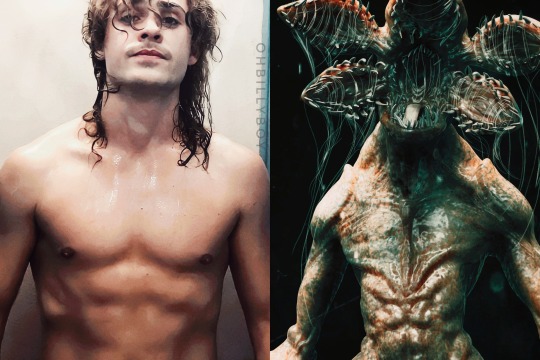
At first glance, the Demogorgon seems irrelevant to the question of whether or not Billy’s coming back. But as I aim to prove, it has everything to do with it.
Stranger Things deals heavily in the theme of reflections and opposites. Characters are designed to mirror each other, embody the opposite of each other, and sometimes both at once. Hell, the Upside Down is presented as a reflection of the real world. Literally.

(Damn. They ain’t subtle.)
By the term “dark reflection,” I mean a relationship like that between the Upside Down and the real world. The two are almost exact copies; the Upside Down has all the same landmarks, down to Will’s fort in the woods. But the Upside Down has been corrupted by the Mind Flayer, its inhabitants turned into unthinking monsters.
It’s like us. But it’s everything we hate about ourselves, everything we’re afraid of becoming.
When we probe relationships between characters, we find that pattern replicated across the board. I don’t have room to explore it in full here. However, Billy and the Demogorgon are one of the most obvious examples.
With the exception of El, the main character of the show, no one else has been compared to the Demogorgon like Billy has.
>>Billy fills the “monster” role in S3 that the Demogorgon filled in S1.
In S1, the Demogorgon stalks the inhabitants of Hawkins, kidnapping and killing them. In S2, we find out Demogorgons do not act alone, but are the puppets of a greater monster: the Mind Flayer.
In S3, the Mind Flayer possesses Billy, turning him into His puppet. Billy then stalks the inhabitants of Hawkins, kidnapping and taking them to his master, which ultimately results in their deaths.
In S3, the Demogorgon wears a human face.
>>Like the Demogorgon, Billy is the puppet of a greater monster... even before he’s possessed.
Max tells us as much in Runaway Max when she’s watching Billy beat the life out of Steve:
I remembered how it had felt the first time I’d watched the Hargroves in action. Neil standing over Billy with the belt in his hand. Neil calling me a stupid little girl for having the guts to try to stop him. Making it so clear that he thought I was small and weak and pointless. And knowing Neil believed that still wasn’t as bad as the way Billy had hated me for trying to help him. He was damaged. Broken, maybe. And even if he’d been coherent enough to argue with, it wouldn’t make a difference. I understood now that Neil was in his head, and that meant he was just as dangerous as his father. (p 218)
This implies not only that Billy is the Demogorgon, but also that Neil is the Mind Flayer. The ramifications of that idea are... oof. Just oof.
Remember the definition of “dark reflection” that I gave you. A dark reflection is something that’s like us, but represents what we hate or fear most about ourselves.
The Demogorgon is Billy’s dark reflection because it represents his fear of losing his humanity to an abuser.
>>Runaway Max draws on the grossest scene in S2 to give us a Billy/Demogorgon parallel.
In S2, Dustin finds a baby Demogorgon and names it D’Artagnan. At first Dart seems harmless. Then he molts and, in a scene I hate to watch, eats Dustin’s cat.
Keep in mind that Dustin’s cat is orange.
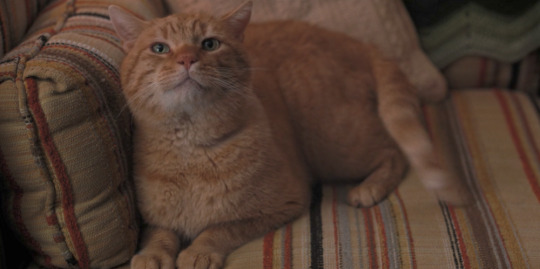
In Runaway Max, Billy seems harmless at first. Then, in a flashback to California, we’re told of the day Billy “molts.”
One afternoon, he’s hanging out with Max and his buddies Wayne and Sid on the scrubby hill behind the Hargrove house. He’s bored and pissed at Sid for besting him on a history paper. Pulling out his lighter, he starts playing with it.
We learn there’s a corpse of a cat nearby:
There was a dead cat that had been lying under one of the sweet pea bushes for a while. A mangy orange tom with one white foot. (p 63)
Billy stalks over to it with his lighter. In a “hard, bright” voice, he talks about giving the cat a “Viking funeral.” Then, over Max and Sid’s protests, he drenches the corpse in butane and lights it on fire. The flames race down the hill, and the others have to stomp them out before they spiral out of control.
Max notes Billy’s reaction:
Billy just watched, standing over the burning cat, smiling that small, tight smile he got when something seemed funny to him....
After that, I knew.
Not that Billy was crazy or out of control, exactly - it wasn’t like the cat had been alive. But the fact that he’d done it meant something. (p 67)
Yeah, this scene means something, alright. Symbolically, Billy - a baby Demogorgon - has just eaten a cat. And, like Dustin with Dart, Max realizes he’s a monster in the making.
>>The show’s plot and cinematography choices emphasize the Billy/Demogorgon connection.
1) El first meets them in the Void. They’re both crouching, and literally or symbolically feasting, as she approaches from the right.
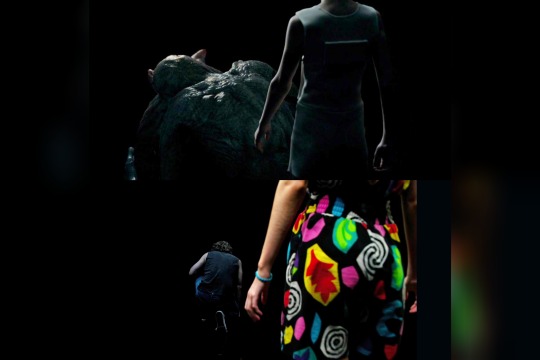
2) They stalk after the kids, shoulders hunched. In the Demogorgon’s case, the kids are trapped. In Billy’s case, he thinks he’s trapping the kids, but they turn the tables on him.

3) When the Demogorgon is activated, a crack rips through the tile wall of the lab. When Billy is activated, we see cracked tiles on the wall behind him.
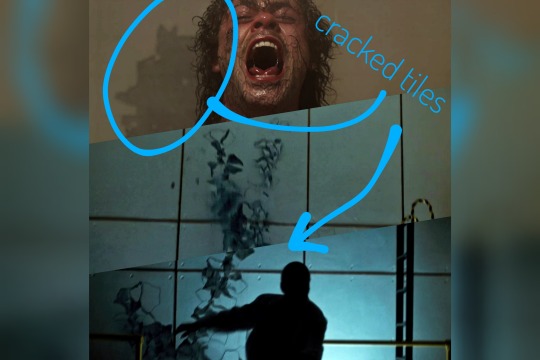
4) El pins them against the wall with her powers. Then she screams in their faces before she deals the “death blow.” In the climactic shot, she’s on the left, they’re on the right. Mike and/or her friends are behind her.

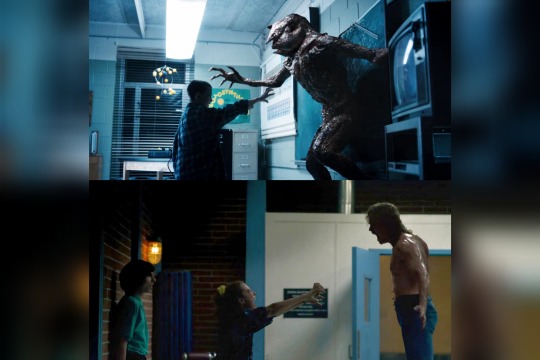
All of that ^ is the equivalent of the Duffers banging pots and pans. “Hey guys! Billy is like the Demogorgon! The Demogorgon is like Billy!” When I first noticed it, it told me to look for other examples of “mirroring.” Do we get any other shots that juxtapose the two?
Turns out we do. Oh my god, we do.
Study this pair of shots very, very carefully.
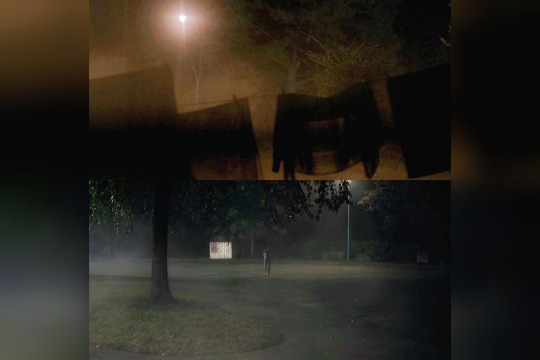
In the first, the Demogorgon is approaching the Byers' house. It's in the center of the frame, moving straight toward us. We see woods in the background; a lamp post is on the left side.
In the second, Billy is running away from the sauna. He's in the center of the frame, moving directly away from us. We see woods in the background; a lamp post is on the right side.
I’ve already talked about how the Upside Down is the deep sea. However, it is ALSO the woods. In fairytales, the woods are a place of mystery and monsters. Some of the most famous tales happen there, such as Little Red Riding Hood and Hansel and Gretel. (If you want to read more about this topic, here’s a Wikipedia article to get you started. Also a cool article on Medium)
With that in mind, we can describe this pair of shots as follows:
In the first, the Demogorgon is emerging from the Upside Down.
In the second, Billy is going to the Upside Down.
Interesting, right? Ah, but that’s only half of the story.
Study this pair now and tell me what you see.

Yep... they’re related.
In the second shot, Billy is swimming into the ocean. It’s the last glimpse we have of his young, happy self before the Mind Flayer kills him. He’s in the center of the frame, moving directly away from us, just like the first shot.
With that in mind, we could say...
In the first, he’s going to the Upside Down in its ‘woods’ manifestation.
In the second - OUR LAST GLIMPSE OF YOUNG BILLY BEFORE HE DIES - he’s going to the Upside Down in its ‘ocean’ manifestation.
Interesting how we've only seen him leave. Yet we have this iconic image of the Demogorgon, his “dark reflection,” emerging from the Upside Down and coming to us.
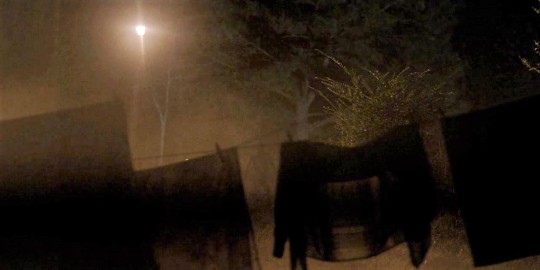
I have a spooky vibe, y'all, that we're missing a final shot.
And we're going to see Billy...
coming to us...
from the water.

I have so much more to unpack here, but this post has gone on long enough! In future posts, I’ll lay out more evidence suggesting Billy will return from the water. I’ll also explore the mythological implications. They’re mind-blowing :3
»»————- ✼ ————-««
P.S. I mentioned El has a unique relationship to the Demogorgon too. I’ll try to explain that eventually~~
»»————- ✼ ————-««
The “Billy Is Alive” Meta Series (So Far)
Billy Is Not a ‘B’ Character In Stranger Things
The First Rule of Analyzing Stranger Things: The Upside Down Is Symbolized By Water
The Lifeguard And The Rip Current: Our First Big Hint That Billy Is Alive
Why Haven’t We Seen Dacre On Set?
Frequently Asked Questions
For updates, follow the hashtag #billy is alive meta
#billy hargrove#the demogorgon#stranger things#billy hargrove is alive#stranger things theory#stranger things 2#stranger things 3#stranger things 4#stranger things meta#stranger things analysis#billy hargrove meta#billy is alive meta#ohbillyboy#the upside down#el hopper#eleven hopper#dark reflections
264 notes
·
View notes
Text
Analyzing the 5 plays in this drama club poster .From the bts pics of stranger things 4.

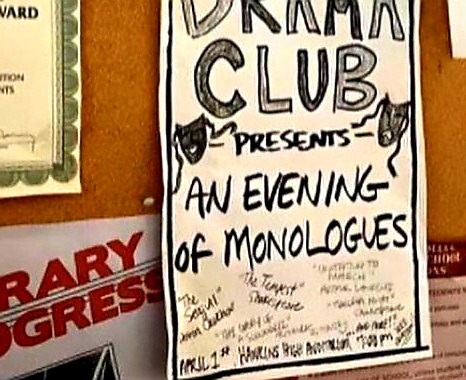
So... some of ya’ll know I'm going through the st s4 films given to us by the official st twitter + the films reffed in the show itself or mentioned by the Duffers in interviews .
So I decided to look at the plays mentioned here. Because even if we don't see the monologues in the show directly - the Duffers wouldn't name drop anything unless it inspired them in some way. Similar to films name dropped in the show. Tw : for some dark themes .
This is just a quick little analysis I decided to do since we probably won't get any new st content today (3/22). Nothing too deep. Just mentioning things that caught my interest especially cause these plays have a lot of narrative connections to the st s4 movies I've been watching.
Invitation to a march (Authur laurents)
Reminds me of the stancy/jancy love triangle. "A young woman is having second thoughts about doing the right thing and marrying a respectable , rich, kind, young man with good prospects.By way of a prewedding diversion, this woman becomes interested in the passionate but poor and entirely unsuitable son of a local landlord.Basically, the plot concerns the efforts of Norma Brown to choose between a conventional fiance who "puts her to sleep" but is wealthy (like what her own mother did) or go for this new-poor guy. The play is principally interested in how this youthful love triangle affects the three mothers involved (whether the kids like it or not)
12th night (Shakespeare)
- viola (el) wrongly assumes a family member (hopper) is dead. She dresses up as a man named 'cesario'. A girl named Olivia falls for 'cesario' (violet dressed as a man). "Finally, when 'Cesario' and Sebastian (violet's twin brother: assumed to have drowned - Will) appear in the presence of Olivia there is more wonder and confusion at their physical similarity. Taking Sebastian for 'Cesario', Olivia asks him to marry her, and they are secretly married in a church. Cough if Olivia is 'straight' cause she fell for Viola (as a doppleganger dressed like her twin brother).Mike being into el who multiple characters in s1 said looked like a boy and specifically like Will is...suspish and a hint he's not straight lol. just like Olivia they're both into guys . plus, this play just has a butt load of love triangles (ugh i hated that aspect). There was also romantically coded letters (which was in the s4 films) . One character is also thrown into an insane asylum and framed as 'insane'.'Pretending that Malvolio is insane, they lock him up in a dark chamber. Feste visits him to mock his insanity'. We all know the psych hospital will be narratively important- talked about it more here.
The seagull (Anton Chekhov-russian)
similar to how I believed s4 will show m*#even already broken up since the months between s3-4 : act 3 (s3) ends with Nina begging for one last chance to be with Trigorin before he leaves/moves away. They kiss and make plans to meet again in Moscow.And in act 4 there's a timeskip where it shows they've been broken up for a long time between acts- and its established they never actually loved eachother. Do i even have to spell out why this parallels the m*#even ending in s3? There is also a play within the play (this is common in a lot of the st films- they have plays- or a story within a story- which illustrate certain themes or emotions of the characters within said film : blackswan, children of paradise, highschool musical, Rushmore, book of Henry, welcome to marwen, never ending story, romancing the stone, wet hot American summer, etc).The play is Konstantin's latest attempt at creating a dense symbolist work. There is also alot of love triangles in the seagull. TW!: for se#ual ab*se/su*cidal thoughts/ inc*st (here and in other play segments). The seagull motif reminds me a lot of Jonathan's rabbit story.Konstantin romantically into Nina shows up to give her a gull that he has shot. Nina is confused and horrified . Trigorin sees the gull that Konstantin has shot and muses to Nina on how he could use it as a subject for a short story: "The plot for the short story: a young girl lives all her life on the shore of a lake. She loves the lake, like a gull, and she's happy and free, like a gull. But a man arrives by chance, and when he sees her, he destroys her, out of sheer boredom. Like this gull." This immediately reminded me of jon's rabbit story and some of the movies on the s4 list . Like in forrest gump- Jenny (who is poor) was se*ually ab*sed as a very young girl by her father. As a child she runs away into a field-away from her alcoholic father yelling at her -there she prays that she can "be a bird so I can fly far far away" .
Jenny as an adult struggles with this unresolved trauma- being with ab*sive partners, doing dr*gs, and having su*cidal thoughts . She as an adult when contemplating su*icide, jokes 'you think i can fly like a bird ?' while looking down at a bridge.God-i'm worried about jonathan (Jenny was also a musician sort of like jon). In another s4 movie example ' mystic river ' :(in the 80s) a preteen baseball playing boy is r*ped by men in the woods. He later says he wishes he could become an undead monster to not feel the pain of that experience - cause quote " if I'm not human anymore maybe the pain will stop" (Will) . slightly off topic but he also has another personality, imagines a alternate word that dissappears when he turns his head. And as a less direct animal parallel to the play - the boy from the film also imagined his perpetrators as monsters and wolves to cope.In 'getout' the photographer character sees a dead deer in the woods and it represents a parent/his own childhood tra*ma relating to his past. similarly in 'prince of tides' the 2 siblings as kids were ra*ed by men. The older brother remembered it and the younger sibling developed DID (so didn't remember but she would draw wolves- as the perpetrators/villains in her picture stories she created . In the film they also had an ab*sive dad and were very poor. She also tried k*ling herself multiple times-but started to get better after remembering the source of her pain and trauma. There is also the theme of multiple attempted su*cides in the play- and the play ends with yet another attempt- and the audience is left unaware of the artist's fate at the end of the play.
The tempest (Shakespeare)
Prospereo - (the perceived antagonist) is a wizard with monstrous looks, storm powers , and ability to create monster-dogs
He wants revenge on a man who tried ra*ing his family member & revenge on his other family member who wronged him years ago. I mean... pretty much my did theory.But in the end.Prospero decides to show his enemies the mercy that they did not show him twelve years earlier. He tells Ariel to bring the men to him, he will restore their sanity and then renounce magic forever.Prospero breaks the spell that the men are under .
Diary of a scoundrel (Alexander Ostrovsky-Russian)
- I suppose this could loosely relate to Jonathan? Glumov, is a young man from an impoverished family lacking status seeking entrance into society's pampered class. A 19th-century Russian scoundrel must scheme his way out of his meager life in a small apartment -whatever it takes.He has a quick mind and some talent for seeing through the hypocrisies of people around him ( Jonathan does make a lot of social critiques about society). That gives him some advantages. A tale of one man's mission to finagle his way into upper-class society and find a cushy job. Set in 1874, this social comedy follows Glumov, a Russian youth who begins his ambitious ascent to social esteem. He progresses by wit, guile and rhetoric. Pitting one stupid person against another, he soon gains his ends. To reach these goals, Glumov will lie, flatter, and cater to the vanities of the wealthy. Unable to contain his disgust with his victims, Glumov decides to relieve his unvoiced satirical comments by recording his schemes in a diary. But he is tripped up by his uncle's wife, to whom he has made passionate love on his way to success. At the end of the play, his diary is stolen and his duplicity exposed, but he can nevertheless suceeds. The author is much more critical about the high society itself than about the main character, so the play keeps attracting generations of directors by opening possibilities for political criticism while also avoiding naming names of the current rulers.The play's aim was to overthrow bourgeois tradition and establish a class-conscious art called eccentricism giving a deliberately comic portrayal of reality.
I suppose I notice some possible commonalities- besides s3 critiquing the wealthy/capitalism in comedic ways . jonathan since s1 has worried about his family's finances / had some resentment toward the rich . In some of the s4 movies ‘orphan’ & ‘ girl interrupted’ someone reads their diary out loud to get at them (in girl interrupted the winona character’s diary even had critiques of her new friends). Alot of movies also have someone (usually a teen/young adult) making a documentary about their life -which could narratively replace said diary? A few movies have a poor guy adjusting to snobby rich social circles (or being poor and then getting money)- titanic, kingsmen, karate kid, the craft , godfather, wardogs,into the spiderverse,flashdance, and many others . And movies like wardogs has a poor-young-character do shady things to finacially support his family . There’s also that whole uncle’s wife thing- which makes me uncomfortable for obvious reasons (but I’m just thinking of Lonnie’s creepy gf who was into him). A few movies had the guy’s step mom innappropriately hit on him- orange county & you got mail. And him trying to avoid her advances. Or...not to mention ... it may be a problematic coincidence /trope. But in enter the void -the guy who needs to finacially support his sibling/ does dr*gs -hooks up with his dr*g dealing friend’s married mom (who would give him money). Or in gilbert grape- the poor teen-who has to finacially support his siblings/single mom-has his endgame relationship be a girl his own age. But before that he h*oked up with a married woman -who would give him money. Don’s plum -young film guy-propositioned by older female film director (for dream job). Not even mentioning the other films that have the guy hooking up with toxic older women (like ‘the graduate’). Or analyze this-where the therapist accuses him of having an Oedipus complex (not touching that one... but the guy in ‘enter the void’ a 100% had one). It’s possible those movies were just- inspo for s3? A coincidence? Or s3 was foreshadowing for this in s4- but unlike s3 it will accurately be played as wrong and a sign of Jonathan recreating past tra*ma caused by Lonnie (cough like the photos) /being desperate for money. And not played ‘comedically’ like how it mostly was in s3. But shown as self destructive (for Jon) and immoral on the Woman’s end. Like... Billy and Jon are character foils. Both are older siblings into rock music, with ab*sive dads who shoved them into walls. Both lose it (and beat steve to a pulp when Steve accidentally triggers their daddy issues). In s3 it’s established womanizer Billy has mommy issues, than he tries ho*king up with someone his mom’s age, and the characters ref ‘back to the future ‘ and Steve incorrectly says it’s about “alex p keaton trying to bang his mom.” This could illustrate his subconscious issues with parental figures/adults cause of Lonnie’s possible past se*ual ab*se . One film the friend even says to the guy “you don’t have friends!” guy b: i have friends! him: no you have acquaintances! ADMIT IT! YOU’RE AFRAID OF MEN!I mean-Jonathan liked Nancy- but he initially hooked up with her cause he wanted to prove he didn’t have ‘trust issues’ from his dad. Also it’s prob a bit of a reach (and maybe a coincidence)- but the fact Murray in the same breath compares Steve (Nancy’s then bf) and Lonnie ... uh... if you think too long about it ... it’s very sinister . Especially because in s3: muray tells Joyce that despite her wanting to be with a nice guy, she’s curious about “the brute” Hopper despite him reminding her of a past “bad relationship”(aka Lonnie). Like- yeah connect some dots. Quite a few films (other than forrest gump) also have the character who (as a kid) was r*ped by their dad/parent- begin to do dr*gs/be pr*miscuous as adults since they never learned to properly cope with their trauma (’girl with the dragon tattoo’, ‘black swan’, and ‘magnolia’). Unfortunately the whole relative doing such things to kid-relatives is in at least 30+ movies.
Personally, i would be MUCH happier if Jon had a age appropriate romance- and had not a single creepy adult near him. A few movies actually imply Lonnie gets yet another ‘new model’ replacing his gf in her 20s with a new gf- who is ‘barely l*gal” and just turned 18. so there’s that possibility as well- that she’s jonathan’s age.I just want Jonathan-happy &safe. GOD. IS THAT TOO MUCH TO ASK?
#byler#byeler#will byers#mike wheeler#Jonathan byers#nancy wheeler#joyce byers#jim hopper#murray bauman#stranger things#el hopper#s4 theory#stranger things theory
178 notes
·
View notes
Text
Mary and butterflies - the inevitability of death, murderous calling cards and collectors
Some ramblings with links to other people’s excellent meta, in which I suggest that butterflies (and/or moths) symbolize Mary as Moriarty’s reincarnation and or calling card, while also hint at her inevitable death.
Disclaimers: credits are below the cut. I’m not an expert in any of these topics. Thank you, @thewatsonbeekeepers for the beta. In this post I’ll be using moths and butterflies interchangeably, apologies to any entomologists.
Mary’s appearance in the show brings with it new imagery we haven’t seen prior to The Empty Hearse - butterflies. Once Mary’s in the picture, there are butterflies in some very strategic locations, all are either visually or subtextually leading to her. The show has done that previous to season 3; Moriarty is connected to some well established symbols like magpies, apples and IOUs.
When I first started reading meta I used to think these themes were a bit of a stretch, but I’ve since accepted that this is a show that puts barely noticeable phoenixes in a restaurant scene that shows us Sherlock rising from his death.
Here are some of the butterflies I spotted so far:
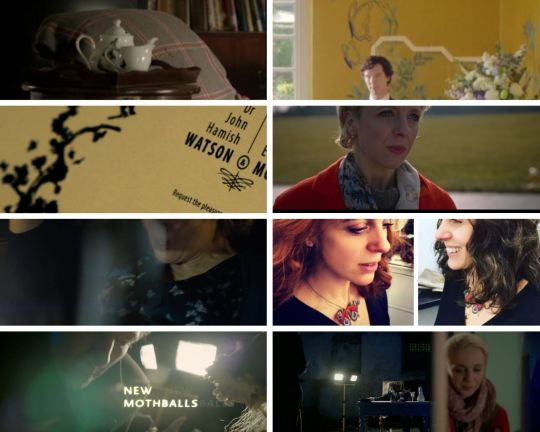
Butterflies (and in the case of this piece of meta, moth) symbolize most commonly resurrection, change and renewal. Behind the symbolism stands the transformation of a small, ungainly creature into something full-grown and unbound. In that case, in the simplest way, one could argue that butterflies were chosen to symbolize her because the ‘Mary Morstan’ persona was a stillborn’s identity that was stolen and used ‘reborn’ to create a new person.
But more than this simplistic idea; butterflies carry multiple symbolisms. When it comes to Sherlock, I and many others tend to look at Victorian symbolism, considering the detective’s Victorian roots.
I find the appearance of butterflies interesting in Mary’s context, much like I find the skull interesting in Sherlock’s. The skulls, in Sherlock’s case, serve plenty of purposes, but one of them is the idea of memento mori.
Memento mori (Latin for 'remember that you [have to] die') is an artistic or symbolic reminder of the inevitability of death. These are representations that can appear in any form of art such as paintings, literature, poetry etc. It’s a concept that existed in many ancient cultures but is also deeply rooted in early Christianity. It serves to remind people of the inevitable; that even if we choose to ignore it, not think about it, it’s always there lurking, and the purpose is not to scare us but to encourage us to make good use of our time when we’re alive. Memento mori was the philosophy of reflecting on your own death as a form of spiritual improvement, and rejecting earthly vanities.
Victorians were obsessed with the concept (weren’t Victorians obsessed with everything?). They would take photographs of the dead and keep locks of hair of those who died in mourning brooches. It is said that they found these practices comforting.
Another expression of the ‘remember that you must die’ concept was vanitas art; vanitas is a symbolic work of art showing the transience of life, the futility of pleasure, and the certainty of death. The Latin noun vanitas (from the Latin adjective vanus 'empty') means 'emptiness', 'futility', or 'worthlessness', the traditional Christian view being that earthly goods and pursuits are transient and worthless. It alludes to Ecclesiastes 1:2; 12:8, where vanitas translates the Hebrew word hevel (הבל), which also includes the concept of transitoriness.
This concept reminds me, most especially, of the skull used in The Abominable Bride, which is actually Charles Allen Gilbert's 'All is Vanity' Illusion art.
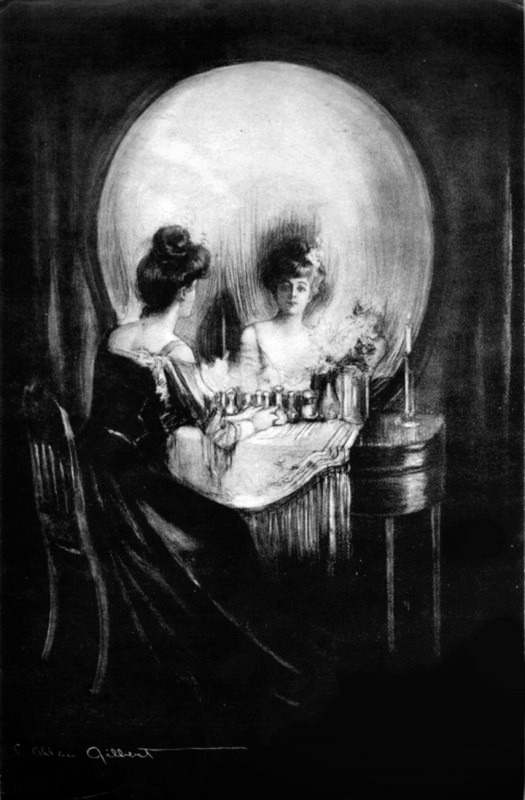
Back to butterflies - butterflies are a staple component of vanitas art - paintings executed in the vanitas style were meant to remind viewers of the transience of life, the futility of pleasure, and the certainty of death. They also provided a moral justification for painting attractive objects - in a way, it’s a justification for the vanity, or the human need of enjoyment of beautiful things. Below is a vanitas by Jan Sanders van Hemessen:

But butterflies are also considered an omen of death:
“Butterflies and moths were associated with death, sometimes merely as omens, sometimes as the soul or ghost.” These butterfly omens came in many ways. For example, in the nineteenth century United States, some people thought that a trio of butterflies was an omen of death.” [x]
Oh.
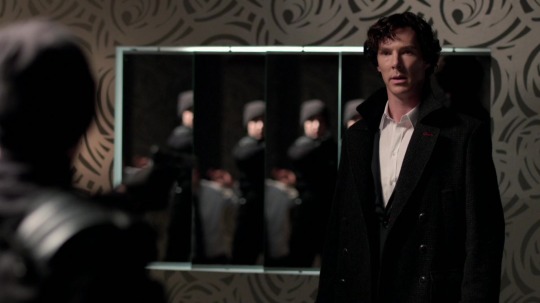
But I also think there’s more to the butterfly symbolism than Mary’s imminent death; I suggest that, in keeping with @loudest-subtext-in-tv M-Theory (suggesting that Mary was planted in John’s life by Moriarty), they symbolize Mary as Moriarty reincarnated following his death in TRF. That Moriarty had indeed not disappointed Sherlock - there was a posthumous game after all! That Sherlock was supposed to understand that while one form of Moriarty died on that roof, another had emerged, continuing the mission of burning Sherlock’s heart. Mary is Moriarty’s calling card, left behind in the crime scene. They’re different, but not separate, which is why Sherlock is so obsessed with Moriarty between HLV-T6T; he’s both wrong and correct at the same time.
So far, what I’ve suggested is that in Sherlock, skulls are Sherlock’s symbolic memento mori - the skulls are associated with Sherlock in some very significant ways.
However, Mary’s character was doomed from the start - she dies during Sherlock’s hiatus in ACD canon. I believe many fans assumed Sherlock’s Mary expected the same fate when she was introduced to the show. Although the story of Samarra is told by Sherlock, who expects his own death in T6T, Mary is the one who ends up dying.
Butterflies in ACD canon
Searching for the significance of butterflies in the ACD and BBC canon led me to a number of interesting directions in meta written by others.
The first and probably the best place to start is this meta post by @tendergingergirl, which I strongly suggest you read in full: Butterflies, Sexual Deviancy & The Bloodline Theory in The Hound of The Baskervilles.
Stapleton also has a hobby. He collects bugs…Butterflies, to be exact. This can often be seen as purely academic, but depending on the actions of the hobbyist, they can indicate more disturbing things. That of holding something vulnerable captive, treating it as your hostage, pinning it down. The torture of animals has come to be a good indicator of someone who would do this to a human. He had already shown callousness by laughing as he recounts to Holmes of ponies wandering onto the Moor, becoming trapped, and dying. In 1974, there was a release of a new edition of Sherlock Holmes stories, with the forward of The Hound of The Baskervilles written by British author, John Fowles. He is responsible for several well-known works, including The French Lieutenant’s Wife. Another, was a novel that Mason finds himself wondering why Fowles doesn’t mention in his introduction, since the villain is such a close parallel to Stapleton.(but as we have learned through the study of ACD, most writers will not come right out and say where they got their inspiration. They like for you to guess!)
A lonely young man, works as a clerk, and collects butterflies, becomes obsessed with a pretty young girl, Miranda, an art student. He chloroforms, and kidnaps her, taking her to his cellar basement, to add Miranda to his collection. That book was called The Collector. But what else does it sound like?
“So yes, I googled. From an article on the release of the movie’s Documentary. "The docu proves a poor reference point for anyone who wants to understand the literary and movie links for “Lambs.” There’s no mention, for example, of how Harris partly based the butterfly-loving Bill on John Fowles’ kidnapper in “The Collector” …And here I thought Mofftiss added allusions to Silence of The Lambs into Sherlock just for fun. SMH.”
@tendergingergirl also added this photo to their post:
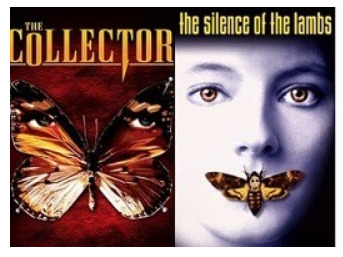
So what we have here is a chain of metatextualities/inspiration, starting with ACD’s THOB, where Jack Stapelton inspires a book about a disturbed butterfly collector (The Collector by John Fowles), which inspires a the author of Silence of the Lambs in creation of his character Buffalo Bill, a serial murderer who inserts a death's head moth into the victim's throat because he is fascinated by the insect's metamorphosis. Silence of the Lambs served as inspiration for Sherlock as analyzed by @garkgatiss in Bond, Hannibal, and Holmes (I suggest you read the whole Hannibal section) .
Let’s look again at some imagery from His Last Vow. Mary shoots Sherlock’s heart, essentially burning his heart out, and who does Sherlock meet in his Mind Palace in a very cocoon-like straightjacket? Yes, the dead dude who encourages him to die already (“one more push, and off you pop”).
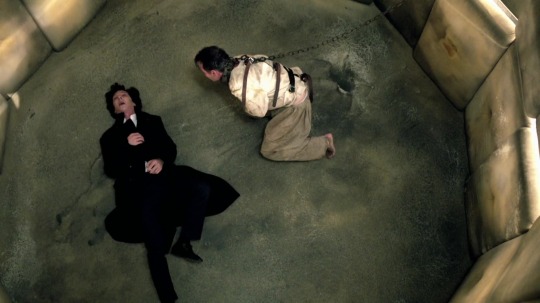
What’s the next thing we as an audience see once Sherlock opens his eyes? Mary coming to the hospital to hear that Sherlock had, in fact, survived. And what is she wearing? Her butterfly scarf, one which will another appearance later in the episode, during the tarmac scene.
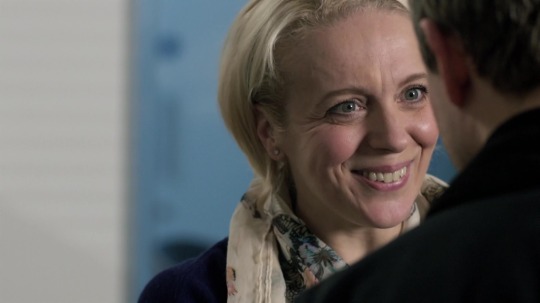
I also find it interesting that in the context of Sherlock and Silence of the Lamb, there’s an element of gender-switching between Moriarty and Mary. Buffalo Bill, the murderer from Silence of the Lambs, skins bodies of women to create himself a woman’s 'suit’; in Sherlock, Moriarty is a man-villain who transforms into a female-villain in the form of a bride and/or Mary.
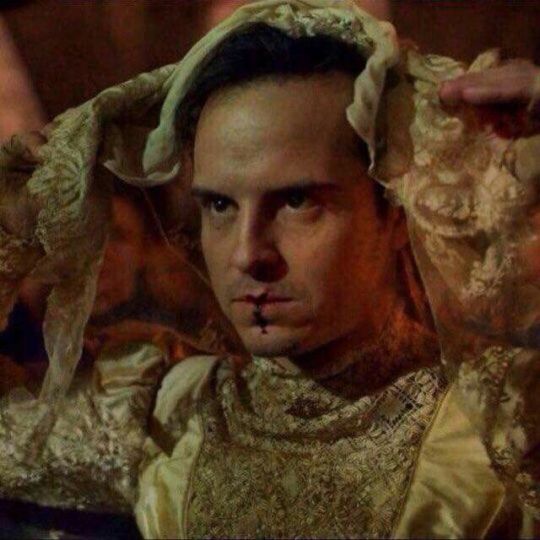
By the way, who else is obsessed with his suits?

Also, let’s not forget the worms, maggots and other such crawlers in the grave scene:

Now, let’s go over some of the photos I included in the beginning of this post a bit further.
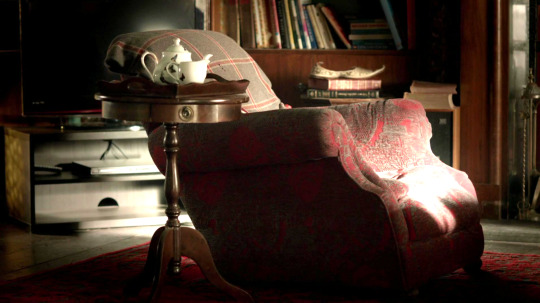
Mrs. Hudson’s butterfly tea set is first shown in TEH - she uses it to serve John tea when he comes visiting her and tellis her about Mary. We also see it near John’s chair on the day of the wedding. This isn’t Sherlock’s set - his set is different, featuring the British Isles. Moriarty drinks from it in TRF. The next tea set we see, now that Moriarty is dead, is the butterflies one. In TLD, Mrs. Hudson uses Sherlock’s tea set - the butterflies are gone.
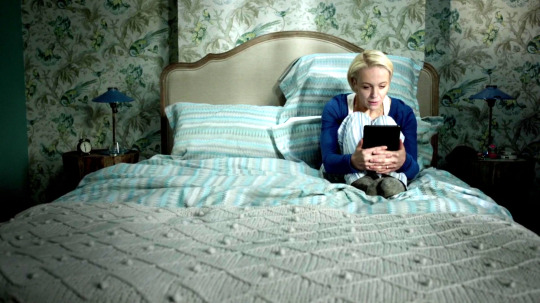
Mary’s bedroom wallpaper is very feminine, with flowers and butterflies, both complementing symbols while also very common in vanitas art. Much like Mrs. Hudson’s wallpaper in Baker Street, Mary’s wallpaper is supposed to show the contrast between Mary’s flat/Mary and Sherlock’s flat/Sherlock.
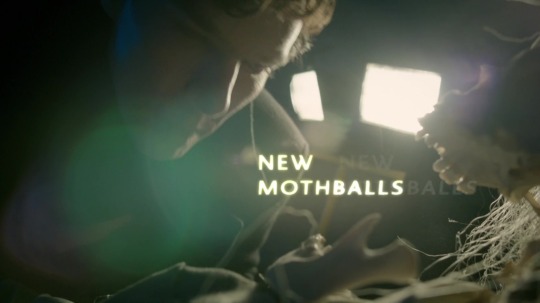
There’s an interesting moth reference in The Empty Hearse, which in my opinion, is Mary & Moriarty related. In short, in a previous piece of meta I wrote, I suggested that the Jack the Ripper case in TEH is subtext alluding to Mary’s skeletons, which Sherlock ignores because he’s upset by his reception by John. And what’s one of the first things Sherlock notices about the skeleton? New mothballs smell, hinting at an attempt to get rid of moth/butterflies - maybe a hint to the fact that Sherlock has a chance to discover the truth about Mary but misses it. Also, in the context of Mary and the Jack the Ripper case, notice this transition:
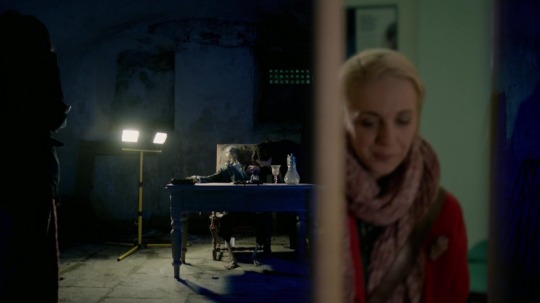
Transitions are important on Sherlock - they’re nearly always there to draw our attention.

This, I think, is perhaps the most telling about a possible connection between Mary and Moriarty: we have both magpies (a Moriarty hint) and butterflies together here. This isn’t the only hint of Mary’s past we get in the wedding; there is, after all, the telegram from CAM.
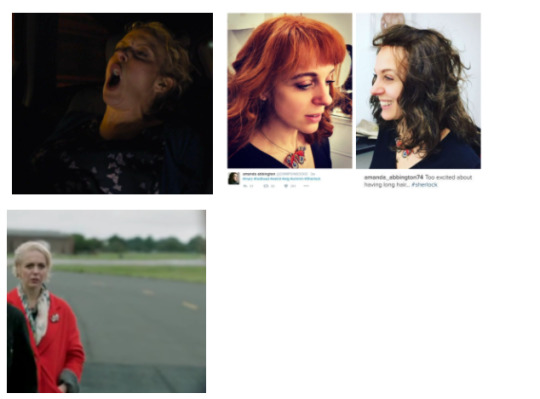
Mary’s scarf is colorful, and it appears by the time Sherlock’s subconscious suspects Mary. Mary’s black butterfly dress - an ominous dress, I’d say - is the one she wears during the labour scene in the car. The third photo is a behind the scenes photo uploaded by Amanda Abbington, although I’m unsure whether this necklace is AA’s or Mary’s (but I couldn’t pass on including this).
Interestingly, the butterflies do not appear in Rosie’s context - either because it’s a telling sign that Mary won’t be with us much longer, or because Rosie is spared being considered a part of the ‘burning Sherlock’s heart’ plan. Sherlock, on the surface, seems to love Rosie and accepts her.
Also, another BTS photograph I came across during my research which I’ve never seen before and ties nicely to the vanity topic is this one (found here):
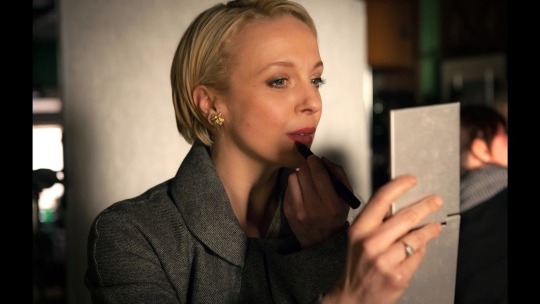
The Death's-head hawkmoth and ‘Death with Interruptions��
You’ll recall that I referenced The Collector and Silence of the Lambs, both featuring butterflies on their cover art.

The Silence of the Lambs cover features Acherontia atropos, otherwise known as the death's-head hawkmoth. It gets its name from the sinister-looking skull shape on its back. In many cultures it is thought to be an omen of death. In a bit of another coincidental but stunning piece of symbolism, all three species of the Death's-head hawkmoth are commonly observed raiding beehives of different species of honey bee; A. atropos only invades colonies of the well-known western honey bee, Apis mellifera, and feeds on both nectar and honey. They can move about in hives without being disturbed because they mimic the scent of the bees and are not recognised as intruders.
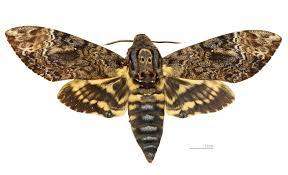
Anyway, the use of Acherontia atropos reminded me of the book ‘Death with Interruptions’ by Jose Saramago. Interestingly, this is another book about a deathly collector with a butterfly on the cover:
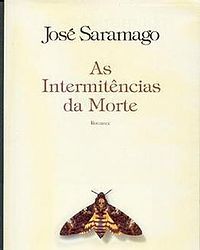
In Death with Interruptions death is a woman, and she falls in love with one of her future victims. She decides to spare his life: Every time death sends him his letter [notifying him of his imminent death], it gets returned. death discovers that, without reason, this man has mistakenly not been killed. Although originally intending merely to analyse this man and discover why he is unique, death eventually becomes infatuated with him, so much so that she takes on human form to meet him. Upon visiting the cellist, she plans to personally give him the letter; instead, she falls in love with him, and, by doing so, she becomes even more human-like.
It’s pretty common to read theories about Mary who maybe was one of the assassins due to kill John both at the pool and in front of Barts. So we have a death harbinger trying to kill someone twice and failing. She then falls in love with him.
But how does the butterfly fit in?
Well, at some point in the story, death (that’s her name, sans a capital d), contemplates that using the death head butterfly, instead of a violet piece of paper, would have sent a much stronger message to those whose death is coming for.
And here’s another last bit of coincidental reference to Sherlock: I’d argue shades of purple, among them shades of violet, are associated with Mary and her secrets. There’s the purple dress she wears in TEH, her bridesmaids’ dresses include various shades of purple (including what I would argue was a violet sash) and let’s not forget:
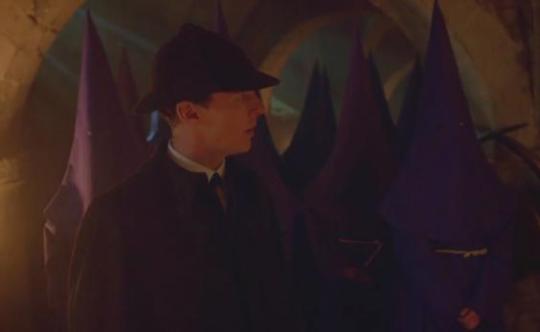
Oh and, by the way, remember the song Donde Estas, Yolanda from TEH, about a woman called Yolanda? Always thought it was a bit of an odd choice for a song?
Yolanda is a female given name, of Greek origin, meaning Violet.
:)
Thoughts?
Credits: thank you @lukessense for directing me to @tendergingergirl meta about butterflies. Episode screenshots are from kissthemgoodbye.net.
@sarahthecoat @tjlcisthenewsexy @devoursjohnlock @inevitably-johnlocked @shylockgnomes @possiblyimbiassed @raggedyblue @ebaeschnbliah @gosherlocked @waitedforgarridebs @helloliriels
#mary mosrtan#butterflies#silence of the lambs#the collector#meta#sherlock meta#tjlc#johnlockendgame#jim moriarty
88 notes
·
View notes
Text
What happened to Rey?

Rey was honestly one of my favorite characters coming out of TFA, but I couldn’t figure out why I was walking out of TROS feeling like there was something off about her. I decided to dive into a character study to see what the issues were. That’s when I realized the unbelievable character regression we witnessed in TROS. I know I’m not the first one to notice this or comment on it, but here are some of the key elements I noticed.
Rey’s Wardrobe: Rey’s wardrobe in the first two movies does an interesting thing. She starts off in an off-white outfit, very similar to the looks we see on Anakin in TPM and Luke in ANH. This signals the beginning of all three of their stories. Each character begins as a child and is inexperienced and naïve in their training and maturity. Then, we move to the second movie. Rey progresses to cool grays, Anakin movies to a series of deep blues, browns and black; and Luke also moves to a gray color scheme. This signals the growth, the changes, the rise in maturity and knowledge, and signals the step that they are no longer in that place of innocence and adolescence. This matches what we see on screen in ESB as Luke dives deep into his training, Anakin goes on his first solo mission in AOTC, and Rey trains with Luke in TLJ – it fits perfectly.
Then, we get to the third movie. And here’s where the problems begin with the choices they made with her character. In ROTS Anakin is wearing all black, he has a gloved hand -- his wardrobe not only signals his completion into maturity but also foreshadows his eventual turn to Vader. Luke is also wearing all black, at one point he has a cloak, and his wardrobe shows the struggle and trials he’s been through. Luke is no longer the same man he was in ANH. Famously, Luke’s all black wardrobe raises the question of “will he turn to the dark side like his father?” And after he refuses, we see the white lining to understand that he was always good on the inside. If we were to follow this trend (since Star Wars is supposed to rhyme), Rey should have been wearing dark colors. A darker color would have also been a nice callback to the teasing question we had with Luke, but instead the question would have been “Will we see Rey join Kylo on the Sith throne?” Instead, what we got was a blindingly white outfit that was identical to her TFA outfit. Not only does this symbolically point to a regression in her character and the work and training she’s gone through, the stark white paints her as an innocent – a pure creature that is untouched and has a naivety about her and her experiences. More than that, it’s almost identical to the outfit she wears in the flashback when her parents leave, telling us that after the acceptance we witness in TLJ that her parents are gone and her place is ahead of her instead of behind, she’s suddenly regressed back to waiting for her parents to return to her. This outfit did not suite the Rey that we left in TLJ who showed development and experience.
Rey’s Hair: It’s been a common theory that the reason Rey has her 3-bun hair style is because it’s the same hair she had when her parents left; and the reason she kept it was so they could recognize her if they returned. This ties into the same point made that she is wearing the same outfit she had as a little girl so they could recognize her too. The irrational hope that even as she knows (as Kylo unlocks this memory within her) that her parents are gone, she still won’t let it go. The problem with this hair choice for TROS is that Rey had already moved passed this way of thinking. In TLJ we see his beautiful moment of her accepting Kylo’s words to “Kill the past so you can be who you were meant to be”, seconds later after this scene she dives into water (i.e. a rebirth or baptism) and comes out with her hair down. This was beautifully done and was a great way to show the big step Rey had just taken in her character journey. Not only that, but immediately after she lets her hair down, she reaches out to Kylo again and they admit to each other that they’ll never let the other person be alone (i.e. a new family). Unfortunately, the writers of TROS decided not to follow up on this, and instead her character goes back to the same little girl hairstyle she’s had since she was a young child. This felt like Rey tacking a Padawan braid in her hair after she had already ceremoniously cut it off. There was no excuse or reason to justify it either other than that she reverted to a child like state.
She was living with Leia, the Princess from Alderaan, the place with a culture famous for their braids. Would it not have made infinitely more sense for Rey to be sporting an Alderaan-like braided hairstyle? Not only would that have helped TROS’s “New-Found Family” theme they were poorly trying to convey, but it also would have emphasized the relationship and connection between Rey and Leia. It would have been an easy way to show the audience that Rey and Leia had bonded, without them having to film it (which they couldn’t have anyways).
Rey’s Staff and Saber: Now, Rey’s staff has been with her since the first moments of TFA. She relentlessly carries it around with her all across Jakku and it’s her main form of protection. This makes total sense in the TFA timeline. However, about halfway through TLJ we see her shift her attitude towards the staff. There is a moment on Ahch-To where she’s practicing with it, she stops, and instead shifts to using the legacy saber for her training. Not only that, but during her fight with Luke she uses the staff for a moment, only to quickly drop it in favor of the same saber. After which point, she never uses it again in TLJ. By the beginning of TROS, after we’ve clearly seen the legacy saber working and her using it, it makes no sense for her to continue carrying around the staff. The staff was a symbol of her time on Jakku, it was her main weapon of choice before she became a Jedi and before she joined the Resistance. After she goes on her journey for a little bit, in TLJ she moves past that, she sets it aside in favor of the saber since that is where her future is. However – in TROS she inexplicably goes back to carrying it around like a safety blanket. It's another tether to her childhood that the writers insisted on keeping around even though it had no purpose. She uses it one time with Zorii Bliss, but even then in a second she swaps it out for the saber. There was no purpose for her to have this staff with her and more often then not, it hinders her ability to use her saber, the true Jedi weapon. In one scene—ridiculously—she carrying around the staff, the saber, the sith dagger, Han’s blaster, and Chewie’s crossbow and bandolier. She looked like the character from Jumanji with the giant backpack that is just known as the weapons valet.
As for the saber and how it relates to her character regression… In TFA we hear Maz Kanata say “This lightsaber belonged to Luke, and his father before him, and now it calls to you.” She then proceeds to use the lightsaber to defeat Kylo Ren and the Praetorian Guards all on her own. She’s trained with it, it flies into her hand when she calls to it, and she retrieved it after Luke threw it away on Ahch-To. This was Rey’s saber. However, in TROS we get this perplexing line of her returning the saber to Leia (who never owned it?) and saying she’ll earn it again one day. This was wrong on so many levels. Not only did Rey already earn this lightsaber, and it called out to her in Maz’s castle and on Starkiller; but the fact that she doesn’t even assume she’s worthy of holding a lightsaber means her Jedi’s journey is in it’s infant stage in the final film of the trilogy. Compare this to our other main protagonists Anakin and Luke, they’re both masters (sorry, Anakin) at their craft and proficient and confident with a saber. Anakin defeats Dooku when Obi-Wan can’t and Luke has built his own saber and takes on an entire barge of criminals. They’re both exactly where they should be in their Jedi/Hero’s journey at this point in the story. But, in TROS, Rey takes an epic step backwards from all the groundwork done in TFA and in TLJ and is put in the place of a Padawan. Where she should have been prepared to fill in the shoes of master, she’s not even fit to carry a lightsaber without permission from a parental figure. What’s worse, it is brought to our attention that Rey is trying to earn this saber, and in the end, she ends up just burying it in the sand and making a new one anyways. In a weird way this feels like she gave up on that idea entirely, or failed at it, and instead decided to make a new one because in the end she didn’t feel worthy to use it.
Rey’s Maturity/Emotional Mindset: For lack of better word, Rey’s maturity in this movie takes a huge step back as well. Again, if we look at our other protagonists Anakin and Luke, they both start off as young, naïve, and somewhat whiny. Rey, blessedly, never whined but we do see a great amount of youthfulness and child-like behaviors from her in TFA. She slides around on sand dunes, she runs away in Maz’s castle when she gets scared, she plays around with a x-wing helmet. This is the perfect place for her character to begin and balances great with the parallel of Luke and Anakin who both are in similar states. Then, in TLJ, like Luke and Anakin, Rey matures. She’s no longer playing around, she faces Luke head on and fights for what she knows is right, she doesn’t shy away when she’s scared, she enters into a relationship much like Anakin did – signaling her maturity and stepping into adulthood. Rey in TLJ grows up so much in the best possible way. After her hair comes down, and after she shares the hut moment with Kylo, she steps up fully and makes the choice to go and save him, moving away from her master to go on the journey on her own. She faces Snoke with her chin held high and doesn’t cower or get persuaded by him. She never lashes out irrationally and is poised and dignified the entire time. We see this again at the end with Kylo and her during the last force-bond scene of TLJ. This is after they’ve already parted ways and after she realizes he’s taken on the mantle of Supreme Leader. What we see is Rey standing there, poised and dignified, mature and calm as she looks him dead in the eye and closes the door on him. I’ve seen 50-year-old adults less mature than Rey is in that moment – and it is a wonderful moment of her character growth.
This was mentioned by @Forcebond-Shenanigans and I wanted to touch on it a little bit more. Rey in TROS acts completely irrational to Kylo up until…well Exegol basically. In one particular scene, Kylo is calmly standing there (in the weirdest framed shot ever, but that’s besides the point) talking to her normally on his ship, warning her that Palpatine is trying to kill her, and Rey immediately pulls out her lightsaber, bares her teeth, and threatens him. In fact, any time he is present around her, she attacks even though he never tries to attack back. Kylo, in every scene, is just trying to have a normal adult conversation and Rey—for some reason—keeps trying to fight him. It’s undoubtedly immature and goes against everything we’d seen between the two of them in TLJ.
This. Does. Not. Make. Sense.
In TLJ she’s already established a close, intimate connection with Kylo. She’s told him her deepest thoughts and feelings and he’s listened calmly. She already knows she can sit down and have a normal, easy, rational conversation with him even after what happens in Snoke’s throne room. It might have made sense for her to lash out at him if he too had his lightsaber out, or was threatening her, or doing something else sinister. But even when he’s trying to help her by letting her know Palpatine is after her, she still lashes out at him. This, in no way, fits the Rey we saw at the end of TLJ who was able to calmly close a door on Kylo without so much as creasing her forehead at him. Her attitude towards him for 95% of this movie feels like we’re stuck in the middle of the Starkiller Battle.
Rey’s Hero Journey/The Tatooine Ending: For Anakin and Luke, we see their hero’s journey come full circle within their trilogies. Anakin starts off as a child, learns the Jedi ways, becomes proficient at it, and by the end of ROTS is ready to lead the next generation (He just…takes a detour to the dark side instead). Luke as well, begins as child-like figure, learns the Jedi ways, moves beyond the point of needing a master, and by the end is ready to pass the baton to the next generation of Jedi. Rey begins as a child, learns the ways of the Jedi, becomes very skilled at it…then goes back to needed a teacher, is unworthy of her lightsaber, needs the help of other Jedi to fight off Palpatine, and ends the movie going back to the home of her masters who were also a sort of parental pair to her (which is weird, but for other reasons).
Now, Rey was put in this place of taking on the mantel of the Last Jedi. She inherits that from Luke after Luke passes. Presumably, that set her up to lead the next generation of Jedi as that was what Snoke was trying to prevent Luke from doing. She is supposed to pass on that knowledge so that the Jedi can survive. However, by the end of her story she’s simply…not ready. Comparatively, if we look at either Anakin or Luke, they were ready to pass the baton to the next generation. Luke had proven himself to the point where even Yoda says, “No more training do you require.” And Obi-Wan says to Anakin, “I’ve taught you everything I know, and you’ve become a far greater Jedi than I ever hope to be.” Both our protagonists in the OT and PT are clearly shown to be at the end of their training and ready to lead the next generation. Rey, on the other hand, begins TROS still acting like a padawan who’s trying to earn her lightsaber. This was such a bad writing choice as we now finish this story with Rey not in the place of being able to adequately pass that knowledge along to others, and even worse, not even ready to be considered a master at her own craft herself. This would be like Anakin ending the trilogy in a Pre-AOTC state of being. It’s unresolved, it’s unfinished. They backtracked her journey so much she’s not even close.
To further this blunder, we get this extremely bizarre scene on Tatooine. It’s weird from the second we see the ship land and it gets weirder every second we’re there. Rey, who should be a mature leader, stepping into the shoes of Luke and Leia, ready to lead the next generation of Jedi as a master is…sliding around in the sand like she did on Jakku. One might call this a cute callback to TFA, but in a lot of ways all this did was further drive home the blatant character regression we see in Rey. She is now ending her story in the exact same way she started it in Jakku. Comparatively, If we look at Luke in ANH we see him in white, dreamily standing and looking at the twin suns. At the end of ROTJ, we see him dignified and powerful as he watches the force-ghosts. Luke by the end also has a new outfit on that’s drastically different than the one he started with, he’s surrounded by his friends and family, and you can see the change in him. Anakin in TPM compared to ROTS is even more extreme, the little boy is now a full-grown man, a man who got married, who had kids, and is now second in command to the Galactic Empire as he’s clothed in metal. Rey, in TFA starts off alone on a dessert planet, clothed in white, dreamily looking up at the sky. And ends her journey in TROS alone on a dessert planet, clothed in white, dreamily looking up at the sky.
And as if that wasn’t strange enough, the scene gets even more bizarre. At the end of her story, Rey should be confident in who she is, she should be taking on the mantel of master she should be leading others, and she should be at the point in her life where she’s not looking for her parents so she can be a kid again, but instead is thinking about starting her own family (not saying right away, but that’s where her direction should be). This is the natural place for somebody who’s now fully an adult and has gone through all the growth she did. By the end of her story she should have fully replaced her master’s roles and would be taking in her own padawan. Instead of looking for a parental figure, she should be in the place of being a parental figure.
And yet, instead of that, what we’re left with is a moment where somebody asks Rey who she is and she inexplicably turns to her metaphorical parents, as if asking for permission, and then tells this lady she’s a Skywalker. And as much as I’d like to think she took this name because it was Ben’s name and she was claiming herself to be his wife, unfortunately I think the reason she took it was because she was still, still stuck on trying to replace this parent figure in her life.The issue here isn’t with her choosing a new family, which presumably was the point of her story in TROS even though it was botched and spliced together, the issue was that the writers decided to end her story with Luke and Leia, in the weirdest way, almost taking her in as their kid. It might have worked if there was the whole family of Skywalkers there and she was embracing everybody equally, but the fact we only see Luke and Leia (who she calls her masters and who act as the parental figures to her in this movie), and the fact she doesn’t choose Solo or some other new name, one could argue the point that this wasn’t a new name by marriage or a new name by embracing a new identity, but decidedly was Rey stepping into the roll of Luke and Leia’s adopted daughter. The complete opposite of where you’d expect her character growth to end up (e.g. moving forward and starting her own family and being the leader of that family), Rey finishes her story by stepping into the role that is almost always reserved to the role of a child. And it makes no sense for our main protagonist to end up here.
.
Not only did Rey’s character stay stagnant throughout this movie, in a lot of ways it made a complete 180 to the point where if felt like we were watching TFA Rey.
Overall, this left me feeling unbelievably frustrated at TROS and the disservice it did to all of it’s characters – but Rey in particular. She is such a great character and we could have seen so much more from her than this. She deserved so much more than this. She earned it. Rey was a strong character and a wonderful inspiration to many people and this movie completely sacrificed her story for the sake of fan service. I have never cried more during a movie than I did during this one and all of that can be traced to how bad I felt for all these characters and what the writers did to them. I hope one day we can see them again but in the hands of somebody who takes care of them.
2K notes
·
View notes
Text
10 Reasons it would make narrative sense for Levi and Historia’s character arcs to conclude together.
I’ve been wanting to do this for ages, but I’ve been nervous of the backlash. Feels like it’s now or never though, and theorising for/analysing stories is one of my favourite things to do - I’m clearly missing those literary analysis essays from university days. So please excuse me if you think I’m deluded - I probably am - but the analyst in me won’t let me be until I’ve got this all out of my system.
Beware, it’s a long one. There's some thoughts on chapter 130 nearest the bottom!
1. Childhood Parallels - The Abandoned Children
Levi and Historia’s childhoods mirror one another - there are striking similarities, but then also sections that fit together to complete each other, as though they are matching jigsaw pieces. The characters start out in worlds that are opposite - Historia has the comforts of a safe home, food on the table, and fresh air and sunshine. She has all the physical nourishment she needs, but she does not have her mother’s love. On the contrary, his mother’s love is the one thing Levi does have, otherwise living in poverty underground. Both their mothers, however, appear to be using sex and the idea of love as a means to survive or way to try and improve their circumstances, and it is out of this necessity that both end up being born.

Levi is clearly affected when he first hears Historia’s tale of her childhood - Isayama shows this through the fact that Levi’s plate is the only one left untouched at the end of her story. He has been so sucked in by what she’s relayed, and probably saddened, that he hasn’t been able to bring himself to eat as the others have. Historia’s story rings true with some of his own experiences, but also highlights the world he may have found himself in without his mother’s love.

Remember, Isayama consciously thinks about each panel he’s drawing - he wouldn’t include a small detail like that without reason. We see more of these instances of small but significant stylistic choices and minor details as we progress. Isayama stated in an interview that he wants to give fans an ending that fans would never guess, but that when they look back, the clues were there all along.
Continuing on with the theme of their childhoods and Isayama’s stylistic choices, let’s take a look at two significant moments:
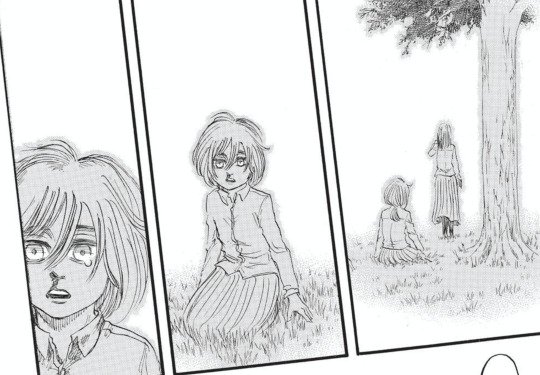
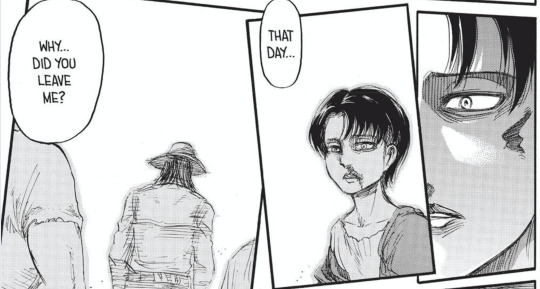
Both characters, although experiencing different forms of deprivation initially (Physical vs. Emotional Nourishment) were abandoned at crucial moments in their lives - when they were looking for validation from their primary caregivers and the people who should have been responsible for demonstrating affection. Historia was abandoned when, after reading and taking onboard information she read in books just like her mother, she reached out to hug her, and Levi was abandoned at the moment he demonstrated that he’d absorbed everything Kenny had taught him. The parallel between these images is very powerful.
Kenny is a character that highlights more parallels between Historia and Levi.
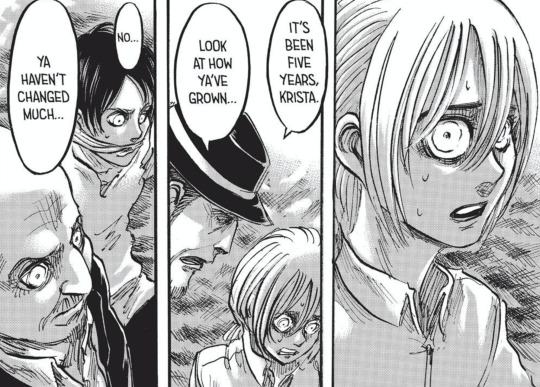
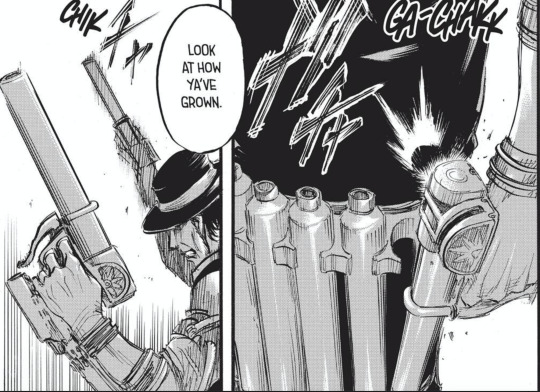
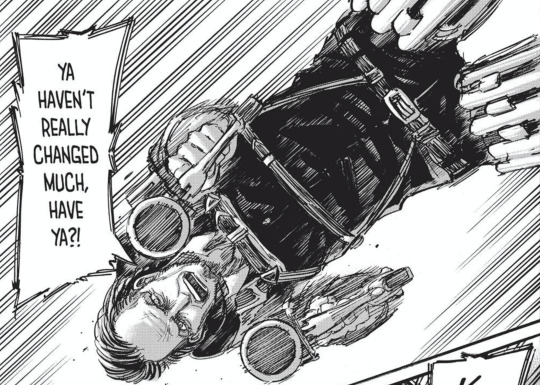
Kenny’s words highlight the literal lack of growth in height for both Historia and Levi - both are particularly short, and also look youthful - but we can also take the words to suggest that the characters are still very much defined by what happened to them in their pasts, and have yet to step away from their demons and achieve closure on what has happened to them as children.
At this point, we can definitely say that Isayama has chosen to tie both Historia and Levi’s stories together through their childhoods - their backstories are revealed alongside each other, in the same arc of our story, and in terms of experiences, they are both identical and mirror opposite at different points.
2. Shared Values
Despite being deprived of affection for large portions of their childhoods, both Levi and Historia appear to have experienced glimmers of kindness in their darkness as well, and this has shaped some of their values and behaviours.
Levi experienced his mother's love for a short while until he lost her - we know how deeply she cared for him from her refusal to give him up despite Kenny’s advice to her when she fell pregnant. Historia had Frieda’s kindness instilled in her, even though she's not able to consciously remember her actions until later.
Both display an affinity for animals, with several manga and even anime-only scenes where we see them being affectionate and kind to their horses. We don’t see this as prominently with any other characters.
But one of the biggest shared values is their desire to protect children.��I've posted on this before, but here are a few examples of Levi being driven by this value:

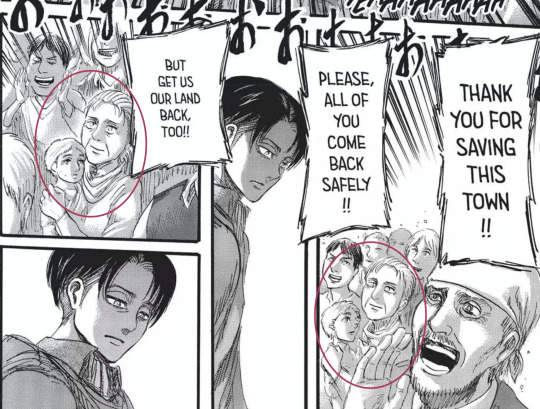
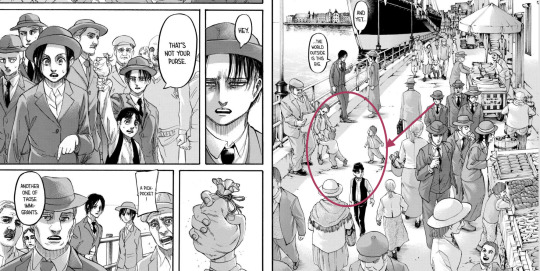

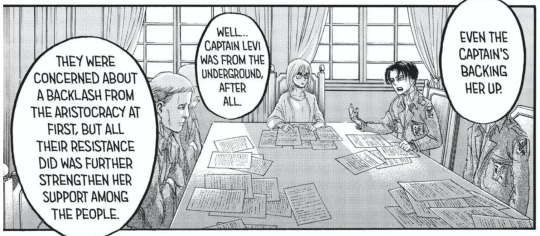
It’s clear Levi has a soft spot for children. And Historia? We know her feelings on children from her first action as Queen - realised with the support of Levi.
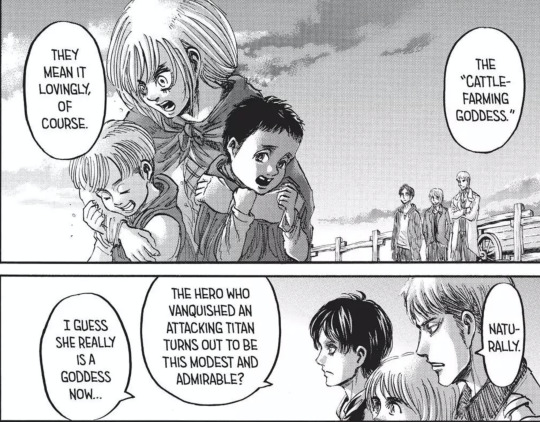
3. Kenny’s failure … Levi’s success?
These next scenes we’ll focus on represent the moment that Levi and Historia are set up to undergo that ‘growth’ Kenny was referring to earlier in the uprising arc. Note Isayama’s choice of words here, and the symbolism of the whole scene. Kenny doesn’t tell Levi, ‘I couldn’t be someone you looked up to,’ or ‘I wasn’t fit to act as your father figure,’ he literally says ‘I can’t be some kid’s dad.” What does he do then? He shoves the titan serum at Levi.
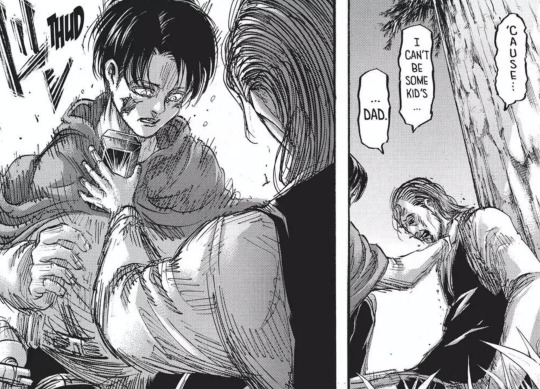
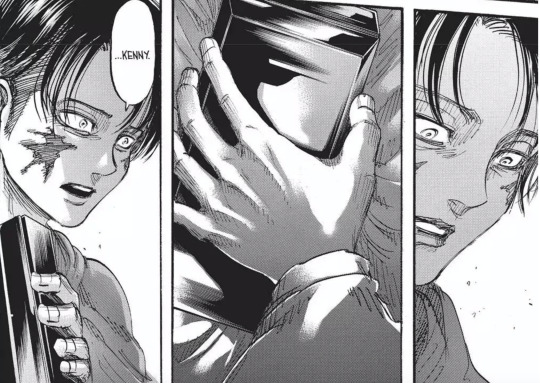
Isayama pays great attention to this - dedicating several panels to the weighty moment, and Levi’s expression. It’s very dramatic. Notice how the word ‘Dad’ even has it’s own speech bubble. It’s almost as though Kenny is passing the mantle on to Levi - passing that responsibility on to him. It feels as though the passing of the serum replaces the missing words, ‘but you can.’ Isayama didn’t have to have Levi ask that question in the moment before Kenny passed the serum on to him. He could have positioned it so that the discussion about dreams was the precursor to the serum being passed over - which in my head, for the context of the scene, would make more sense. But he didn’t; he chose to have Kenny say that exact line to Levi - to admit his inadequacy as a father figure, with that focus on the word dad - and then hand the item over to Levi.
By itself, the scene could be seen as highlighting the ways that Levi is already a better father figure than Kenny. He has been somewhat paternal in his role as a Captain. But it’s the very next scene that brings Historia immediately into focus.

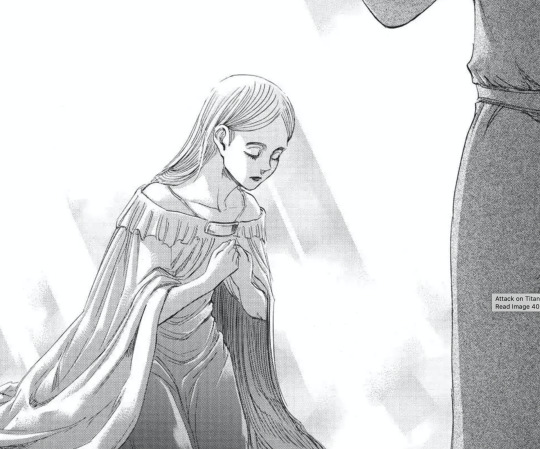
Historia looks suddenly so much maturer here, and the way the scenes sit immediately after one another feels too much like foreshadowing.
If you want the full effect of what I mean here, just rewatch this section of the anime!
We are presented with parallels between them once again. The focus of the crown and power of the monarchy being bestowed on Historia parallels the gift of the serum from Kenny to Levi - drawing on the ‘titan science’ element of the Ackerman heritage, perhaps?

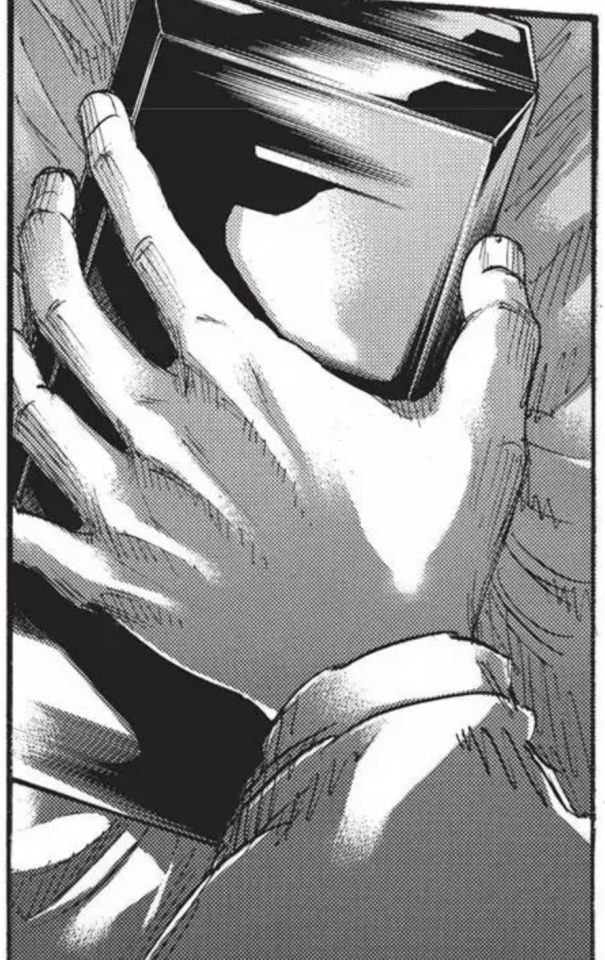
Let me take a moment here, while we have these two visual representations of the Ackerman and Royal bloodlines side by side so perfectly, to point out that Isayama chose to answer a question in Bessatsu Shonen Magazine regarding the nature of a child born of both these bloodlines in 2018:
Q: If a child were to be born between two people from the royal family and the Ackerman family, which blood would take precedence?
A: I think that both [of their bloodlines] would be reflected.
4. Blood Lines, Identity and Destinies - the Acker/Royal connection
We are still missing some information about the Ackermans, and Mikasa’s own Ackerman powers and behaviours have been a focus in recent chapters, prompting more questions. This suggests that the role of the Ackermans will be important in the story’s finale. With that said, lets have a look at what information we have about them so far in relation to the Royal Family:
- They worked closely with the Royal Family at one time, even being described as their sword and shield until they fell out of favour.
- They cannot be controlled by the king’s vow or have their memories tampered with. For this reason, they became enemies of the crown and the two bloodlines became at odds with one another.
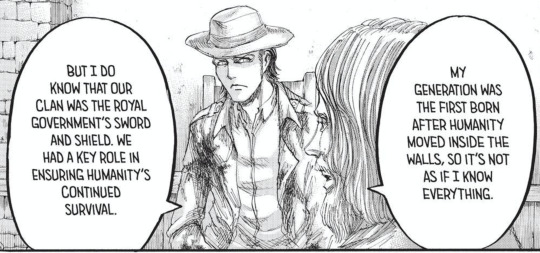
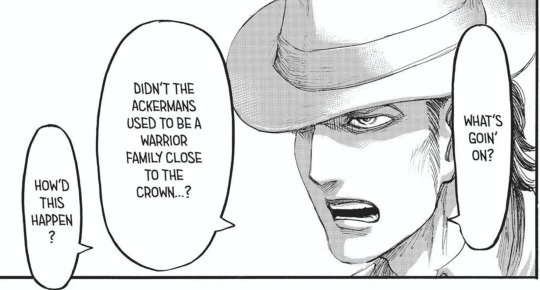
Do either of these scenarios sound familiar in a romantic setting? The knight and princess trope has been hugely popular in fiction for as long as stories have been told - Lancelot and Guinevere is a well known classic. And two feuding families finally brought back together through love by the younger generation? Romeo and Juliet, anyone?
Okay, so maybe I’m reaching here. But Isayama has opened the discourse around this connection between the two bloodlines without concluding it, so I am certain it will have a part to play in upcoming chapters. Why create two characters from said bloodlines with such satisfyingly parallel but awful childhoods, if not to use them in some way to conclude this part of the narrative in the future?
5. The Beast Titan.
Another common plot point that Levi and Historia have is Zeke. The Beast Titan is a defining element in both their arcs. Levi is driven forward by his vow to kill Zeke, and this is repeated to the point where we expect this to be realised, or at least to see some satisfying resolution between the two. Historia’s situation is defined by her vulnerability to being turned into a Titan in order to consume Zeke. This threat to Historia’s life as a normal girl is also repeated across the later story arcs, just as Levi’s vow and apparent destiny to face off again with the Beast Titan is. If we link back to the knight princess trope, we could suggest that Historia is the metaphorical princess, Levi is the metaphorical knight, and The Beast Titan is the metaphorical dragon. The dragon must be slain in order to protect the princess, and the one to do this is always the gallant knight, or the hero. We know that Levi has been labelled Humanity’s Strongest, and even a hero, before.

It has been Levi’s destiny from the start. What's more, what is the crux of Zeke’s plan for Eldians?
Euthanasia by preventing reproduction. Zeke’s ideology basically directly opposes the values of Levi and Historia - who wish to save as many children as possible.
6. The Smile

If there is one scene Levi fans lost their heads over, it’s this one. The Smile. Who was responsible for getting the sullen Captain to smile? None other than Queen Historia. The one time we get to see a genuine smile from him, in all 131 chapters of SNK, is when Historia playfully punches his arm. I think by this point, it is absolutely fair to say that Levi has a soft spot for her, although I’m not suggesting this is anything romantic at this stage due to her still being a child. What else is interesting about this scene? Let’s look at it from Historia’s point of view. She’s still a 15 year old girl. I’m hardly suggesting she’s got deep, meaningful feelings for a Captain so many years her senior. What I am suggesting, is that clearly there is the beginnings of her seeing him in a different light, and feeling some sort of fondness towards him too. This is also the stereotype of innocent, youthful infatuation - how many times have we seen teenagers play-fighting or bantering with the object of their affections? Something might just be stirring in Historia towards the Captain as she begins her transition into adulthood.
7. THAT (deleted) Scene
Okay, so we can’t very well talk about the smile in the context of this topic without addressing this scene:
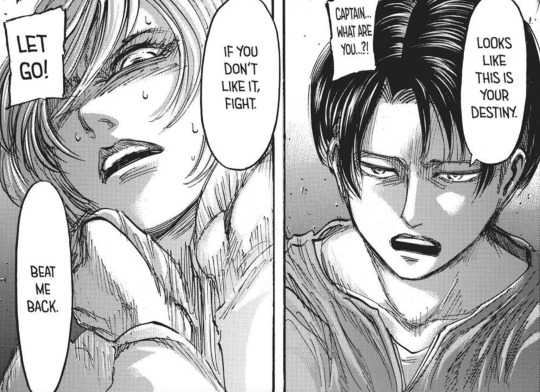
There were a few scenes cut to make the uprising arc in the anime more streamlined. This is one of them, and again, has been one of the most talked about. People either love or hate this scene. In the manga, it absolutely sets up some major character growth for Historia, when she goes from being scared and allowing Levi to threaten her into taking an action, to standing up to him atop the wall at Orvud district, throwing his own words back at him. In contrast to Historia’s willingness, Levi becomes more receptive to her perspective and backs down, which also shows his growth. (More on that shortly!)
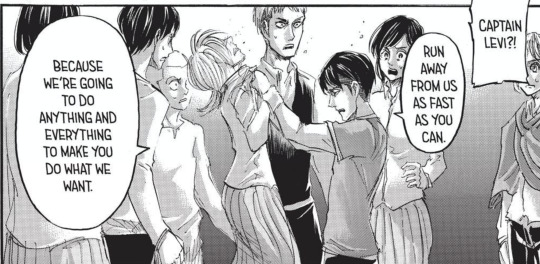
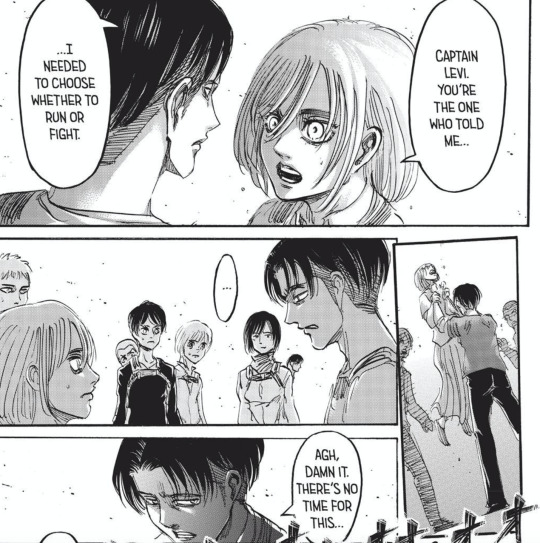
So, if it adds to the narrative around Levi and Historia, and is a key part of their development as characters, why did Isayama let the studio remove it? It must be because their influence on one another’s growth is no longer important to the story, correct?
If you ask me, that couldn’t be further from the truth.
Isayama has stated there were some elements of Uprising that he was unhappy with. Just, for a moment, think how this scene would fit into the bigger picture of a relationship (whether that be deeply platonic or even romantic) between Historia and Levi. Could people get behind that knowing that once, he handled her so roughly? Does keeping this scene as canon for the anime open a can of worms in terms of what is and isn’t acceptable (even more so than the age gap already does) when it comes to a relationship? Could Isayama be seen as glorifying abuse and suggesting that female characters are likely to develop feelings for men who have treated them so poorly in the past? I completely understand Levi’s reasoning for acting this way in this scene, and I loved the set up and pay off later in the arc. However, I do believe that animating this, and then having them become much closer later in the story, could make a backlash likely.
My conclusion to this particular section is - if their influence on one another as characters was unimportant, and the payoff of them reaching a stage where they bring out the best in one another wasn’t relevant to the rest of the story, then The Smile shouldn’t have made it in, right? So much of the set up was removed that it would have been far easier to scrap the scene than to try and figure out another reason for Historia to punch Levi, and make him smile.
That punch was important. It remains for a reason.
8. Levi’s Echo
So, since we discussed the impact of Levi’s words on Historia in the previous point, and how Isayama uses them to illustrate her character growth, let’s jump ahead all the way to chapter 130. We’re now post time skip, where Historia is nineteen. She’s matured now into a young woman - a woman old enough to acceptably conceive a child. This is the chapter which caught everyone’s attention due to Historia’s words to Eren regarding the idea of said child. But first of all, I want to focus on a scene which appears a couple of panels before her question:
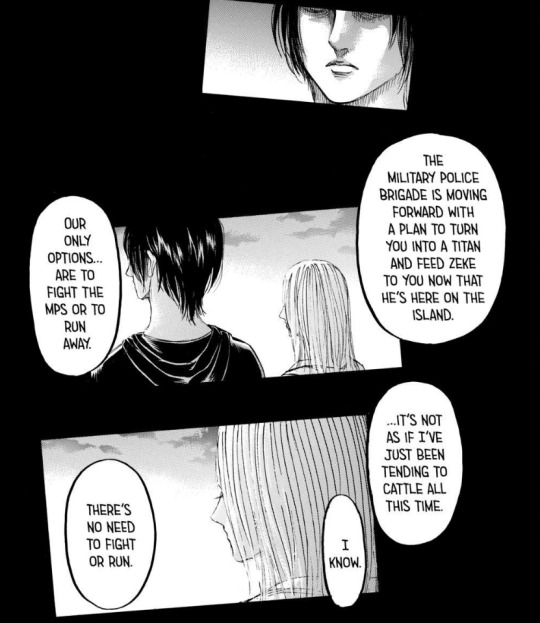
‘It’s not as if I’ve just been tending to cattle all this time.’
What does this line mean? The only thing we know in terms of what Historia has been doing in the time skip is that she set up an Orphanage that Levi was also very much invested in and supported her with. So she’s not only been tending to cattle, but ... tending to orphans? With the Captain’s help?
Remember how we said that Isayama doesn’t include subtle details unless there’s a reason. Having Levi support her with the orphanage as a way to show how much he cares about the poorer children wasn’t needed - we already know from several instances discussed earlier that he cares about that topic deeply. So surely this must have been a small detail to set up for a later reveal?
This line alone is interesting, but not necessarily enough to suggest a big influence from Levi. But it’s the next line that grabs attention:
‘There’s no need to fight or run.’
What does this echo?
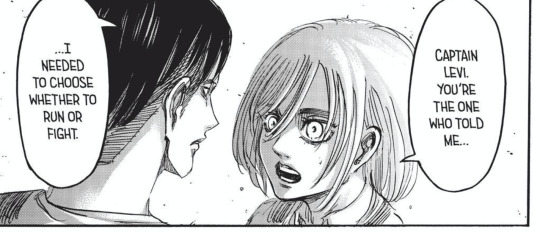

In my mind, the reason served by this dialogue in 130 is twofold. It works with both the literal events of the deleted scene, and also with the reader’s knowledge that the scene was disregarded later:
1. There is no reason to run or to fight, because Levi is on her side now. When he originally spoke those words to her - run from me or fight me - they were used in reference to what he and the corps were going to make her do - ie, become Queen. Now, they are not forcing her to do anything - they aren’t making her comply with the 50 year plan of producing as many royal children as possible and turning herself into a titan. Instead, she’s empowered by them, and very importantly, him, to make her own decisions while they try to figure out an alternative. (Why do I say him? I’ll cover this in the next point). And yet ... she still chooses to bear a child. A child born of love, not necessity. This is the difference between the birth of her child, and her own birth. And funnily enough, Levi’s birth, too.
The cycle of history is being broken.
2. Her words serve as a reminder that in the revised version of events, Levi never even forced that choice upon her in the first place. He’s always been her ally and treated her with care and respect. Even more reason for her to value and care for him in return. There really is no need to run or fight - from the military police, because she will bear a child, stopping them from turning her - or from Levi, either.
9. The Hooded Figure
As promised, let me explain why I say that Levi empowers Historia (yet again) to make her own decisions. My good friend Key made a wonderful discovery regarding the hooded figure panel, and honestly, based on the evidence I’ve seen, I’d be prepared to bet a whole lot on this next claim:
Levi is the hooded figure who warned Historia of the plan to turn her.
I’ve shared Key’s original post previously, but here’s the gist, with some added observations.
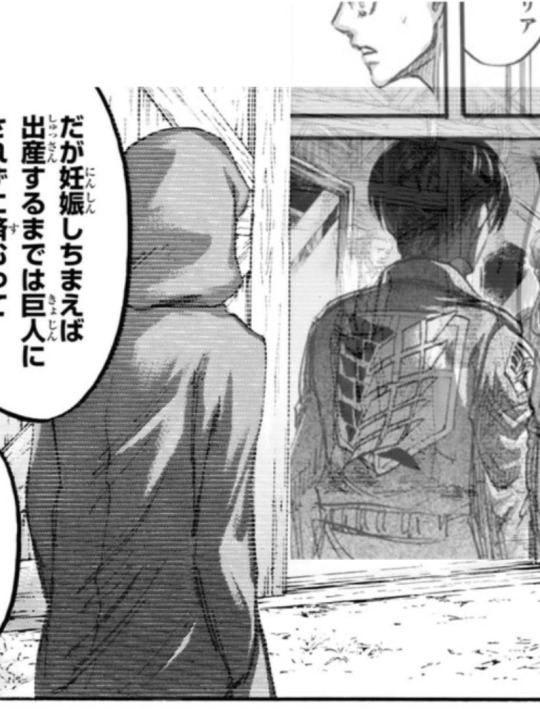

Levi from the hallway; Levi from that iconic scene, fits the dimensions of the hooded figure perfectly, without having to adjust the panel sizes.
The jacket worn is lighter in colour than Eren’s standard black one, but is reminiscent of the jackets worn by the Levi Squad in the uprising arc. The only other clue we’re given to work from is that the figure has their hands in their pockets.
Hmm ... you know who else has a habit of stuffing his hands in his pockets?
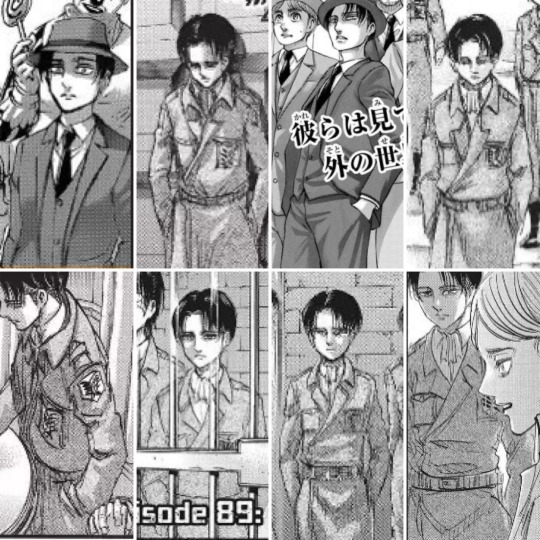

So if Levi is the one who warned Historia, is that why she subtly uses his words when talking to Eren?
Let me return to chapter 130 once more, and just invite you to read the following panels from a different angle.
10. Mikasa-Eren/Levi-Historia Parallels
Alright, so this is a bit of a head-mash, but just consider what I’m about to say. In our panels with the Historia-Eren-Zeke conversation, Mikasa is never mentioned by name once. Zeke mentions ‘this Ackerman girl,’ however there is no confirmation that Eren was in fact talking about Mikasa when he asked Zeke about the Ackerman traits ...
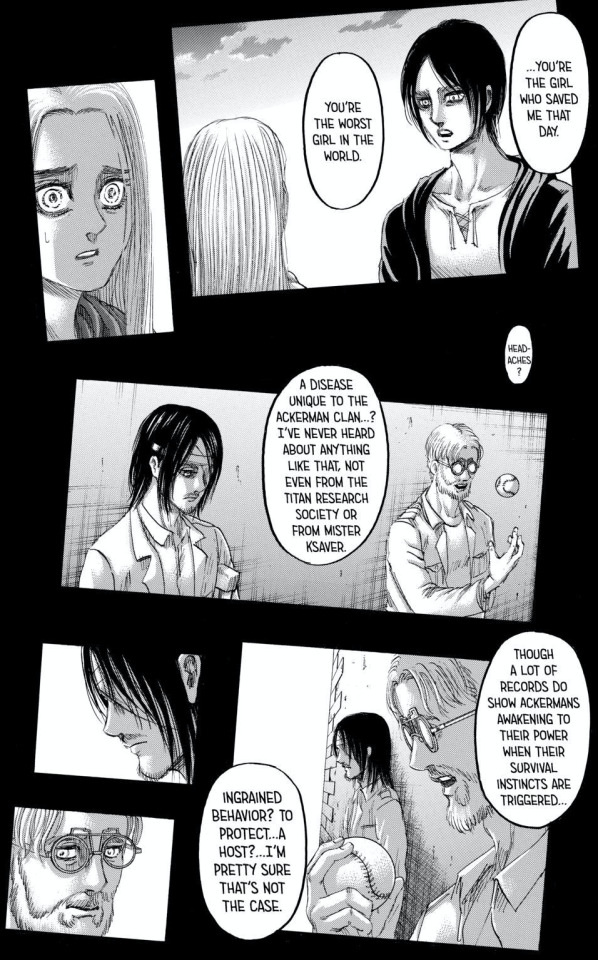
Isayama only shows us the conversation with Zeke after Eren has just spoken to Historia about her fate and what the Paradis government want her to do in terms of bearing children. If these are just all memory fragments of Eren’s, why would discussing this with Historia suddenly make Eren think of a conversation about Ackerman traits with Zeke?
In this conversation, Zeke puts two and two together and gathers that Eren is asking these questions because of Mikasa. He then tells him how much Mikasa obviously cares about Eren, regardless of any ‘ingrained behaviour.’ What does Eren then link this with?
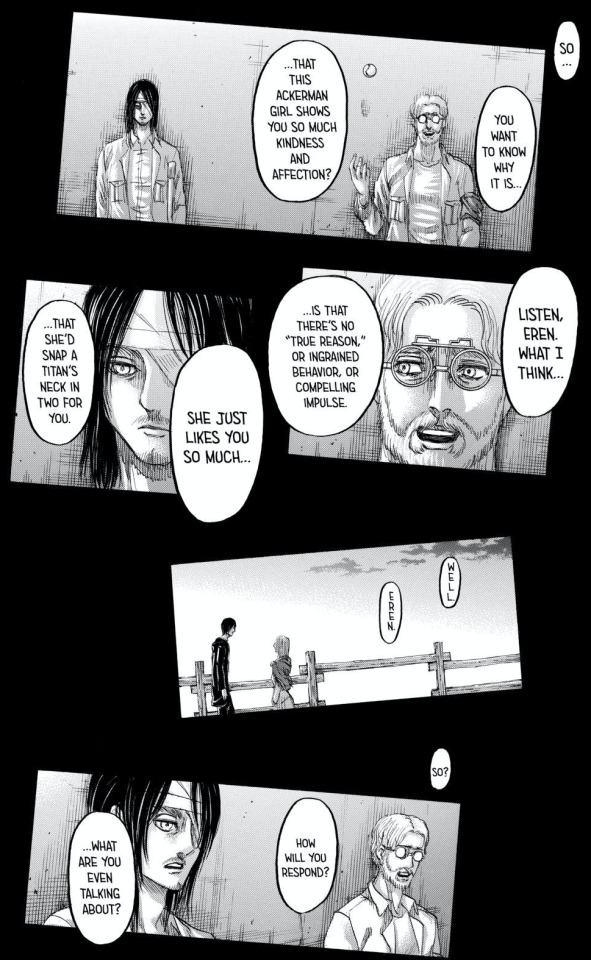
The conversation where Historia asks him what he’d think if she was to bear a child. What does ingrained Ackerman behaviour and Mikasa’s true feelings have to do with Historia’s child?
I want to suggest this possibility: this conversation has nothing to do with Mikasa’s feelings for Eren, and everything to do with Levi’s feelings for Historia.
Eren even confirms that Zeke has the wrong end of the stick with asking him how he will respond to Mikasa’s feelings.
What are you even talking about?
Here, he is not considering how he will respond to Mikasa, because he can’t even contemplate that with what he is about to do, and how long he has left to live (although this may have then prompted his later conversation with Mikasa after the market - where he sees Levi save the boy that he will later kill - do you see how this is all linking together?)
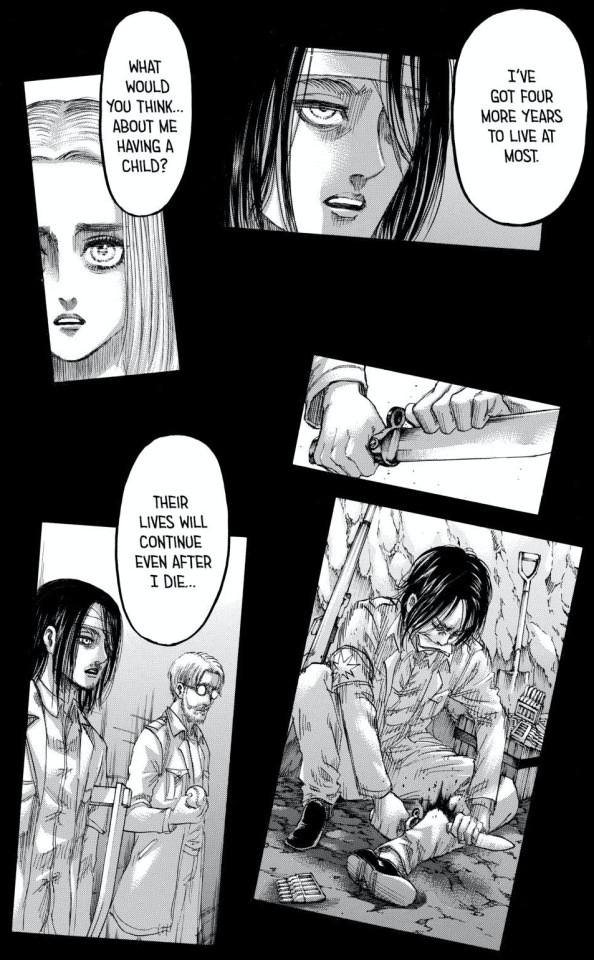
Here he means the lives of Historia, her child, and potentially even Levi, as well of course as Armin, Mikasa and the rest of his friends. Want to know why I think that? Isayama hinted it. Again.
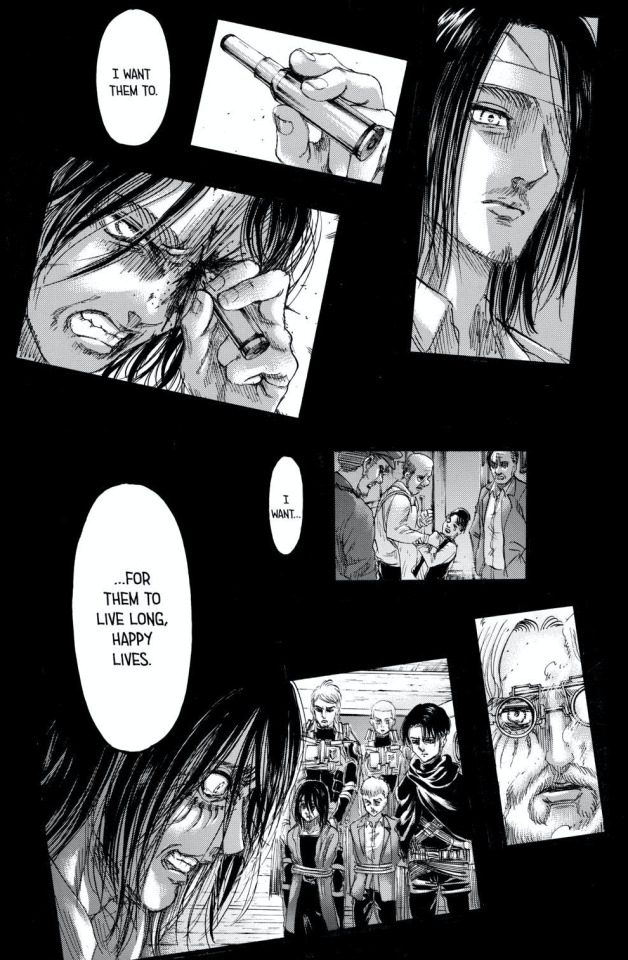
We have the image of Historia, suggesting the idea of bearing a child, followed by the image of the child Levi saved, followed by the image of Levi himself.
Isayama draws every detail in every panel for a reason. If part of his conclusion to this manga involves Levi and Historia intertwined and the birth of an Ackerman-Royal child, it won’t be a massively random idea.
It will contribute to an ending where the clues were there all along, but we never really considered them.
(There’s more, so much more, but I have to stop somewhere or I won’t leave my computer. If anyone wants a part two because you’re thirsty for more of this crap, drop me a comment!)
#Shingeki no kyojin theory#attack on titan theory#snk manga spoilers#historia reiss#Levi ackerman#Historia dad theory#Historia pregnancy#royal Ackerman connection#snk chapter 130#snk theory#aot theory
293 notes
·
View notes
Text
Eugene Onegin: Finale Analysis
*apologies in advance for a LONG POST! any TYPOS! and also that the Russian has been latinized (is that what we say?)*
I have often read opinions and observations about the finale of Eugene Onegin along the lines of “there’s no new theme;” it’s “not as intense as the Letter scene;” it’s “anticlimactic...” etc. (those last two comments are found in Eugene Onegin: The Opera Lively Guide by Luiz Gazzola).
Clearly, these are just opinions and I’m not here to disprove anything... but I am here to retaliate with a whole lot of love for this particular 14 minutes of music so buckle up :) I’m going to try to mainly be objective here and just offer my observations/analysis. Maybe you’ll find some newfound appreciation along the way...and please pitch in if you have your own comments or have noticed things I haven’t necessarily picked up on!

Before we start, you may want to pull a recording of the finale (this one is my favorite of course), and potentially your favorite CD/recording of Eugene Onegin, if you want to listen along and compare. If I had more time and skills I would have done this for you in a video or added trimmed audio bits throughout this post but alas. Maybe one day! For now, enjoy these screencaps from the 2007 Carsen production at the Met with Fleming and Hvorostovsky.
1. Gazzola points this out in his book - and thank goodness, because I’m not sure I would have made the connection myself. The final scene opens with a motif that is more or less a repetition of Gremin’s theme (in rhythm, at the very least), “Lyubvi Vsye Rozrasti Pokorni/Love conquers all ages,’” foreshadowing Tatyana’s decision/steadfastness to the mature, stable love or contement, or whatever we want to call this - we can have an analysis of ‘love’ in Eugene Onegin in another post! Already I’m thinking back to the opening of the opera when Larina and Filipyevna sing in unison “Privichka svishe name dana, zamyena shchastiyu ona / Habit is sent us from above in place of happiness.” Tatyana’s mother used to read and dream like Tayana herself and was even in love, but eventually had to marry someone else and “became resigned and settled down.”
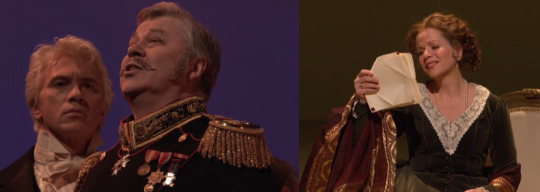
And as @lizlensky recently reminded me, of course Filipyevna did not get to marry for love either, not that Tatyana was really listening to her story. In fact, maybe I’m looking far into deeply, but it seems to me the strings underneath this “Gremin motif” at the opening of the finale and also when Tatyana eventually sings to that tune “Onegin, ya togda molozhe/Onegin, I was younger then” are also mimicking the strings underneath Filipyevna when she sings the morning after the Letter Scene, explaining how her mind is getting older and reflecting upon her youth (I’m generalizing a bit - Tatyana certainly isn’t complaining about having an old brain but she is thinking of the past). Make of that what you will! But it gave me chills.

2. Oh no, I’m already getting ahead of myself though. Before Onegin even comes on the scene, we also hear what some call the “Fate motif” but what I prefer to call the “Dream motif” (if it is fate, why does it follow Tatyana all over dreamy Act I but disappears except for this tiny reminiscence? But of course, up for discussion as it’s the prelude/introduction to the opera, and it comes back when Yevgeni does, haunting her like a ghost, which I suppose is fate-y). Here it is again when Tatyana sings “Kak budto snova dyevochkoi ya stala/It’s as if I’m a young girl again” - which is then followed by what I might personally call the fate theme, since it foreshadows the anguish Tatyana will face when she is rejected in Act I, and before she rejects Onegin in Act III.
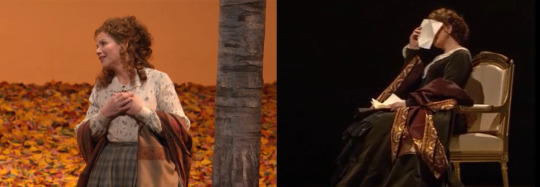
This is where I wish I had an audio clip but I think you know what I mean; it’s the really dramatic climax that comes right when Tatyana enters the stage in Scene 3 of Act III (before “Zdyez on, zdyes on, Yevgeni!”) and right before Onegin comes onstage in Act III, Scene 2. Or ha, maybe this is just “Onegin’s Arrival Theme” since there’s a similar kind of orchestral panic before he arrives in Act I (though of course, not in Scene 1 of Act III since it is Tatyana who enters rather than Onegin who was in the room already, at least in the productions I’ve seen.)

3. Okay, so now Onegin’s here, what does he have to say for himself? We hear a bit of the Onegin aria theme - “Mechtam i godom nyet vazvrata, nye obnovlyu dushi moyei/Dreams and years cannot return, I cannot renew my soul!” as he (in some versions) falls to Tatyana’s feet, exclaiming “O, szhaltes, szhaltes nado mnoyu!/ Have mercy on me!” Clearly has some srs regerts. But also perhaps Tchaikovsky foreshadowing what is to come... not only that we shouldn’t expect Tatyana to act with any less honor (or prudence/reason) towards Onegin as he did towards her in Act I, and that indeed she sings “proshlogo nye vorotit/you cannot bring back the past.” I know I’m grinding a lot out of this particular moment, but... would you expect anything less from me? Or (thinks of Petya) HIM? :)

4. As Tatyana reminds Onegin how he rejected her and begins to question why he is suddenly in love with her now, we get to revisit some of the music from the Letter Scene - at least in the orchestra. Tatyana’s line differs slightly than her original melody in the Letter Scene when she sings “Togda, nye pravda li pustine, vdali ot suyetnoi molvi/There in that backwater, far from vain society” - and just so, as it is far from its dreamy, romantic parallel in her letter - “Y v eto samoye mgnovyenye ne ti li, miloye vidyenye/And in that very moment, wasn’t it you, beloved vision [...who whispered to me words of hope].” I find this throwback incredibly clever and gutwrenching, as I believe it’s clearly a bitter and ironic jab at the hope that Onegin crushed, even honorably as he did, and now the two of them have changed positions. Whose dreamy hopes (which are... questionable at best at the moment) are getting schooled now? Cmon’ Onegin, “learn to control yourself....”

5. Let me take a moment to admit and agree with many analyses/critics (although Tchaikovsky knows what he is doing, convince me otherwise) that Onegin is pretty fragmented and lacks a coherent theme, and certainly has no original “love theme” of his own to offer Tatyana - after all, Onegin as a character, especially in the book, is pretty hollow, someone who isn’t so much a “self’ as a person who knows how to go through the motions of life... He’s intelligent but not creative, full of potential but lacking any real direction. (Ohhh I am going to cry because that’s so sad but also so relatable, but crying is coming up next so I’ll hold off). The opposite of Lensky’s “poet spirit” that lives life romantically, and is in love with life itself, seeing the infinite everywhere rather than seeing life so pessmistically (with the mask of pragmatism/”maturity”) as Onegin does, a mask that keeps Onegin from truly engaging with life or his own sense of self.
So as Onegin sings, we hear that lack of originality, though I will pull a Valery Gergiev here and say one “cannot be impartial” to Onegin’s music here (*clutches chest - that’s Tchaikovsky, even though I think it’s clear Onegin is not his fav) - Onegin may not be original, but there is no less truth or heartfelt emotion in what comes through. Luckily, Tatyana knows that it’s still not a good choice... he’s still not very substantial, at best, and at worst truly is only infatuated with her because of her reputation. It would mean ruin for her either way so :( (read: Anna Karenina) (here are some sad Onegin pictures just for fun because it’s all been Tatyana mainly but also: sorry this is Tatyana’s big moment so)

6. Time for tears! Do you hear a familiar theme when Tatyana sings “Ya plachu/I’m weeping?” It’s Lensky’s aria theme making a comeback- what!??! And particularly, the same melody as these two phrases, when Lensky sings: “Shto dyen gradushchi mnye gotovit/What does this day hold for me?” and perhaps more salient to this moment: “Pridyosh li, dveya krasoti, slezu prolit nad rannei urmoi/ Will you come, maiden, to shed a tear over my untimely urn?” Ahhh, I see what you did there, Petya.
But wait, Onegin hates crying! This isn’t explicitly in the opera of course, but Onegin in the novel all but tells Tatyana that her tears (as he rejects her) only vex him - another reason marriage would be a torment for them (not a bad reason and look, we always respected his honesty, right?). But now? I think it’s a crucial moment; it shows there has indeed been some development on Onegin’s part and uh oh, he’s actually in love (ironically in a very Lensky - that is, poetic - way) even if it’s not for the best of reasons.

7. Fun (pain) pact: “Tak blizhko! [happiness was] so close!” is the only time Onegin and Tatyana sing together or are on the same page, so to say. Nice. (*cries*) The only other times people sing completely lined up together like this in this opera, choruses aside, are when:
Larina and Filipyevna sing “Privichka svishe name dana, zamyena shchastiyu ona /Habit is sent to us from above in place of happiness” in the opening scene
Onegin and Lensky sing “Nye zasmeyatsa l nam, poka ne obagrilasa ruka, ne razoitis li polyubovno? Nyet... /Shouldn’t we burst out laughing, rather than staining our hands with blood, shouldn’t we part as friends? No...” before the duel
Moments of truth. And mostly pain. :) Again, please chime in if there are others, I’m sure I’ve missed something.

8. Time for Tatyana to refuse! This is where I completely disagree that there is “no new major theme” in the Finale; Tatyana’s “rejection theme” holds its own in my books. Interestingly, it’s in D-flat major, just like the main themes in her Letter Scene (”Puskai pogibnu ya/Let me perish,” and “Kto ti? Moi angel/ Who are you? my [guardian] angel..” aka the descending/Russian 6th theme). Tatyana is just as earnest/decided/resigned* (yes, all three of those adjectives) in her decision in the finale as in the Letter Scene, so maybe that has something to do with it. (I always remember her words in the Letter scene: “Uvi, nye v silakh ya vladyet svoyei dushoi!/Alas, I am unable to subdue my soul!” but just like Onegin learning to be endeared by tears - she has indeed learned to subdue her soul, or perhaps she has simply matured and her priorities have changed. (And of course, who lectured her to subdue her soul in the first place, even though he meant well? Yours truly!)
*resigned might seem an interesting way to describe the Letter Scene, but don’t forget “No, tak i bit! Sudbo moyu otnine ya tebye vruchayu/So be it. Henceforth my fate belongs to you....” I tend to interpret that as Tatyana actually taking her fate into her own hands and deciding to go all in with her decision, despite the words that seem to make her position passive. In the finale, she is ‘resigned’ in a similarly active manner - this is not a passive resignation. But I still would use the term resigned, if only to draw the parallel between Tatyana and her mother.... “I became resigned and settled down.” And so she has, even if she has to struggle to push Onegin away from the settled life she has, loving him all the same.
And in comes some of my favorite music of all time - Onegin’s desperate, even malicious pleas and a good dose of mansplaining how Tatyana “can’t” abandon him, quoting back her letter. Extra ouch, because do you remember in Tatyana’s letter when she tells Onegin if he has any pity, “vi nye ostavite menya/you won’t abandon me.” And what does she have to beg him to do over and over until she finally runs offstage? “Ostav menya!/Leave me!” heheheheh *laugh-cries* everything is fine.

9. And we’ve nearly reached the very end. Almost a year into listening to this particular piece of music and I only recently realized what was going on - yeah, I know. When things get really heated at the end and pain reaches a maximum, Tatyana sings “Gluboko v syerdsta pronikayet, yevo otchayanni priziv no, pil prestupni podaviv/His anguished cries penetrate my heart, but the fire of passion has been extinguished” (well, I’m still not quite sure on the ‘correct’ English translation but it doesn’t sound good for Yevgeni regardless...)
That melody in that last line calls us back to its twin sister at the end of Scene 1 in Act I when Onegin is talking about how bored he was with his uncle, waiting for him to die. So a) I hear this as Tatyana “ending things once and for all” (parallels between the death of Onegin’s uncle, and the death of their relationship), as well as possibly (again I read 10,000% too much into things) b) Tatyana realizing that Onegin’s words to her back in the garden were true - habit [routine] would kill their love; they would become bored (or at least he would). The passion would burn out.
Which brings us back to c) heaven sends us habit in place of happiness [=passion?]- which, OH, RIGHT, OF COURSE has the same rhythm of the aforementioned “boredom” theme and “the fire of passion has been extinguished.” But you all probably already realized that because oF COURSE.. that’s how the opera OPENS... and now how it is CLOSING... AHHHH!!!

I know I’m not original or anything for realizing that parallel, but yeah. I’m pretty happy about it.
Tchaikovsky is absolutely genius. Unbelievable. And paired with Pushkin? I’m not surprised I’ve clearly lost my mind over this masterpiece.
Anyways, this was an extremely long post but I hope you enjoyed it immensely, especially if you read this far!! Please chime in with your own comments! I LOVE THIS PIECE OF MUSIC!

#wow people are gonna hate me if they track any of these tags :) at least you can push the 'this post isn't for me' button#long post#eugene onegin#tchaikovsky#opera#that was 2000 words everyone thanks for reading and no offense if you didn't#writing tag i suppose#myedits: stills
40 notes
·
View notes
Text
One of my most favourite confrontations between Mahidevran and Hürrem in the series is the one after Mahidevran sent Olga to Süleiman in episode 61. It's both fun, yet filled with meaningful character dialogue, managing to successfully deliver a thematic message that eventually finds its retroactive way, despite of it all seeming like a yet another smackdown fest by Hürrem at first.
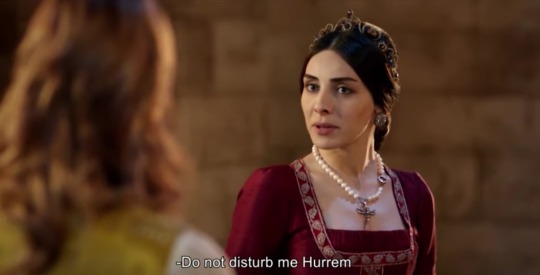
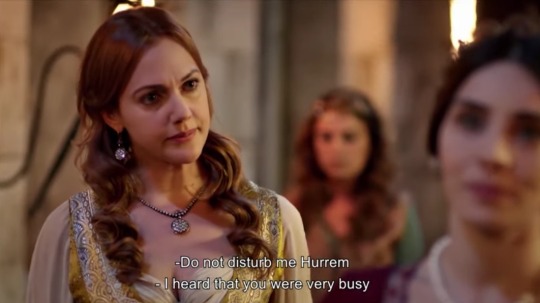
The scene begins with their typical confrontational energy, the rivalry chemistry immediately paves its way forward. Hürrem is ready to face her for what she did and Mahidevran, while not being interested at first, goes with her flow regardless, setting the mood for what follows.
Hürrem: You've sent a concubine to his majesty.
Mahidevran: I'm replacing Valide. Pleasing his majesty is one of my duties.
Hürrem: Let God not give you other worries. Do you want to cover the lack of your femininity this way?
Mahidevran seems very engrained in her role as the head of the harem and connects it with her own desire to take revenge for her wounded pride and for all the pain they caused her. The first excuse she finds for sending Olga to SS refered to the rules and tradition that give her that right, but we know by context that there's something else going on, this was both a move driven by her vendetta and a provoked move - she decided to do this after Hü told her she's the one ruling the privy chamber and perhaps Mahidevran accepted it as a challenge to her power, because, honestly, I doubt she would've attempted such a thing if she weren't provoked like this. Hürrem, on the other hand, gives her own "interpretation" as to why Mahidevran took action. To be blunt, it sits wrong with me right from the start, because it demonstrates a huge amount of internalized mysoginy on full display and it's sad, in a way, that this is what the system encourages at the moment - you're nothing if you sleep alone in your bed, if you don't have the sultan's back. There's a glimmer of possibility Hürrem said it only to render Mahidevran vulnerable and one could understand where she comes from, since she has experienced quite a lot of similar offenses from that same person. And when a confrontation of the like occurs, her first instinct is to think of a comeback, to pull rank and highlight why she's better than her like she does in all their encounters in this batch of episodes. That hardly excuses or whitewashes this statement, though, because for a person who has been shown to fight the system and call out prejudice (even though it was mostly only she was subjected to it or it was about something that concerned her specifically), seeing that she had absorbed some of it and applies it without a second thought leaves a sour taste for me.
Mahidevran: Worry about your own problems, Hürrem. Did you really think his majesty couldn't be with other women?
Hürrem: This is impossible.
Two major beliefs of Mahidevran and Hürrem's characters come on the surface: they drive the dialogue and help the rest of the scene unfold the way it did. Mahidevran brushes off Hürrem's last statement and brings back tradition to the forefront, which begins to highlight a belief of hers that she shared with Valide, that there is a constant cycle in the harem that no one, not even Hürrem, is capable to entirely break. To Hürrem it's impossible for SS to ever have other women at this point, it's something unthinkable for her already. She feels she has fully broken that cycle.
This scene, unlike the confrontation in episode 58, has well done retroactive irony while serving the context of the episode it's in in a plausible enough way that doesn't seem showed in just for the sake of it. The context of the episode puts Hürrem in the right by showing Olga returning from SS's chambers almost immediately after Hürrem says: "This is impossible." and it's the place where this plot-line transitions to another one, leaving the rest of the confrontation to hang in the balance for a while. Maybe SS had truly given up taking other women ever since the wedding, as shown by this and SS refusing another concubine sent by Valide in the wedding episode.
However, we know that this stops being the case later on and whether it's through the decision to bring in yet another drama tool, yet another annoying stretched narrative opposition in the face of the concubine arcs, it's a fact and we could say that this scene ends up being a good enough framework to set us up for it, intentionally or not.
Mahidevran: Then why is there a concubine in his chamber?
Hürrem: What concubine? Maybe that one?
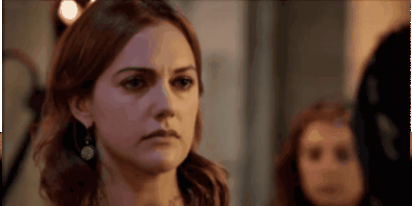
This, to me, is a demonstration of how the tables can turn in the harem at literally any moment. Meryem Uzerli's little amazing, subtle facial expression says it all. When Mahidevran asks the question, we see for a very split second that Hürrem's wondering how to refute her until the concubine appears in the heat of the argument due to sheer luck. Like, if she had already returned to her rooms before the scene occurred, it would've gone much differently! This isn't all that important here, but I love how Meryem showed a slight probability for Hürrem to lose the argument, which contrasts with all her confident remarks before and after this moment. It's just very neat stuff.
Hürrem: Many girls were introduced to his majesty. Among them, there was even a princess. Where are they now? Look around you. You will not see anyone but me.
Speaking of confident remarks, there comes another one of Hürrem's that no matter how many concubines came, they all went and now there is no one other than her. This line further sets a consistent trend of ambiguity, because she's right in the context of the episode and it encapsulates the resolution of these particular plot-lines of Hürrem and Süleiman in the season and we can get behind her words overall both in the arc and in rewatch, in spite of the retroactive irony, but she's wrong in that it's the end of her harem fights, very far from it, as season 3 and season 4 prove. She hasn't completely won yet, even though she sets the impression that she has.
What I also find interesting in this scene is the back and forth throwing of past - present - future between the two sides. They make a perfect showcase of what these characters represent, their states, their losses, their desires, their hopes, dreams and philosophies. Here, in example, Hürrem makes a reference to a part of her obstacles in the past, acknowledging that they were there regardless, but then she immediately goes back to the present with "Where are they now?". Nowhere in the scene she considered the possibilities of the future, the sheer probability that it all may change one day (as it happened, in many ways, through Firuze), focusing on the currently undeniable truth the present day presents.
That same throwing back and forth continues, but with another note which instantly places the two women against each other again:
Mahidevran: I was also loved once, Hürrem. Mustafa is the fruit of that love. Ask Gülfem Hatun if you want. She will tell you how much she suffered because of me.
Hürrem: You always tell this story.
Unlike Hürrem, who only references the past, Mahidevran laments it and takes pride in it, it being the highlight of her once beautiful life. But we know what went down afterwards, adding in the possibility that maybe, it would all be temporary and what one may have now, may change, because Mahidevran was also in Hürrem's position once. Hürrem however, calls out her fixation on the past, in a similar fashion to how she has done it before (E59: "Are you being proud of your past now? Let me remind you: You're still a slave."), what she had doesn't matter, it's the now that is important to Hürrem, which is a solid thematic note to her character arc.
Though, we have this line of dialogue in response:
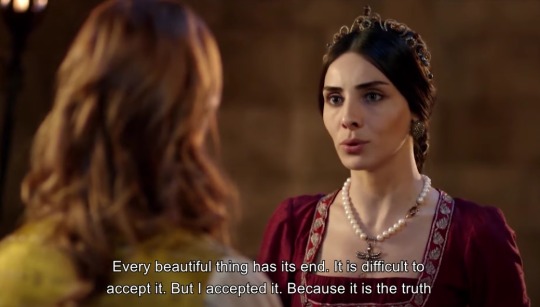
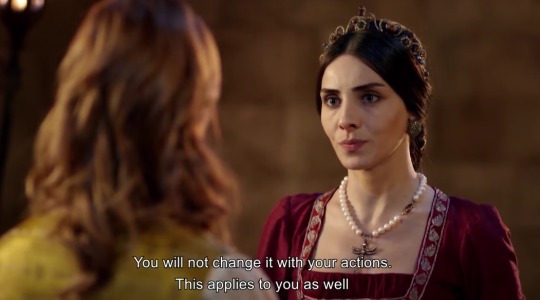
We here notice that no matter how long it took for them to do it, Mahidevran and Hürrem actually had parallel arcs, in terms of letting go of the past. This line makes for such a striking revelation of Mahidevran's emotional state from her perspective that only continued what episode 46 hinted at and episode 55 directly started. (E55: "I ripped out the love I had of your father of my heart, I threw it into the sea! He doesn't matter to me anymore. Now you are the only one in my heart.") It's rather surprising that she says these words now - Mahidevran's rule of the harem is arguably her at her worst, doing what she does out of the last ounces of her wanting payback for the sad, bitter years. It's precisely what she lost that motivated her, that was a sure part of the reason she sent Olga to SS and yet, we have that honest confession, that grasp of acceptance. Mahidevran's battle with SS was lost very early on and it took her very slow and gradual development for her to accept it and by E61, she was doing the last steps to do so. She tries hard to convince Hürrem that no matter how hard she tries, there is a cycle in this harem that cannot be changed, Mahidevran has come to terms with it, so Hürrem has to do the same. In a way, she was probably trying to say that they both have been fighting a losing battle and she expresses a small amount of sympathy over it, too - she knows what it's like and it's hard, but it's like some unwritten law that it's not worth it in the end and that everyone gets affected by it, without exception. That's how she begins to look upon her present and show a hint of the future.
Out of the particular context, this line could be a very nice stronger endorsement of the franchise's themes, because, truly, no one ever got a good, triumphant, heroic ending. And it was like a cycle: everyone had to face the feelings of sorrow, grief and loss, everyone had to suffer in this time period, everyone dies. Gülfem called Hürrem's life a fairy tale in E134, but that "fairy tale" came to an end after her death. And if we leave that aside, there is hardly a breather episode even for the biggest of victories, no matter how many victories you've won, they would always "have their end", the narrative would always condemn them one way or another.
Mahidevran: One day a woman will appear and would destroy your indestructible love!
The future is finally put on the front with the scene overall and with Mahidevran herself. It's a continuation of her belief that Hürrem would be "detroned", regardless of all. Thing is, she also doesn't consider her own future, only the one of her rival's. She believes in her own victory that is opposed in the present, but would surely come in the future, a belief she holds until the end of the series. Even though I doubt the writers planned Firuze's existence right back then per say, this line sounds like such foreshadowing to her in retrospect, which makes Mahidevran both right and wrong with this quote. Firuze caused an actual continuous rift between Hürrem and Süleiman, making her doubt his love in ways she hadn't before. Nazenin comes into the picture, as well. But no one truly succeeds to properly destroy the love between Süleiman and Hürrem and they managed to prevail, despite of all the narrative opposition. She still stayed the most dear woman to SS's heart, no matter what. There is a slight possibility of Mahidevran judging the situation one hundred percent to herself here, claiming rather that the appearance of another woman would make Hürrem fall out of love with SS and destroy that, instead, just like it was with her, but since Mahidevran called the same line back during the Firuze episodes, I think she was referring to the rift Firuze would cause and how would Hü fall deeper and deeper.
Hürrem: Mahidevran, don't think of me as your equal.
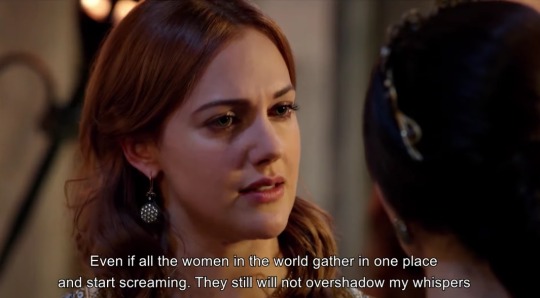
This line is very telling in that Hürrem considers herself different than everyone else. It has always been a part of her character, perhaps a running reminder of her unprecedented elevation in the system she's telling us about through words. And most of the interpretations I've encountered of this line are exactly this: it is epic, badass, it is delivered in such a shading sassy way that could only be respected or applauded. However, it is just as possible for this infamous one-liner to be presented as the culmination of not only her persistent insistence to assert herself as different and special, but her continuous unwillingness to be compared to anyone else in the harem. And usually she's compared to guess who? Mahidevran. She doesn't want to even think of the possibility to be compared with her by this point (starting from E40 where after she was freed, she said: "Now I'm not equal to you." right to Mahidevran's face and continuing forward into S03 with: "I told you not to compare me to others, to Mahidevran never!" -it was something like that), but at first, which is now probably buried deep within, she feared becoming like Mahidevran. She repeated "I'm not Mahidevran!" when she was out of favor like with the Russian concubines, Mahidevran's words that she would make the same mistakes she did echoed in her head during the Isabella arc in episode 31 and earlier had a nightmare of Süleiman giving the emerald ring to Mahidevran instead of Hürrem in a completely parallel scene. (there's also the other nightmare where Mahidevran was taunting Hürrem to tell her about Leo.) Hürrem dreaded all of those things happening and tried her very best to avoid the very thoughts of it. Now, in a season nearly full of victories in her part, she had gained the belief that whatever happens, she'll always stand above the others. She wants to give off the vibe that no one would ever stop her. She has broken so many traditions and the narrative is currently rooted at her favor, all well and good, right? This line could be a mask, in a way, hiding the fear of being rejected just like the others (that doesn't completely disappear, seeing her suicide attempt in E72; also E106's menopause plot.) and striving to leave it behind her, now reaching its peak by putting not only Mahidevran, but the rest of the women into the picture, without a second of realization of the implications it causes, because well, who else was given such special attention by the Sultan? Who else was freed, who else had such a marriage, who else got out of death's door so many times, who else overcame everything, who else had a chance to "rain as fire" over all her enemies? Even though the quote applies on a much grander scale in execution, in later seasons and the way it got called back to in MCK, I feel, in this particular context, it refers to the harem and Süleiman specifically - his majesty doesn't need any other women, there is no such woman that could take away what Hürrem has and even if they stand together, they wouldn't stand a chance, because Hürrem is that massive and powerful.
The retroactive irony hits hard and here: she's right in the events of this particular episode, but the subsequent events definetly tell a different story. Hürrem's influence and power is acknowledged, especially in her last episodes, but that she's the only one capable of having such power is not necessarily true, given the existence of the SOW, some members of which reached more highs than she did, due to the evolving extent of power they could exercise in the system.
Mahidevran: Your arrogance will end you, Hürrem! One day when you're suffering in pain, I'll remind you this!
Hürrem: Mahidevran, you're not here anymore. You'll be leaving soon!
Mahidevran: You're not powerful enough for that!
The focus on the present and future is back with this quick, but substantial exchange. Mahidevran seems to count completely on what will happen in the future in the first line, while Hürrem accounts for both the present and the future, seemingly in accordance, and Mahidevran brings the confrontation back to the present, for what Hürrem talks about is currently unattainable. These lines look like a brief summary of what was established before about the beliefs of both characters: they both desire the end of one another - for Mahidevran it would happen eventually, because Hürrem would end herself in her eyes and Mahidevran would live for this moment and even witness it (and while she didn't witness it exactly, she lived and outlived them all, because there would be no death for her until they get what they deserve, a belief that carries on the strongest in season 4); for Hürrem it has already happened, but it would keep going, fueling her will to get rid of all her enemies and being in conjunction with the ongoing plot arc itself, for her attacking her enemies in all fronts in ways she hadn't before. The last line of Mahidevran's stops the dialogue between both of them for good (followed by Hürrem's smug grin), resting back on her current position, that is also how her whole set of dialogue began in the first place. Even though there was a hint of realization that she has been fighting a losing battle a while before, the part of hers that would prefer not going to the sanjack than give up now, is directly reflected on. It sets more of a parallel between how both of them are, because Mahidevran told Hürrem that arrogance would end her a few seconds ago, but now she's the one that demonstrates this same arrogance herself, starting to underestimate her own opponents yet again, simply because she rules the harem. Claiming that Hürrem doesn't have the power to send her to the sanjack by force, is true, actually, because Ibrahim interfered at the last moment, but this way Mahidevran seems to brush off Hürrem's victories completely, somehow convincing herself that she's forgotten how far has Hürrem gone and just like her rival, thinking of herself as unstoppable. (that goes on the season finale, too, where she says: "If you're powerful enough, face me by yourself!".) This attitude more or less cemented her downfall in this arc, as it would cement major flaws of Hürrem's in the future.
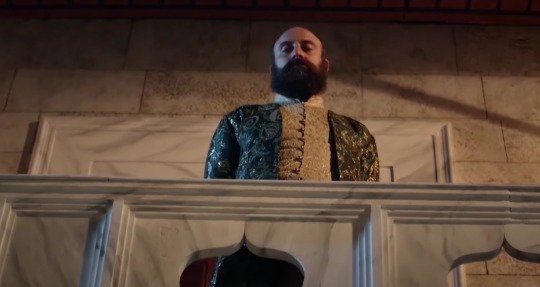
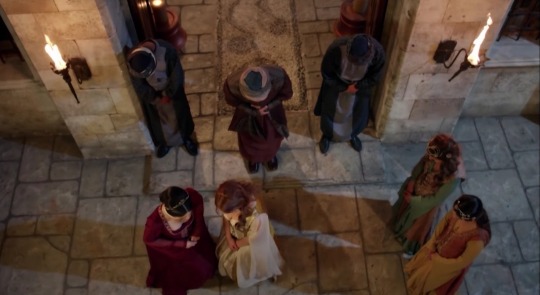
And then they're stopped by... Süleiman himself and I love that, because they have to stop because he comes, they have to stop because he's watching them and give him the necessary respect. Symbolically, it could be a showcase of him being the decider of everyone's fates and them having to accept his will at the end of the day.
And after he leaves, of course, Hürrem and Mahidevran prepare to carry on with their bickering, as they usually do. While that's the end of the whole confrontation, their expressions tell us it's not over yet.
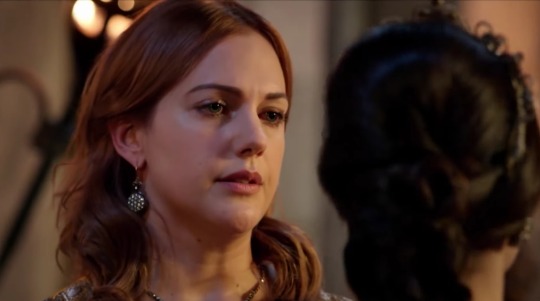
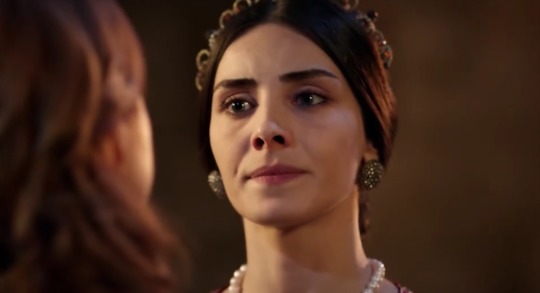
It's particularly interesting, even as a confrontational scene alone: it's longer than many of the confrontational scenes between them, it speaks more volumes about the opposing sides than any other of the kind has dreamed to. While I love Mahidevran and Hürrem's chemistry, I wish there were more scenes like this one, more nuanced interactions than vitriol and constant, almost formulaic smackdowns. Because, to me, this whole confrontation, while simple at hindsight, raised the bar to what could we have had. The rivalry of the two ladies is fascinating on a thematic level and not exploring its depth further, would be a myriad of wasted opportunities.
This scene did right all you could think of: composition, soundtrack, attention to detail, chemistry, dialogue and opposing two sides on a respectful, unbiased, while narratively provoked, way. I adore the way it aged: as I said, it created a perfect blend between context of the episode/plot arc and retroactive irony and the mix of cause and effect of soapy intrigues, character exploration through lines and all the coming thematic stuff, while being filled with dynamic and fun energy. And it's absolutely sublime for it.
#i planned to only use images at first#but since Tumblr now allows only up to 10#I had to quote most stuff#magnificent century#muhteşem yüzyıl#mahidevran sultan#hurrem sultan
49 notes
·
View notes
Text
I may or may not have spent my entire Sunday binge watching all of I told sunset about you and Gaya sa pelikula and now I have so many thoughts and feelings that I need to write about them so here we go! Under a read more (if tumblr allows me to) because it’s 2k words hehe
First of all, I knew next to nothing about both shows before starting them. I had seen a couple of gifs here and there, but really had no idea what I was in for.
I started with I told sunset about you, which has 3 episodes out of 5 out. All I knew is that it was going to be beautiful and possibly sad, and it was. Everything about this show is so high quality, from the audio to the dialogue to the locations to the acting, just wow. The production is better than a lot of movies I’ve seen, and every technical aspect is perfect. I am really loving the plot so far as well, I find the childhood friendship to stubborn rivalry to grown up friendship again very relatable. I think it’s a very common experience for a lot of non straight folks to develop an extremely close bond with a same sex friend when you’re too young to realize what you’re actually feeling for them until you’re a lot older and suddely the jealousy and possessivenes all make sense.
I love the recurring themes sprinkled throughout the episodes, starting from the chinese vocabulary that expresses the core thoughts of the two main characters: rival, intimacy, secret, male protagonist, as promised. They could easily be the episode titles, or the names of imaginary sections the show could be divided into. It’s a great way to integrate metaphors and deeper meaning into the plot.
That’s how most of the communication goes in this show, deep emotions are never conveyed through words because words are scary and loud and they can’t be taken back once they’re out there. The plot advances though stares and gestures and touch and gorgeous shots of the landscape. The pace is slow with hour-long episodes that could each be a movie of their own. This worried me a bit before starting, and I have to admit that at times I struggled to stay focused, especially during scenes that set the mood but don’t do much plot-wise. This is just a personal preference, though, and in no way I see it as a flaw.
The dancing around each other the main characters do, sometimes literal, is frustrating but it determines an emotional build up that’s just starting to reach its peak. This is one of those shows that has me screaming if only they talked to each other, but the silences and unspoken words are so well directed and acted that it works. I struggle a lot with keeping in mind that they’re still in high school, they’re very young and I can’t expect them to act rationally just yet.
I was really worried about Teh possibly going the insufferable Theory-of-love-khai way, and I am still not 100% sold on him. When he started helping Oh-aew again it felt like he was just doing it to make himself feel better about the whole thing. It was frustrating to see him so possessive and jealous while also so deeply in denial about his own feelings, to the point where he had me rooting for Bas instead. He was getting better, but then he fled at the end of episode 3 and now I have no clue what’s going to happen next. About this, I really have no idea if they’re going for a happy ending or a sad one. I’m really hoping it will be good, because so far there has been barely any emotional payoff for all the repressed longing and misunderstanding the show has put us through.
I do like their dynamic a lot though, I have a weak spot for childhood friends reconnecting and an ever weaker spot for informal mentor/mentee relationships. Oh-aew asking Teh to tutor him until he passes the admission exam was an almost exact mirror of Yuri on ice Yuri begging Victor to be his coach until he retires and I loved that a lot.
Now on to the one issue I have with this show: it feels too much like an art film. It reminds me of Moonlight and Call me by your name, in the way that I wasn’t able to connect with those movies because they are too perfect. They are so beautiful and carefully crafted that I can’t fully immerse myself in them. There’s a filter that stops me from relating to the characters and constantly reminds me that this is not reality. It’s pretty, it’s extremely well done, but it feels like art. It has some quirks, some scenes that feel too artificial. One scene in particular, the one where Teh buries his head in the paper Oh-aew wrote with his coconut scented pen to sniff it, which is a direct parallel to Call me by your name, bothered me in particular. Just as it felt over-the-top and purposefully weird in the movie, so it feels in the show. It’s a way of showcasing how a confused teen deals with attraction he barely understands, it’s raw and animalistic in a way, but it’s so quirky that all it accomplishes is to remind me that I’m watching an lgbt show. It makes me wonder if a scene like this would make sense in a straight relationship because here it seems to highlight how different and primal his attraction is. If I had to pinpoint it, I’d say that I have a problem with media showcasing queerness though peculiar, purposefully awkward scenes like these instead of normal kissing and cuddling.
Overall, I can’t wait to see how this show ends and I still think it’s one of the best bls to air in 2020, if not ever. It’s refreshing to see something with a big budget used well! So far my rating is 8/10, which I know is a lot lower than what everyone else seems to think but it’s still very much subject to change! Just hoping they won’t pull a Make our days count, but I doubt they’ll go there.
And now Gaya sa pelikula. Wow. Again, I knew next to nothing about this show before watching, and I was coming from a 3 hour I told sunset about you binge watch, so the bar was pretty high.
And boy, did this show deliver. I was blown away by the depth and the humor of it. It feels like the writers had fun taking all sorts of common tropes and stereotypes just to show everyone how well they can be evolved and made complex. Two strangers who somehow find themselves sharing an apartment sounds like the start of so many fanfictions out there, but it’s so well executed and interesting that you don’t even stop to think about how weak the premises for their meeting are. It doesn’t matter and it’s not even that far-fetched, either. The sister and the neighbor are also two characters that start off as extra stereotyped, but in just a few scenes they unveil an incredible depth and backstory. It blew me away.
Each character is so realistic. Everything they do and say makes sense, they all have their reasons and their past and they react accordingly, it’s so coherent. It’s impressive how everything takes place inside the house and you barely realize it because things happen and the plot moves anyways, and the way information about external events and people is conveyed is so seamless that you don’t even notice it. In only 7 episodes (so far) they have managed to give everyone a complex background and personality through the use of objects and small details and wow don’t get me started on the music.
The soundtrack is SO GOOD. I never really pay attention to music in shows but it plays a very important role here in my opinion and, well, it’s exactly the kind of music I like listening to and ahhh I just spent 4 hours playing the first kiss song on loop so I might be biased. Right from the start in episode 1, when Karl gives in to Vlad’s music and starts dancing to it, it’s established that it’s an important element to the mood of each scene. I love how the dancing I talked about for I told sunset about you comes back here, but while I saw it as a hesitant dancing around each other there, here it’s the opposite, it’s freeing and it’s about accepting yourself. And the end of episode 6 highlights this, with the beautiful quote “You are entitled to a love that lets you dance without fear and shame.” It made me cry a looooot.
I think the development of their relationship is masterfully done. It doesn’t happen too quickly nor too slowly. Karl goes through some needed shocks that act as his wake up call. When I’m watching bl shows I care the most about them feeling real and relatable. I don’t want to feel like they were written by a straight person trying to guess what it’s like to be gay. Now I didn’t look anything up about the Gaya sa pelikula writers, but I’d be very surprised if they were straight. I can relate to both Karl and Vlad for different aspects of their stories and their worries and thoughts. There was one part in particular that hit so close that I had to take a few breaks because it hurt too much. I am a lesbian, I’ve had relationship with a girl that lasted over a year, I am out to some friends but not all. I never came out to my parents, who are both very open minded and friends with a lot of gay people and would love me just as much if I told them, and yet I can’t. It’s not just that, I am terrified by the idea of them already knowing or being able to guess. When Karl freaked out over his uncle guessing, it hit me so hard because I’ve felt the same way so many times.
Episode 7 was amazing. I hate badly written drama the most, and 99% of shows can’t come up with any good reason for drama but they have to put it in there anyways and it sucks. This was the complete opposite, I adored it and I say this as a lover of fluff. It feels right, I think it’s an issue that would come up between two people like them. They are both right and the only thing that could happen there is what actually went down. I definitely think things will be fixed by the end and I am looking forward to it, but I am very glad this issue was included because it’s so important and so true to many lgbt people’s lives.
Another aspect I absolutely adored are the multiple references to lgbt theory and language, and Vlad has some of the best lines I’ve ever heard coming from a bl. When he tells Karl not to be afraid of the word, when he explains that “you don’t look gay” isn’t a compliment, when he scolds his sister for not acknowledging the things she used to say to him by covering them up with her ally act, those are all such important and educative moments that I hope everyone listens to. I love that Vlad is not correcting some ignorant bad guy, but it’s his accepting and loving friends and family that make the mistakes, because sometimes being supportive your own way isn’t enough if you’re not actively learning from the ones you want to support.
This is a 10/10 for me right now. I can’t find anything I don’t like about it. It never feels boring, it never feels overdone, it never feels cheap or unoriginal. It went straight to the top of my favorite bls.
And now I can’t help but compare the two a bit, because yes they are two different shows but right now the relationships they portray have reached the same point: there has been a climax and now the one who is more confused about his sexuality is panicking and taking a step back. It’s a coincidence that I watched both shows on the same day when their last aired episodes end in such a similar way, but it really leads me to compare the two. I don’t want to put them one against each other or say which one did it better because that’s not the point of this, they are both two amazing and important shows who are excelling in what they’re doing.
Gaya sa pelikula is down to earth, it’s explicit and it’s straight to the point in explaining what’s going on inside each character’s head. It feels like watching real people deal with real struggles. I told sunset about you is a lot more subtle and quiet, and since we don’t really have a clear insight in the characters’ heads sometimes it’s hard to completely understand what’s going on with them. It’s a completely different way of narrating, and while Gaya sa pelikula makes me feel like I’m a part of the events, I told sunset about you feels like I’m just spectating from an outside perspective. They are different choices, but one of them ends up feeling a lot more emotional to me than the other.
To wrap it up, I highly recommend both shows and I can’t wait to see how they’ll end! They are both among the best shows of the year, both free of all those annoyingly stereotyped characters and plot points that most bls tend to overuse.
56 notes
·
View notes
Text
Psycho but it’s okay- Fairy tales and their foreshadowing Part 3(Blue Beard, Othello, Wizard of Oz)
To Kill or Not To Kill
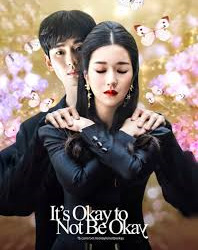
Note by the author: I feel like the momentum of PBIO is slowly reducing. The episodes so far have been incredible but I can see us losing steam and enthusiasm because of the back and forth still going on with our couple. Right now things are very heightened due to the conflict with the brothers and the supposed return of Moon Young’s mum but lately it’s been difficult to analyse that without repeating the same themes over and over again. Nevertheless here is a very short (well shorter than what I normally do) analytical post analysing the show so far and the theme this time is the murder of women! Enjoy.
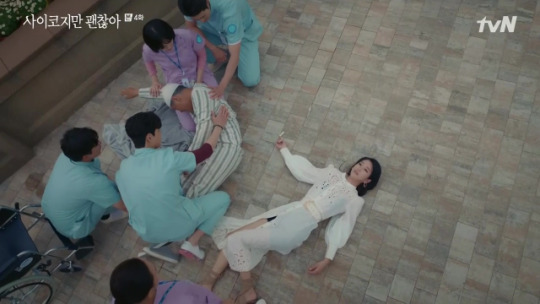
Bluebeard was first mentioned in episode 6, the title of the episode focused on Bluebeard’s secret. The fairy tale of Bluebeard although chilling actually has a happy ending. The young girl gets rescued by her family from her serial killer husband. In Psycho it’s okay many characters are shown to see the story of Bluebeard in different perspectives of the other characters. Moon Young sees it as the girl who is traumatised and almost killed by Blue beard because of her curiosity and uncovering the truth that all his wives were killed by him, Sang Tae sees it as a sad story about why Bluebeard kept on marrying women because of loneliness and wanting to be loved, and Moon Young’s dad sees it from Bluebeard’s perspective for the reason for why he killed the women and his wife.
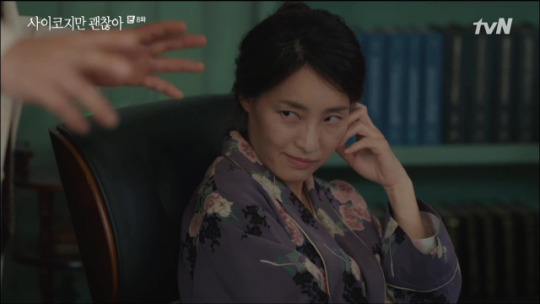
Park O Ran, the patient in the hospital has taken up a sinister role as Moon Young’s mother, she reads the book by her mother and constantly hums the song that haunts both Moon Young and her father. She mentions the next tale, the story about Othello a general who was misled into killing his wife because of lies and manipulation from the outside. She is seeing it from the point of Moon Young’s mum who she believes was unfairly killed and seen wrongly by society and the family she loves. Moon Young’s father is plagued with guilt and at the same time fear that he killed his wife, and follows the perspective of Othello who was overcome with jealousy and insecurity in why he killed his wife and everyone around him. Moon Young is like the innocent wife of Othello as well because she is the victim in this whole manipulation and game between Lago, Cassio and Othello. Her caring and trusting nature leads her to being hurt.
Lastly the name of the book Moon Young’s mother writes is called The murder of the wicked witch of the west. The wicked witch of the west is found in the fairy tale The wizard of oz. It’s interesting when you analyse the story as the story focuses on a young girl who ends up being the down fall of witch because she was manipulated by the wizard and others to do so. Again from Moon Young’s mother’s perspective she is the victim, the wicked witch was feared because she had green skin. (This will later parallel with Blue beard and his own insecurities about his blue coloured beard), she is seen as wicked because of this, people don’t notice that the reason she wants Dorothy’s downfall is because Dorothy’s house fell on her sister and killed her, and they stole her red shoes. They took someone precious from her and stole her things. This is very similar to Moon Young’s mother who is protective of her family and is determined to get rid of any one who tries to take them away. Dorothy ends up using water mistakenly killing the witch and she then realises that real person society worshipped, the wizard is not even powerful or real. He’s just a manipulator behind the scenes.

All these stories have the themes of women being killed unfairly, and being viewed as something they are not. The interesting thing about these stories is that there are themes and imagery that stand out and so when the characters see the stories in a different way it’s shadowing their own internal strife and struggles. Mostly these 3 stories together help piece together the traumatic connection between Moon Young and her real family, her flashbacks and trauma with her mother who seems cold and is seen as monster/witch, her fear and the abuse suffered by her father who seems to have been convinced and manipulated into thinking she’s a monster and her self who has been groomed to be like her mother but is curious and desperate to be a good witch not a bad one. The story also leaves clues again to foreshadowing clues, such as Moon Young’s father being the one to cause her mother to die, Moon Young having a role in it, Moon Young finding out about a murder of another woman in the basement that still haunts her till this day (just like Bluebeard’s bride did) and Gang Tae’s link to danger because of being connected to wanting to free her.
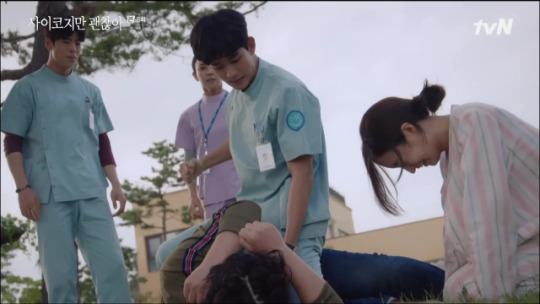
In a way Gang Tae finds a way to play a role in all of these fairy tales if you see it in a different way. He could be the brother that came to save the girl from Bluebeard and helped her run away. He could be the Cassio in the story of Othello, the loyal fair general who Othello becomes manipulated into jealousy against, Or he can be the good witch Glinda that offers Dorothy (Moon Young) a chance at freedom and a chance to see the wizard or he could also be the wizard who is actually weaker than how he’s viewed by everyone in Oz. Either way Gang Tae plays the role of the saviour again in these roles willing to help save Moon Young whilst also being hurt by society if he gets to know her or if she uncovers his truth.
(The way I see it we can see characters in Othello like this; we can Othello as Moon Young’s father, Lago as Society and Othello’s wife as Moon Young’s mother- that way it tells the story that from her point of view Moon Young’s mother feels betrayed that her husband was manipulated by society’s norms and others into thinking she was a monster and killing her. Or you can see it in this way Othello- Moon Young’s mother, Othello’s wife- Moon Young, Cassio- Gang Tae Lago-Society/Father- In this way Moon Young’s mother kills Moon Young’s spirit because she was jealous of her daughter being taken by Gang Tae when he arrived at the castle and her father as Lago because he ends up causing all of them to be killed by his selfishness and coldness. Or society because Moon Young’s mum doesn’t want anyone to take her daughter from her because she feels alone by how she is viewed by society for her illness and it drives her to being jealous when Gang Tae shows up)��
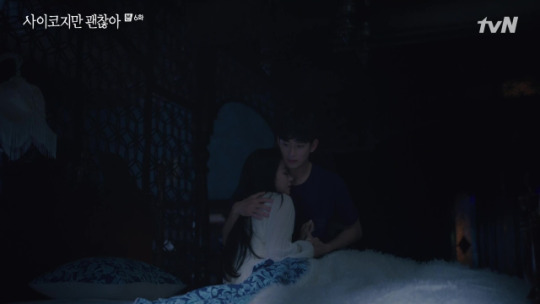
The themes of these stories then follow the ideas of people feeling alienated by societal norms and their desperate attempts to not be alone as mentioned by Sang Tae who relates to this because he views his Autism as the blue beard of Bluebeard or green skin of the wicked witch . Moon Young’s is her ASPD that she was either born with or groomed with that makes people see her as a monster and take her feelings for granted. Her mother might have been the same as well. In a way the way Society views things that are different i.e. mental health causes these characters to be alienated and desperate to not lose the people who finally come into their lives. Moon Young’s mum adamant need to keep her alone in the castle by twisting her mind, Moon Young wanting Gang Tae by her side and Sang Tae’s own dependency on Gang Tae. The next themes also focuses on curiosity/ the need to uncover the secrets, which ends up being a downfall of the characters in these stories. Moon Young is like the bride in Bluebeard who’s curiosity leads her to breaking her promise and seeing the truth about her husband, she is traumatised by this scene but is later freed from it. Just like her curiosity with Gang Tae when they were younger leads to her realising how much of a monster her mother can be, and if we are still on that theory, it could be the catalyst for why Gang Tae’s mum ended up being murdered or why her mother ended up being killed.

The last themes mentioned is manipulation of people being a reason for why innocent people get hurt. In Bluebeard we are shown through Moon Young’s father that the reason why Bluebeard kills his wife is because she looked like an angel but she was manipulating him into thinking so, she was always a monster who didn’t love the man but wanted his riches. In Othello, Othello is led to believe that his wife is unfaithful and is driven to madness by jealousy when in reality it was all manipulation by Lago who is jealous of Cassio. And Wizard of Oz, Dorothy is manipulated by society that the wicked witch is evil, and also is manipulated by them to believing the powers of the wizard when in reality he’s just a fake behind the curtain. She had the powers all along when she was given the red shoes. In this show Manipulation causes issues for the people, whether it causes massive fall outs like when Sang Tae felt manipulated by Gang Tae’s lies and his own perspective of his memories, or when Moon Young felt manipulated by her mother to run away from Gang Tae because she’ll never have someone who loves her for who she is. Manipulation comes at a cost for these people who feel alone and isolated by the world and it leads them to losing it and making choices which end up hurting everyone in the progress.
(I also wanted to mention the water Dorothy uses to kill the witch, I mentioned in my previous posts that there is memory of a woman drowning and Moon Young watching the woman drown, and there’s a woman who was thrown of a balcony that was kept in the basement who Moon Young saw. The woman who was drowning could be Moon Young’s mother, because the song she sings to her Dear Clementine is also about a woman who drowns. )

So to Kill or Not to Kill? Was it right that Moon Young’s mother got killed, are we being manipulated by others to think she was evil when she might be just like Moon Young and have a disorder causing her to be perceived that way. Did the father have any right to want to kill Moon Young? Is Gang Tae right in the way he views her and treats her because he feels she has no emotions? (This one is complete bull by the way, the way he treats her is not okay. End of.) Are these women in the right or are they in the wrong and should they be treated like monsters and killed? Should they be alone? We all know the title of the show disagrees. It’s okay to not be okay. These people have every right to be loved, and be treated properly. They are still humans.
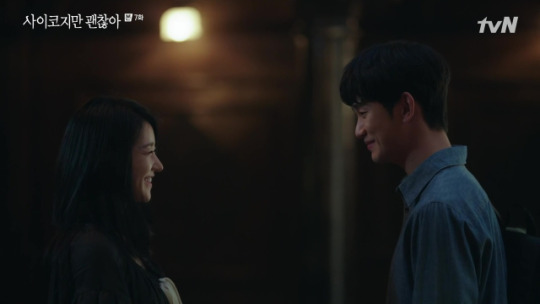
#psycho but it's okay#pbio#psycho but its okay#it's okay to not be okay#it's ok to not be ok#kdrama#netflix#kdramanet#analysis#fvete
73 notes
·
View notes
Text
Chloe does night-time diary posts on HER tumblr, so I'm going to start doing them here, sometimes. It would be nice if you read it, but, please, don't feel obligated! This is more for me to write.
(I got tired of my normal journal, I guess. It's full of bad poetry anyway. Besides, where's the thrill of losing anonymity in a physical notebook?)
I've basically been asleep and depressed for several days, because I had withdrawal after not being able to get my adhd meds. But, I got it today, and DID THINGS. (This is SO much better than before!)
Today, I went to a small café or restaurant (focused on tea) called Alice's Teacup that was Alice in Wonderland themed! My long-standing obsession with Alice in Wonderland knows no bounds. It was a really cute place. I got pumpkin pancakes, and some really good iced tea. Like... REALLY good iced tea.
Still, it seemed like the entire place was geared towards having a pot of tea and snacks with your friends, which left me a bit lonely. The person I asked couldn't come, and by the time I heard back, I was more than halfway there. Still, I read Rosencrantz and Guildenstern are Dead and watched Monty Python on my phone, so I still had a good time!
I dressed pretty eccentricly and effeminately all day, but, with my facial hair, I was ALWAYS coded as a man, even by people on the street! Pastels, a stupid hat, a crop top, and facial hair was a winning combination.
On my way, I was stopped by some guys soliciting for charity. I don't make a habit of stopping for strangers on the streets of Manhattan. What if it's a scam? What if I'm being pressured to buy something? What if it's a strange political rant? But, I had already taken my earbuds off, I wasn't in a hurry, and I'm terminally polite. The first guy said he liked my energy, which seemed to come from a genuine place, because I liked his too!
They were asking for donations for a breast cancer charity, the United Breast Cancer Foundation. After a discussion, it seems like the charity helps pay medical debt, medical bills, and other practical needs, which is much better than *some* others I could name. I regretted not being able to give their minimum there, as it was pretty high, but told them I'd give what I could when I got on the website.
I... did not. Money is tight, because I'm bad and irresponsible with money, even though this is more than a worthy cause. I didn't NEED to go to that tea place, and I don't NEED to spend so much money on food. Sure, I can justify it: I wanted to go to that place for so long, and it was near the college anyway! But, if I was responsible with money, you KNOW my friends direct fundraising drives would go first, worthy charities second. Still, I feel bad about it.
Then, I went to the college library, to get books to start my thesis research. I have literally been unable to go to the college itself, aside from getting my ID, so this was great! There just wasn't a reason. It was... very empty. I went to the library stacks, which was deathly quiet and deeply haunted by the old books. I half expected something to pop out at me, as I turned the stacks, but I wasn't even paranoid or anxious. It was like I was in something else's house. I was welcome, but on thin ice.
I picked up an irrelevant psychology book on the "schizophrenia problem" from the 1930s, out of morbid fascination, and quickly put it down when it threatened to shatter in my hands.
Some students walked past (which was a suprise in those monastic basement library stacks), and I added something to their conversation, in a totally natural and casual way. But, omg the poor girls, I made them jump! Luckily, I'm the least threatening person on earth, and we laughed it off.
After a lot of hunting, I got 5 out of my 10 books (for the most part)! (The rest are, sadly, online. I like to read physical copies.) Strangely, I only came in with a list to get 3 books out of 6.
Most of the books I got are about art in the AIDS crisis, which is the core of my thesis, I think, all with different value. One about exhibitions, one about the larger narrative of those gay artists, and another contradicting the larger narrative.
I also got a book about "Art and Homosexuality". Just, the parallel construction of both "art" and "homosexuality" across cultures and times, from earliest history to the modern age. It wasn't on my initial list, but I'm really excited to read it.
Finally, I got a book called "The Thief, the Cross and the Wheel", about the pain and spectacle of punishment in Medieval and Renaissance European art. I'm mainly interested in Italian Renaissance art of the crucifixion--and its masochism--for the second quarter of my thesis.
The rest are online, and Should mostly focus on Bacchus in the Italian Renaissance (especially through art) and what I call the art of "gay liberation", concurrent with the AIDS crisis (i.e. The Cockettes). These two topics make up the last half of my thesis.
I'm SO excited to get started!!
I even got to cross the college's sky-bridges! (The college is a few skyscrapers.) Still, the loneliness and novelty were kind of the same thought. Imagine if I had been here before COVID, or, if COVID hadn't happened. Who would I have been able to meet? What would the college buildings mean to me? Because, for now, they're just buildings. But, I got to see the street from above, and that was amazing!
Just walking through New York--the Upper East Side--on a cool, sunny day was beautiful. It takes 20-30 minutes to get from my place to the college (and the tea place), but it was great being able to listen to my music (a lot of They Might Be Giants on the playlist today) and see the city. You know, people, super cool old architecture being pushed out by terrible new architecture, and pigeons.
Oh my god, the pigeons. I took pictures, but none of them are good. I kept thinking about how pigeons and doves are functionally the same. We domesticated pigeons, which is why they're here, and no one is stopping to notice them? Even the ones that were splotched with pure white, like doves? There's only so many pigeons you can take until they're just white noise and a nuisance, I know, so don't think I'm blaming anyone! But it's so hard to look away from these quirky little birds.
Also, at one point my walk, I was vaping very strategicly. The mental task of searching through library stacks will do that to you, when you already have an addiction to nicotine. I made sure no one was around, and no one would be affected. I stopped on a corner next to an old, ornate Catholic church while the traffic light changed, and I almost juuled right next to a priest! I'm glad I stopped. I don't believe in Hell, but, I would have walked down there myself had I vaped at a priest. Still, the church advertised itself as LGBT+ friendly, so maybe they aren't so trigger happy on the damnation. Either way, I DIDN'T vape at a priest today, which is good.
Once I got back, I spent a few hours watching things with my amazing girlfriend Chloe, who you may know here as @cisphobiccommunistopinions. She is so beautiful, and I love her more every day, every time I see her. God, it's almost been 5 years!
I just wish I could spend more time with her. She's in Virginia, and I'm in New York. Like she said to me earlier, I'm flighty at the best of times, and, with my lack of object permanence for the digital world, I find myself not giving her the attention I deserve, or, the full connection I long to have with her. We used to live together. Luckily, someday we will live together again! All these problems won't be forever, and we can live together again.
We watched a lot of things, but we're pretty deep into Serial Experiments Lain right now. It's a postmodern anime from the 90s, and, wow, do I have no idea what's going on in it. It's about the internet, and potentially schizophrenia as well. However, I'm obsessed! One day I'll be able to crack this artistic code, and it's unreality, thematic knots, and double-meanings. I will probably understand it better on the second watch. I don't see myself in Lain, but I see my 14 year old self in her, when I had just developed schizophrenia. Her cyberpunk fate seems like it's railroaded towards tragedy, but I want to save her, even if it's silly and irrational.
I told Chloe that I was scared about spilling apple cider on my library books, and she referred to it as "The Great Apple Juice Disaster of September 11, 2021." To which I said that it was the second worst thing to happen in New York on that date. It was funnier if you were there, and also were in my brain at the time.
Anyway, tomorrow I'm meeting some online acquaintances from the college's "Queer Srudent Union" at a Japanese Culture Fair in a park. (I do not know which park.) It emphasizes "fun"! I don't know them very well, but they're friends with the one person I know irl, so it should be good.
Tomorrow night, I should Probably head downtown to check out a gallery show by MFA (masters of fine arts) students at Hunter! After all, I was in a group project with one of them, and they're absolutely brilliant. I missed the Thursday gallery opening by a landslide, because of the aforementioned lack of adhd meds and Being Asleep, which I infinitely regret. I could have listened to all the artists and curators talk about their art and exhibition! Maybe I could have even talked with the artists and curators. But, it's best for me to go sooner, rather than later, so I don't forget. And, I REALLY want to go.
It's "This dialogue which happened to be present in all other dialogues" at the Alyssa Davis Gallery. From the email I got, "Each of these works observes a threshold of transition. [...] [These] intimations [are] of a frame of mind shared by the artists. These works perform, record, access, engage, document, and entrap, embalming the viewer within the gallery space."
sgp is a really good artist, by the way. Their work is just next-level. Be sure to check out their art, if you have a chance. Let me link their portfolio: https://saragracepowell.com/
(I highly suspect spg and the other member of my group project ghosted me afterwards, but I understand. I was really in over my head. Still, they're both really sweet and kind people, don't get it twisted!)
I ALSO really want to see The Cake Boys. They're performing at the 3 Dollar Bill in Brooklyn on September 26th. (It's only $15!) They're the only all drag king collective in NYC! (Are... there any Other all drag king collectives out there?) Other than the fact that a lot of them are trans or nonbinary, which I love, this show is a totally non-judgmental competition for over 40 drag kings! I've heard their shows are hilarious and unique.
I just have to wait until I have $15 to spare. I... didn't eat dinner tonight, because I'm irresponsible with my money and don't want to ask my parents for money... again. Don't worry, it's literally fine, and I don't make a habit of doing this!
Which reminds me! For my birthday, my parents gave me a gift card to Lush! I'm definitely going to Lush tomorrow, which will be great. I would describe my personality as "Lush store employee acosting you about a bath bomb demonstration", so I'll fit right in.
I also made a transition timeline, to show how much I've changed on testosterone. For the better, I hope! I really believe I'm becoming, if not Have Become, the man I was always meant to be. It's so strange to look back at who I was not too long ago, and to know the absolute pain I was in. It's also strange, in a good way, to see the man looking back at me in the selfies. I'm so much happier now! Much more candid in my pictures, at least. But, I know that I'm so much more comfortable as myself than I was even 6 months ago. It's strange. Sometimes I think to myself, "I don't pass yet; I'm not who I Need To Be yet." Then, I look at my selfie from today, and... I'm THERE. My mind just hasn't caught up with my amazing, natural, normal reality.
The end. I have to get ready for bed, (even though I could be partying on a Saturday night in the city. I'm lame.) If you actually read this, I am kissing you on the mouth right now. I hope it made you calm down tonight, like a terrible bedtime story. If you didn't read it and just skipped to the end, don't worry: you did the rational thing.
2 notes
·
View notes
Text
Intimacy, Sex and Buddie (better known as I have a lot of feelings about this show, some of which are related to the before mentioned topics) - Part 2
G’day friends, family and lost travelers! Welcome back to another instance of: I read too much into things!
This is where we really dive into the Character analysis and it’s gonna be a fun ride!!! (well, maybe. For me at least because thanks to 3.16 I am living! That episode validated me so much and now I truly believe I am right)
This is part two of a three part Meta / Character Analysis, and while you probably don’t need to read part 1, I would recommend it, so here is the link:
part 1
Also:
I should preface this by saying this meta was supposed to be a lot shorter and only talk about how both Buck and Eddie use sex to distract their respective partners from whatever topic they actually wanted to talk about but since I decided to rewatch the show to make sure I don’t miss any such scenes, it has exploded a bit and taken on more topics.
I should also mention that I am a Buddie shipper and while I tried, you will find several references and arguments for the ship in this Meta, not all of which necessarily call for a romantic pairing but just: These two are deeply connected and you cannot look at one without discussing the other and they are each other’s strongest emotional connection.
I should also preface this by saying that the whole of the 118 has some obvious intimacy / commitment issues except Bobby (which is sort of surprising) but *John Mulaney* voice we don’t have time to unpack all of that!
On another note I cuss a little in this Meta because my parents let me listen to TicTacToe as a small child and after that it never stuck that cussing is wrong so, uhm, parental supervision is advised or something?
This Meta will so far have three parts (this is part two), one for each season and is organised by episode so you could technically follow along
So here goes nothing, Season 2: (Also called „Why is Ryan naked so much?“)
Episode 2.01:
I’m not gonna talk a lot about this episode, because I feel like it’s been analysed to death already. Important to know is that Buck hasn’t yet given up on Abby coming back (see the shower scene), he is very lonely and there is a lot of homo- erotic tension.
Basically this episode goes like this:
Buck *after meeting Eddie*: nooooo, Dad, I don’t want a brother! He’s better than me! Put him back where he came from!
Eddie *takes one look at Buck*: Ui, you guys lied, he’s an ass - I like it! This is way better! We’re gonna be friends!
And then Buddie decides to something stupid to prove themselves (to each other) and they end up saving the day and bonding.
Also Eddie saying: „You guys hungry?“ after the Ambulance blows up? Iconic! He is such a little shit.
Episode 2.02 / 2.03:
(I’m putting them together because two-parter)
This episodes truly proves how hard they’ve already bonded, despite Buck not even knowing Eddie has a kid yet, especially from Eddie’s point of view: I actually think he started seeing Buck as his partner first.
I love how he always takes charge, even in his first episode and expects Buck to go along with it - which Buck does (after some initial reluctance), because Buck is good at following orders and trusts Eddie. It might be an army thing, probably is an Eddie likes control thing. What is truly unique about Buddie, is the fact that Eddie defers to Buck’s judgement as needed, something he doesn’t do with anyone else, I think, unless the chain of command tells him to. Just look at how annoyed he is by Ali and her interfering.
That being said it really isn’t all to relevant for this meta, except to say: Interest- ing how fast they trusted each other and became a unit - I guess it’s true what they say: birds of a feather flock together.
Episode 2.04:
Here we get our first real insights into Eddie’s character (aside from that he is a little shit and likes to take charge) as well as some very nice shots of the man’s body, proving my theory that someone in charge really wants to get busy with Ryan Guzman. Which I am not exactly complaining about.
I do think however it’s a very noticable shift from the way they treat the other young, attractive guy in the cast. I talked about this a little in the first part of this Meta, how they went out of their way to hold Buck accountable and make him relatable, but refused to bank on his sex appeal, aside from a few scenes which mostly were about explaining why Abby reached out to him (and uh, we do not need to talk about how creepy that really was, do we?). Eddie though really gets sexualised from the get go. Or maybe that’s just me and I missed something? (Someone with more insight on such topics take the wheel? Because that really isn’t my area of expertice and I don’t wanna say anything false)
A main difference between Buck and Eddie at this point (or in general) is that Buck is always looking for connection. He craves emotional intimacy but it scares him because he cares too much and people keep leaving so he searches out physical intimacy - or he used to. Actually by Season 2 Buck is actively looking to connect emotionally with another person.
Eddie on the other hand isn’t even on the same level as Pilot!Buck, because he avoids both physical and emotional intimacy (except with Buck because, you know, steam engine). The episode implies that it might be caused by Shannon leaving, but the rest of Season 2 and specifically Season 3 show us that it’s an Eddie thing (likely caused by his upbringing if you fast forward to 3.15). And it really makes me want to know how Shannon and Eddie met and how long they had been dating before she got pregnant. Probably not that long tbh.
One thing to notice about the episode is that it parallels Eddie both with Buck (neither wants to date one of those girls, both deflect about their reasons) and with Abby - watch 1.03 and 2.04 back to back, both are about a character taking care of a special needs family member, both have another family member consider them stuck when they themselves do not and both feature Buck trying to help (passively by talking to Abby on the phone vs. actively by having Eddie and Carla meet)
Also as I pointed out in another post the conversation about dating is kind of similar to the car conversation, and I really am clowning now - which is why I will not try and parallel the conversation between Maddie and Buck with the one between Bobby and Buck in 1.09!
I still don’t fully understand the need for that scene (you know which one) aside from being another instance where the boys get sexualised and giving us our first insight into Eddie romantically and also the first time he uses Christopher as a shield (also not the last).
The general take away from the episode is that Eddie is bad at asking for help and Buck is bad at asking for permission which means they fit really well - because Eddie doesn’t have to voice his needs and Buck doesn’t have to feel bad about steamrolling him.
In terms of the overall theme of this meta your main takeaway from this episode should be:
Buck - no longer substituting physical intimacy for emotional intimacy but also not seeking out emotional intimacy, both because he has a connection through Maddie and is building one with Eddie but also because he still considers himself spoken for, though the episode ends with him realicing he might not be (and then he keeps realising, because he is one stubborn mf).
Eddie - avoiding both physical and emotional intimacy and using Christopher to deflect, mainly because he doesn’t have the time for either (but still getting a connection through Buck, thanks to someone just punching right through his boundaries)
Episode 2.05:
no relevance, our boys are barely in it
Episode 2.06:
Well, if you want to write about Buddie crumbs than yeah, definitely important. Also, you can draw a definite parallel between Abby and Taylor, because Buck knew both their voices before he saw their faces and built an emotional connection to those voices. This fits because, well, Buck is afraid of emotional intimacy, but when it’s just a voice it’s easier for him to let himself be vulnerable cause it’s not an actual person.
Plus, considering the thing with Taylor is one sided prior to their meeting, he isn’t actually cheating on Abby. Or so Buck thinks. (Also Taylor doesn’t have a chance to hurt Buck and leave him because you know, she is not aware he exists?)
Also Eddie talks about becoming a firefighter because he missed the camaraderie of the army - aka the emotional connection he had with his squadron (is that the right term?). So technically he did actively try and seek it out - to a point at least. Because, as I will discuss in Part 3, Eddie may consider the 118 his family but his relationship with the other three firefighters in not on the same level than the one he has with Buck.
Episode 2.07:
Let’s all give a warm welcome to Shannon Diaz! I like Shannon, I think she is great (I also think she and Eddie are similar because they both run away from problems which is why they would never work out - unlike another possible relationship mentioned sporadically in this Meta, hint hint ;) ... okay, moving on)
We learn that „not in the picture“ means Eddie is still married, which begs the question how much Eddie has told Carla and the 118 about Shannon up to this point (as little as possible), what they assume about her (probably the worst) and if Eddie ever sets the record straight (I’m assuming yes, because while Eddie doesn’t share - Eddie is also protective of his family and Shannon is his family for better or worse - I really wish they didn’t kill her off and instead played out the divorce storyline because there was so much chance for growth! Although that was probably too similar to Athena and Michael, which is why they didn’t do it. So they fridged her. Damn, and I am still salty about it.)
I really love when she comes to the house, because we learn so much about them as a couple. Like how her eyes grow warm when he opens the door but Eddie’s don’t but then he goes in to hug her (and you can really tell that Ryan Guzman is an athlete in the way that he always acts with his whole body and conveys so much through movement). And the fact that Shannon immediately pushes to meet Christopher (probably because with Eddie you need to push, because he is very stubborn and also in need of control), and her saying she never thought Eddie would be into something so fancy? Yet another insight into Eddie’s character and into his upbringing, which while probably not poor seems to have been fairly modest.
Also love how they fight almost right from the get go, implying that it is their normal (as proven in 3.15). They really never stood a chance!
There is a lot of backstory we get through their fighting, both at the house and at the school, most notably that even in marriage Eddie was never able to fully open up to Shannon - aka be emotionally intimate with her. Which made her feel very alone.
And I don’t wanna defend Shannon and her actions because other people have said it before and this is not what this Meta is about but I can see her point of view. With Eddie and the way he just always needs to be in control and make the decisions she probably thought she had to do something drastic to get him to notice her and her struggles.
Interestingly enough Eddie is emotionally vulnerable with Shannon at the end when he tells her that he understands why she left and that he misses her, but then he immediately kisses her and look, we don’t know what happens next but we can guess from the latter episodes.
And look, tbh with Eddie it’s a little bit harder to draw the line between physical and emotional intimacy than with Buck because Eddie’s love language is touch and actions, so technically in a way he is always emotionally intimate when he is physically intimate (probably why he didn’t wanna go out with any of the girls in 2.04 - Eddie, different to Buck, can not just separate feelings from sex, while Buck has a hard time reconciling the two)
On Buck’s side of this Meta he finally comes to terms with Abby leaving, which doesn’t have too much relevance for this meta except there are a lot of parallels between Buddie in terms of: how long is too long to wait - because while Eddie pretends to have given up on Shannon, he actually hasn’t, whereas Buck outwardly is still waiting for Abby but on the inside has given up hope - something they both come to terms with in this episode
Episode 2.08:
Fun fact: The german title of this Episode is Lovestorys. Can you guess if there is anything of relevance in it?
Okay, first off for the millionth time, in case you haven’t read part 1 or you aren’t convinced yet or maybe you just forgot: Evan „Buck“ Buckley was never a sex addict. Kay? Good.
Also, remember when I said the show doesn’t sexualise Oliver the way it does Ryan? Yeah, this episode exactly. Buck has sex twice and we see less of his body than of Eddie just getting out of bed. Is it a contract thing? Was Ryan always running around naked on set? Did Oliver refuse to take his shirt off? Is he always cold because he’s vegan? Should I figure out Twitter just to ask the cast these questions?
(Also, remember when I said with Buck it’s mostly Girl on top, yay, it stays true)
In terms of actual relevant story, there’s that woman on the freeway (highway? Idk guys, I’m not from the US) reinforcing that Buck has finally accepted that Abby and him are over and then there’s the Taylor Kenny - story, which is sort of just beating the bush of sexual vs emotional intimacy with Buck trying for the latter and only finding the former (remember the Brunette from the Pilot? Yeah, that’s why I’m reminding you).
What I like is the fact that, after spending so much time calling out Buck 1.0 (and they should, because stealing a fire truck? Twice? Babe, for realsies?), this episode went: look, maybe girls like meaningless sex, too? Although, technically they have been telling us from the the beginning, that those girl were using Buck in the same way he was using them (again with the Brunette) - Buck just never understood that until Taylor.
We also get the soulmate scene with the very sweet couple, once again, rein- forcing how lonely Buck is and how much he is craving love and a connection and stability. That really is what his character boils down to at the end of the day: a lost kid trying to find his place in the world. And now I’m sad.
As for the Ali storyline, oh man, I’d really rather ignore it? Not because I have anything against the character per sey it’s just - we get to see their first meeting and then 5 episodes later their first date and by the end of the season they are in love love except by Season 3 she is gone? And in between she is hardly ever mentioned? So I really don’t know how to comment on their relationship in terms of this meta and what it means for Buck except: I think it was one of those right times right moment kind of things and Buck is sort of transfering a lot of his wishes and needs and feelings onto her, but their relationship has a weak foundation, which is why it ended so fast (except we don’t know how fast it ended because there is a 5 month gap between Season 2 and 3 and the breakup gets mentioned one (1) time. Soooooo...)
And Eddie, well, he was in the episode.
Episode 2.09:
I like this episode a lot and it tells us so much about Hen’s issues, but in terms of this meta: no relevance!
Sidenote: I do always forget they did Hen before they did Chim. Then again this episode in general feels very disconnected because there was no prompting, no connection to the present.
Episode 2.10:
Ah, yes, that one! The gift that keeps on giving in terms of Eddie and this meta (and also Buddie, but I’m trying not to be ship-y around here)
(One tiny sidenote though, I do think we see Eddie roll of off Shannon, and, while I don’t want to reinforce some stereotype about Top and Bottom, because I am not a gay man and therefore not qualified to comment, with Buck it’s generally girl on top? So Buck usually lets his partner set the pace while Eddie prefers to be the one in control? Okay, you know what, let’s just say it fits with their characters and maybe they match and leave it at that?)
(also, again with the Ryan shirtless, I mean, not that I am complaining, it’s just ... yeah, please, someone who knows this stuff come talk to me about it and explain because I don’t know and maybe I am seeing things?)
(sidenote #3 with actual relevance: They did not mention Buck’s girlfriend even once. They never do until the final.)
First of, this episode proofs what I said before: With Eddie there is no separating Sex and feelings. It is interconnected („We are working things out.“).
Also there is a point to be made about Eddie and control. So far we have always seen Eddie be the one in control and make decisions and this is our first real indicator that it actually bothers him, that maybe he wants someone else to tell him what’s right or wrong, too.
I’m gonna fast forward a bit, because we are nearly at the end of Season 3 irl and so far we have seen Eddie ask for help several times but only with two people - Buck and Lena - he actually takes the advice. I don’t want to say too much because it really fits better in Season 3, but wether you ship them or not, it is noticeable that out of everyone Buck is the one Eddie let’s help the most. The one he trusts the most.
(Man, they are both just two lost boys looking for their home, aren’t they? (and now I am sad again.))
There is also the topic of trust brought up, which you know, we hear about a few times from Eddie, and it really is such a big thing for him, isn’t it?
To fast forward again, that is one big difference between Eddie and Buck. Both struggle with self worth and trust but while Buck’s biggest problem is that he doesn’t trust people to like him, if they actually get to know him (or if they even want to get to know him), Eddie just plain old does not trust people? Because Eddie is a pessimist, so he doesn’t even try to connect, while Buckeroo trusts way too much and too easily and he is such an optimist and gives away everything and then he still isn’t enough - and then and only then does he give up hope (which is something we see happen in canon maybe twice? With Abby, maybe with Ali, and with Christopher, but again, Season 3 you guys!)
These two really are the different sides of the same coin, huh?
In relevance to this Meta, Eddie is trying very much this whole episode to be open and vulnerable and he struggles so much because he is very scared. The main issue with Eddie is always (and specifically with Shannon) by making himself vulnerable, he opens Christopher up to getting hurt as well (and vice versa because he can’t let Shannon into his son’s life without letting her into his own life) and this is what we see him struggle with in this episode and also what intensifies his already existing issues with intimacy throughout the show in general, his need to protect his son.
It should be noted that in the end Eddie puts Christopher’s wishes above his own well-being which is in fact what he will always do because Christopher is the most important person in his life.
As for Buck in this episode, well, after having so much development in his last episode, he really was there more as a sounding board for other characters. However I will mention that, after the show points out the whole thing is none of his business twice, Eddie then turns around and makes the Shannon thing Buck’s business, because well, connected and all that. Trusting and giving up control. Emotional intimacy. Just repeating myself now.
Episode 2.11: No relevance.
Episode 2.12: No relevance.
Episode 2.13: No real relevance.
There is the scene in the hospital between Buck and Eddie that reinforces the peas in a pot thing they got going on and a reverse from the Christmas Episode when Eddie asked Buck about what he should do. Here Eddie acts as the sounding board (even though Buck has already done the thing but then so has Eddie by hiding Shannon).
This is also yet another instance of Buck trying to help another person with no regard for his own safety but I’m with Eddie here: I have sisters as well. I too would do countless stupid things to save them with no regard to my own safety and I’m a girl - I was not raised on the believe that is was my job to protect them from harm like both Buck and Eddie probably were (because gender rolls).
Also Buck thinks it’s his fault that Doug even found Maddie and Eddie explains to him why its bull. To reinforce the whole connection thing, it is very noticeable that these two always give each other exactly what the other needs - with Eddie from the get go always working on building up Buck’s self worth and Buck always lending a hand to Eddie and taking control when needed (remember Carla? That was Buck taking control for Eddie because Eddie didn’t know what to do).
There is also the short scene when Shannon comes to the hospital and it prob- ably did a lot to help rebuild Eddies trust in his wife.
Episode 2.14:
STOP MAKING EVAN BUCKLEY WORRY ABOUT HIS FAMILY 2k21 (because it’s too late for anything before that)
It’s also our first real: Eddie can be a dumbass, too sighting and there is that one scene (you know which one) which in text is not shippy at all, but ended up in every gifset because Oliver is looking at Ryan like he wants to eat him alive.
Aside from that, this episode really isn’t about them and that’s okay.
Episode 2.15: Crime is hard. That is all.
Episode 2.16: No relevance.
Episode 2.17:
First of all, Eddie is not shirtless? At the beach? Damn, what’s wrong, 911? Is it because Gavin was there? Have you used up all your contracted shirtless scenes by now? Did Ryan find out he was the only one running around set half naked?
Also poor Eddie, you know, you’d think getting married your done having those: what are we - conversations and then bam: there it is again. He really can’t catch a break, can he?
Also I know it’s been said before, but I’ll say it again: Eddie Diaz is not in love with Shannon. Maybe he has never been or maybe he just stopped at some point, but right then and there he isn’t in love with her. He does however love her deeply (she is after all the mother of his son) and she is his family which is sort of where the problem in their relationship lies. Because Eddie, who has problems with trust and intimacy, frankly doesn’t care enough about Shannon (and also doesn’t trust her enough) to try and be open and vulnerable with her, which is what he needs to be in order for them to work, a fact that Shannon seems to be aware of and have accepted.
(Because if you have to wait for a sign on what to do in your relationship, yeah, you already know - you’re just not accepting it.)
And this episode is so heartbreaking and I just had to stop myself from ugly crying because Shannon loves Christopher so very much. And I just hate that they killed her off, so in my mind I have already half plotted a fix it fic in which she survives because that was just unnecessary angst.
Though that’s the topic of another post.
In terms of the relationship-story I am similarly floored as I am by the „Help!“ scene because (at least for me) this is the first time I have seen media really address that yes, you can be a good parent and still not be ready for a serious relationship because those two things are very different. Sure, you sometimes see examples of it through subtext but never before has it been so outright stated.
And I like that both Shannon and Eddie ask themselves that question, but come to a different conclusion - or actually they don’t. Like I said above, for Eddie this relationship fits because it’s easy and he doesn’t have to change or better adapt. He can just keep avoiding the hard stuff (being vulnerable) and still have the good stuff (sex). And then Shannon might be pregnant again and look at his speech at the restaurant: He is basically saying our child is awesome, so we should get back together because if we make such awesome children than we can’t be that bad together. And that is so very wrong, which Shannon understands.
The problem is, that Eddie doesn’t fully understand why their marriage hasn’t worked in the first place. If you tie it into 3.15 Eddie Begins, I think for Eddie, the reason why Shannon left him was a little to get back at him for leaving her and a lot about feeling left alone and being unable to cope with raising their child alone, but all of that is gonna be different now because he will be there for her physically and emotionally as he is no longer in the army! So the issue is solved. They should be a family again. Even without a new kid. After all: they love each other.
And look, those are all fair reasons and true but the thing Eddie doesn’t understand about relationships in general and his marriage to Shannon in particular is that she also needs him to be emotionally vulnerable with her. Shannon needs Eddie to let her be there for him, just like he is trying to be there for her. Because relationships are always a two way street.
SO obviously this is where the episode ended. There were no more scenes af- ter that. Nope. Bit weird how it was so short but you do you, 911, you do you!
And well, Buck was there too.
Episode 2.18:
I’m just gonna come out and say it: Ramon and Helena are bad parents. Flying to your daughter-in-law’s funeral only to bad mouth her and then try to take your son’s son away again? Yeah, I do not like your style. I wonder how much of Eddie Begins was already planned at this point or if they built that plot about his family for 3.15 based on this episode. Huh. We might never know. (except Twitter)
Also me thinks Eddie choose LA because of Pepa and Abuela, not because of Shannon. She was probably just a bonus.
As for Buck (and Ali): the actors seem to have had fun doing those scenes? I guess? Other than that it’s a little cringy and very out of nowhere and probably more caused by the show having money left over and deciding to built a new set. ANd damn what a set. I wonder how Buck is supposed to be able to afford that because that apartment has probably about 50-75m2 considering there is a kitchen and a living room as well as a room behind the living room and probably an extra room in the upper floor as well (someone do a floorplan and also tell me why Buck needs so much space and wether they think I could move in with him. My apartment is not this nice and LA isn’t that long a commute).
Point being I don’t know why they brought Ali back in the first place, especially in this episode. She was never mentioned after their first date, so why? Just to give people something to discuss during hiatus?
There was no point to have those two incredibly lovey dovey scenes only to have that scenes about what he wants to do next because all those scenes? Would have worked just fine with, you know, his sister (except a little different because incest). Who actually has the what if you can’t go back to being a firefighter - scene with him. So why have a girlfriend you barely introduced and never used before? I’m not mad, 911, just confused! (Fuck me, I really am getting twitter)
As for the topic of this meta, there really isn’t much too tell. Ali honestly doesn’t figure into things except to create more abandonment issues.
I should point out that this episode reinforced the whole Buddie connection thing - from Eddie holding Buck’s hand the whole while he’s pinned to saying „Almost (back to normal)“ to Buck going to Eddie’s ceremony despite probably still being on somewhat of a bed rest.
Other than that, that’s it for Season 2. Whew!
Before I let ya’ll off the hook, though (look, you’ve read it this far, you can now just bear it a bit longer) I wanna comment real quick:
Compared to Season 1 Buck barely had any character development (mainly because he had so much in Season 1 and sometimes stuff like that needs to settle - real life would be the same way)
Eddie however has nearly no development at all and in fact as of Season 3, not a lot has changed in that regard. His issues just became more obvious. Which is something I actually like a lot, because one: he went through a lot of shit in a fairly short amount of time and two: he is such a stubborn and reserved character, anything else wouldn’t be in character and ultimately feel rushed. Plus, because this is his personality it’s feels like we’re actually getting to know him like you would a person in real life? Piece by piece, no unnecessary exposition. Or maybe that’s just me, I don’t really know anything about storytelling.
I also want to comment on Buddie real quick because it would be dishonest if I didn’t and also it’s just glaring me in the face:
The thing is, while I do not necessarily believe they have any intention of making them romantic (because I have been burned too often and just recently by a show that liked to praise itself for its diversity (so a heartfelt fuck you to Sera Gamble and who ever decided to kill off Quentin Coldwater, because that character mattered so much and you destroyed it)), I do think we are right when we talk about connection and parallels and being each others person and just generally being each others closest relationship. Because they parallel their stories so much and they connect them so often and they did do it from the get go like as early as Episode 4 - which was already written and probably already shot by the time Episode 1 aired. So there. I said it. Buddie is real, wether it’s platonic or romantic, it is real. And that also matters!
(although of course if they went with romantic? That would matter a bit more! Tim Minear, listen to me, you could make TV history! This would be bigger than Supergirl making the sister gay in the second season! Ya’ll would be legends, revered by fans for years to come! Also I’d bake you a cake?)
And there you have it! Season 2! We made it! And only like 2000 words more than Season 1.
Can you believe at this point I have written nearly 10.000 words on these two exceptional characters and their issues? And it’s technically only one issue, like I’m ignoring so much stuff just glaring at me right now!
(also on a side note, this is where I tag @angelcamael , who asked me to do so and @greyhello because she inspired me to write this meta in the first place and while it is now ... no longer about that original topic, I’m still gonna tag her)
#buck meta#eddie met#911 meta#evan buckley#eddie diaz#buck#buddie#911#911 fox#mine#textpost#season 2#buddie meta#meta#my meta
98 notes
·
View notes
Text
The Things That Matter
I’ve talked a lot over the last two months or so about the many different ways that the characters, story, and themes of the Kingdom Hearts series align with the framework of the Heroine’s Journey. For the final chapter in this series of essays, I’d like to talk about what it means for this series to follow this narrative formula. Because the fact that Kingdom Hearts fits into this storytelling pattern is critically important now more than ever.
The three most recent series I know of that aligned with the Heroine’s Journey framework all ended up missing the landing in various ways. Two of the three - Voltron: Legendary Defender and the Star Wars sequel trilogy - abandoned the formula in their final installments, while the third one - the Frozen movies - managed to fit into the formula almost completely, but suffered in the second movie from a lack of clarity as to which of the two leads is the main protagonist and which is the Animus. Two of these were under the Disney umbrella, and all three have had evidence found that executive meddling or other behind-the-scenes conflicts over story direction played a role in how the final installments ended.
As I mentioned in my essay “Into the Unknown,” when a story deviates from the structure it appears to be following, it produces a visceral sense of wrongness in the audience. In stories which up toward the end aligned with the Heroine’s Journey, that effect is amplified. The framework of the Heroine’s Journey was designed to uplift the experiences of identities outside of what society considers the default option in storytelling. The lived experiences of those identities are mirrored in the narrative’s themes. So when a story set up around calling out prejudices and double standards about those identities that are ingrained into the audience’s culture deviates from that formula, the result inevitably ends up reinforcing those biases instead, on top of the brokenness of the narrative in general.
In terms of how this applies to Kingdom Hearts, Sora and Riku’s individual character arcs have been noted by many LGBTQ+ fans to have notable parallels with elements of their own lived experiences:
Riku’s arc of learning to accept his darkness as something natural that’s a part of him and which he can express in a positive way mirrors how many LGBTQ+ people grow up with the idea that same-sex attraction is “sinful” and “unnatural” and have to unlearn that mindset in order to realize that there’s nothing wrong with them. Likewise, Mickey’s line in Re:COM about how spending time with Riku has positively changed his opinion about Darkness can be read as an analogy for straight people who are initially unsure of or hostile to LGBTQ+ identities changing their minds with education and first-hand interaction to become staunch allies. Esmeralda’s talk with Riku about how “There are just some things we need to keep separate from the world at large, at least until we have time to figure them out”[1], while on one level is referencing Riku’s Darkness and his inner turmoil relating to Ansem, can also describe the common LGBTQ+ experience of being in the closet and hiding that part of yourself from the people around you[2].
As for Sora, in Kingdom Hearts III he responds to Davy Jones’ comments in The Caribbean about the romantic relationship between Will and Elizabeth by saying that “I still have a lot to learn about love[3],” indicating he lacks understanding of his own feelings in the area of romance. This is supported by the official Kingdom Hearts Character Files book published by Square in February 2020. Short stories in this book featuring Sora’s POV depict him as actively confused about what romantic love is[4], and struggling to define the nature of his relationship with Riku[5][6]. This can be a common experience for LGBTQ+ youth growing up surrounded by media that only ever depicts romantic relationships as one boy, one girl. Many people who grew up like this—myself included—have had similar experiences of struggling to understand our own feelings about someone of the same gender because for our entire lives up to that point we had little or no exposure to the idea that being romantically interested in someone of the same gender as you was an option.
Sora and Riku are each written in ways that speak to common LGBTQ+ experiences, and the fact that so many things—the canon parallels to Disney romances, the match with how love interests are portrayed in the Heroine’s Journey, the fact that one of the series’ Lead Event Planners Michio Matsuura was described by the Co-Director Tai Yasue to be “head over heels for the bond between Riku and Sora’s hearts[7]”, in connection with his enjoyment of “pure love dramas[7]”—are all pointing to the conclusion that these similarities did not happen by accident, but by design.
It makes so much sense for Heroine’s Journey narratives to be used to tell LGBTQ+ stories because there are so many ways that homophobia and transphobia overlap with and are rooted in the very same gender and cultural norms that the framework challenges. Many countries have come a long way towards public acceptance of LGBTQ+ identities, but in terms of the stories that we tell, mainstream fiction is still skewed in favor of stories with protagonists who are straight and cisgender. Storylines with straight romance are treated as a society-wide default, while creators in countries like the U.S. who want to include even the smallest background references to LGBTQ+ relationships have had to fight and push back against corporate pressure to remove them.
This is especially true for media aimed at children and teenagers, as the fact that being openly LGBTQ+ is still widely considered problematic in many countries is frequently used by entertainment executives in ostensibly more progressive countries as an excuse for censoring LGBTQ+ storylines and characters. Multiple creators working on animated shows for Disney and/or its competitors have spoken out in recent weeks about the resistance they faced to including LGBTQ+ relationships[8][9][10] and how they were told that openly acknowledging characters as non-straight was too controversial or “inappropriate for the channel"[9].
As a consequence of this environment, creators wishing to depict non-heterosexual relationships have had to resort to creative methods of getting the implications past the censors in a way that LGBTQ+ audiences would recognize while still maintaining plausible deniability so that the executives could make money off the story in anti-LGBTQ+ markets. The downside to this is that because these efforts are more subtle, most straight audiences will either not notice the implications, or else dismiss them as an accident. Some will go as far as coming up with alternate explanations to justify why any potential LGBTQ+ subtext about a character or relationship could not possibly have been put there by the creator intentionally.
This extends not only to audiences, but also to people who interact with these stories in a professional capacity, such as translating and marketing a story’s international release. Animated shows that feature same-gender relationships have had international dubs change the gender of one character in the pairing to make it straight, for instance. Or there's the infamous example of how the English dub for Sailor Moon in the 1990s changed two girls from lovers to cousins in order to provide an explanation for their closeness that didn't involve acknowledging that the characters were not straight. In terms of the Kingdom Hearts series, the English localization has routinely downplayed LGBTQ+ subtext in the series while in some cases adding romantic undertones to interactions between a male and female character that did not exist in the original Japanese script. Kingdom Hearts III was one of the most egregious examples of this:
Hercules’ recollection of how he dove into the River Styx to save Megara’s soul in KH2 is thematically connected to Riku sacrificing himself for Sora at the Keyblade Graveyard through the phrase taisetsu na hito (literal meaning: “precious person”) when Hercules is talking to Sora in Olympus and when Mickey is talking to Riku in the Realm of Darkness at the beginning of the game. The English version translates this as “person I love most” for Hercules, while changing it to “what matters” for Riku and Mickey to call back to his meeting with Terra in Birth by Sleep, which the scene includes a flashback to. While Mickey and Riku’s original meaning can still be deduced from the conversation around it, especially with Mickey saying "sometimes you care about someone so much," changing the line for the sake of a callback downplays the evolution of Riku’s goals from protecting “things that matter” to protecting “the *person* who matters”.
Donald and Goofy’s teasing Sora in the scene at Galaxy Toys where Sora comments on how much he or Riku resemble Yozora is framed in the English version as “Riku would be a great action figure because he’s cool, unlike Sora.” However the original Japanese indicates that the teasing is centered around the fact that Sora said a character who looks like Riku was good-looking.
When Kairi offers Sora a paopu fruit, she says in the original Japanese that it’s simply a good luck charm so that they don’t get separated, while in the English localization, she says “I want to be a part of your life no matter what, that’s all.” While “that’s all” still fits with how the parallels to Winnie the Pooh indicate her connection with Sora has weakened and she wants to maintain it, the first part of the English line calls back to the legend of the fruit introduced in KH1, which was openly referred to as romantic by Selphie in the original and localized versions of the first game. As a result, this adds romantic implications that contrast with Sora’s unreceptive body language and facial expressions[11] as he reacts to the initial offering of the paopu fruit.
In the original Japanese, Riku’s words to Sora before his sacrifice at the Keyblade Graveyard translate to “I believe in you. You won’t give up.” The English localization changed it to “You don’t believe that. I know you don’t.” Not only does it remove a callback to the original game, but this phrasing dowplays Riku’s faith in Sora and ignores Sora’s very clear feelings of inadequacy.
During the scene where Sora and Kairi are floating through the dark tunnel toward the Keyblade Graveyard, Sora’s line in English, “I feel strong with you,” was originally an acknowledgement of Kairi’s strength that called back to how he wouldn’t let her come along on the return trip to Hollow Bastion in the first game because he thought she’d “kind of be in [his] way”[12]. Removing this callback takes the focus away from Kairi’s growth and brushes aside one of the ways the game shows that Sora’s view of her has changed over the course of the series.
Some fans defend changes such as these insisting that the development team had to have approved of them. However Testuya Nomura himself feels strongly enough about the subject: he stated in a 2018 interview several months before KH3's release that “an incorrect or defective translation risks compromising the comprehension of the whole story,” referring especially to the Kingdom Hearts series[13], and the English localization of Re:Mind—which was much more accurately translated than the base game—directly references the original meaning of Kairi’s words during the paopu scene in one of the DLC’s Kingstagram posts. This all indicates that changes such as these that remove important connections or change the meaning of the conversation are ones that the development team very much do not approve of.
LGBTQ+ fans of Kingdom Hearts who recognize their own experiences reflected in Sora's and Riku’s journeys know that Disney has not had a good track record when it comes to depicting LGBTQ+ characters in properties they are affiliated with. The most we ever get in their movies are background moments or nameless characters that are only there in one scene that easily can be cut out for distribution in countries with heavy anti-LGBTQ+ legislation. And that’s if the character’s orientation is even mentioned out loud in the film at all instead of simply being confirmed by interviews before or after release but never acknowledged on-screen. Television has fared better, but until recent years we never had any main characters who were confirmed in-show to be anything but straight. But things are slowly starting to improve. Within the last few years shows like "Andi Mack" and "The Owl House" have depicted major characters as openly interested in others of the same gender[14], and Pixar recently released a short as part of their Sparknotes program called “Out”, which openly centers on a man worrying about telling his parents he’s gay.
This is why it is so important that the Heroine’s Journey of Kingdom Hearts follow through to a structurally appropriate conclusion, with the development team being given the freedom to tell their story in full without restriction or censorship. Deviating from the formula this late in the series would represent a continuation of the recent trend of Heroine’s Journey narratives being structurally broken by inference from forces other than the main creative team. But if the Kingdom Hearts story is able to complete it’s Heroine’s Journey without executives or localization teams getting in the way of the intended story, then the LGBTQ+ themes already present in Sora and Riku’s journey will break so many barriers,challenge people’s expectations of what is possible, and convey powerful messages of self-discovery and acceptance—just like the framework was designed to.
Sources
[1] Kingdom Hearts 3D: Dream Drop Distance; Square Enix; 2012.
[2] Tumblr post by @blowingoffsteam2; December 3, 2019. https://blowingoffsteam2.tumblr.com/post/189461796759/blowingoffsteam2-dont-mind-me-over-here-just
[3] Kingdom Hearts III; Square Enix; 2019.
[4] Translation of KH Character Files Beast’s Castle story by @lilyginnyblackv2; February 3, 2020. https://lilyginnyblackv2.tumblr.com/post/611420864489062401/character-files-beasts-castle-story-english
[5] Translation of KH Character Files Arendelle story by @lilyginnyblackv2; March 3, 2020. https://lilyginnyblackv2.tumblr.com/post/611490139845345280/character-files-arendelle-story-english
[6] Translation of KH Character Files Arendelle story by @notaseednotyet; March 1, 2020. https://twitter.com/notaseednotyet/status/1233993459670765569
[7] “Message from the KINGDOM” Updates!; April 11, 2012. https://www.khinsider.com/news/-Message-from-the-KINGDOM-Updates-2427
[8] “”Steven Universe” and “She-Ra” creators on Representation”; Paper Magazine; August 5, 2020. https://www.papermag.com/rebecca-sugar-noelle-stevenson-2646446747.html
[9] Twitter thread by Gravity Falls creator Alex Hirsch; August 9, 2020. https://twitter.com/_AlexHirsch/status/1292328558921003009
[10] Twitter thread by Owl House creator Dana Terrace; August 9, 2020. https://twitter.com/DanaTerrace/status/1292321440029478917
[11] Frame by frame analysis of Sora and Kairi’s body language during the KH3 paopu scene by @notaseednotyet; September 14, 2019. https://twitter.com/notaseednotyet/status/1172774158167506944
[12] Kingdom Hearts; Square Enix; 2002.
[13] “Nomura stresses the importance of direct translations on story comprehension, and talks about world development as well as the Gummi Ship;” August 27, 2018. https://www.kh13.com/news/nomura-stresses-the-importance-of-direct-translations-on-story-comprehension-and-talks-about-world-development-as-well-as-the-gummi-ship/ [14] Disney’s The Owl House Now Has a Confirmed Bisexual Character; August 9, 2020. https://io9.gizmodo.com/disneys-animated-series-the-owl-house-now-has-a-confirm-1844665583
49 notes
·
View notes
Note
Do you think if they ever reboot ATLA they would make Zutara canon? Reboots have changed quite a few things(the new She-Ra is vastly different from the original) especially with all the support Zutara got post-series
Hmmm, an interesting question. It depends on many things I think, not the least of which being who the showrunners are and the tone they want to set. We may get to see our reboot soon, actually, since there’s a live action Netflix series in the works (they haven’t started production yet though, so don’t get too excited). As far as I know, Bryke is at the forefront, and while that’s great news since it means another abomination hopefully won't happen, it does mean that a Zutara relationship probably isn’t likely since they’re big fans of the Katara/Aang relationship.
That being said, I think it would be a missed opportunity if they didn’t, and I’ll explain why. (Disclaimer for any non-Zutara fans reading this, being a Zutara shipper is not my main motivation for thinking or wanting it to be canon). First things first, the audience. I don’t know if post-series Zutara support would have much of an effect on Bryke, but it’s possible that the producers or Netflix would notice and try to factor it in. However, I don’t think pandering should be the reason they include Zutara--far from it. The original audience that watched Avatar has grown up at this point. Many of us are in our twenties, give or take. We’ve matured, and it would be foolish of the showrunners for ignoring this fact. If there’s a reboot of Avatar, live action or animation, the majority of the audience will be those that grew up with the show, not kids the same age as the audience of the animation. I think that’s evident enough with the release of Avatar on Netflix (notice how many people are rewatching and falling back into their love for the show?) and the comics. Ah, the comics. Some things they did well, others...not. What they did do well is writing the storytelling more maturely than the show. I don’t mean to bash the original show as it obviously had no problems including the dark effects of a war story in bite size, easy-to-swallow chunks for kids (a good thing). However, they treat the audience more seriously, knowing that not everything needs to be spelled out. You see the same in Korra. And to me, that’s part of what makes the Zutara relationship so captivating and intriguing--it’s mature. It’s not easy, and it has faults. It’s not “hero gets the girl after saving the world”. It’s complex.
I’ll say this now: there’s a difference between a relationship being canon and being endgame, and it’s an important difference. I definitely think Zutara should be canon, if not endgame, in any reboot they do.
Personally, I’m excited for a live action version if they ever get around to it. It brings many new factors to the table, and the majority of them have to do with adaptation. (I’ll mainly be talking about a live action version for a little bit, excuse the art student that shows). Adaptation, especially between mediums, is tricky to execute. You see many book-movie adaptations that succeed, and some that miserably fail, and others in between. This goes for other forms as well, ex: book to comic, book to animation, animation to film, etc. With any medium adaptation, the story will inherently change. You can't hear a character's inner dialogue or prose written in a book in a film, so changes have to be made or the filmmaker must write or use film language to substitute for it. With adaptation, changes must happen, that's a fact. To me, more often than not those adaptations succeed when the creator embraces that fact and uses the medium to their advantage. Sometimes this changes the story, and sometimes that change enhances it for the better. Take Game of Thrones or Harry Potter. The former deals with many characters and worldbuilding that is extremely complex, and they did an excellent job in getting you attached to those characters. However, they did have to change some things from the books, and while some weren’t as successful, others did remarkably. (Before anyone starts raging, I’m specifically talking about the seasons where they still had books to go off of). For Harry Potter, we have eight movies to analyze, which I will not be doing, but I will say that the weakest films storywise were the fifth and seventh, simply because they tried to do both too much and too little, if that makes sense.
How would this apply to a live action ATLA? Well, it wouldn’t be like the animation, most likely. It’s a medium adaptation, meaning that the approach they had in the animation won’t work the same in live action. Think about it--you don’t watch animation, especially 2d, the same way you watch live action, psychologically and subconsciously. There’s a separation there between their world and ours. It lessens with 3d animation, but it’s much much smaller when it’s live action since it looks like our world, more or less. Would GOT beheading and other violence (you know what I mean) have had the same effect if it were 2d animation? No, probably not. Yes, I know that anime has its fair share of gore that can be extremely realistic and gross, but it still doesn’t have the same impact it would if it appeared on your screen with quality vfx. Now, these are extreme examples. I really doubt that they’ll make the violence that intense or realistic in the show, as they’ll more than likely want to keep it family friendly (there’s still kids that watch the original). Another disclaimer (ik there’s a lot of them, but people can misunderstand this kind of critique as bashing, which it’s not): I am not saying that the original animation of ATLA is not impactful, absolutely not. I have no trouble getting attached to animated characters, laughing or crying with them, etc, especially if the writing is good. However, it was a kids show, and it was written with that in mind. This is apparent to me as I’m rewatching the show now. There’s some dark stuff that happens, as is the nature of a war story, and the animation handles it excellently. But think of how different it will be seeing the ruins of the Southern Air Temple, practically a garden of bones, Gyatso’s included, in live action. Show us all the nitty-gritty of the lower rings of Ba Sing Se, and the corruption up top. Let this affect the characters. Bring this moral ambiguity into light, as it was done in the show. I think that if they’re going to tackle a show in this way, not a movie or series of movies, it would be smart of them to lean into these darker themes, not shy away from them. Like I said earlier, the audience has matured, and there’s so much more to explore with these stories and themes. I’ll say with confidence that they’ll definitely do this, and possibly add a story or two. Otherwise, it will just be a rehashing of the original, word for word dialogue. Not that the original is bad (obv not), but I don’t think we should want that. There’s a lot of potential in a live action series, and I think they’ve learned lessons from the abomination that already tripped over itself. It was an example of adaptation done badly. However, you can change a story without destroying it, but it’s a delicate operation. That’s why having the original showrunners on gives me a bit more confidence. To be clear, I don’t think they’ll go full PG-13 or higher. It’s still possible to have family/kid friendly media without shying away from the darker parts. ATLA is a great example of that. If you want a live action example of a show that balances humor, heartache, and violence beautifully, look at Merlin (bbc).
I think you bring up an interesting point with She-Ra and it’s divergence from the original. I haven’t seen the original animation, but I can say that the new one was successful in telling a new and fresh story in the same universe. The act almost as parallel stories in that universe. How To Train Your Dragon is the same way--the book and movie have very very little in common story wise, but it’s a beautiful trilogy nonetheless. Would this work with ATLA? Possibly, though I doubt they’d want to stray away from the original’s core themes. Though, you can fight me on this, Zutara does align with those themes, but that’s another post (this one is long enough). However, it’s such a complicated question because it inherently considers countless possibilities, so there’s no definite answer. It’s a beloved show that’s already been butchered once, so how much would they be willing to change?
Now, how does Zutara factor in? (getting to the point now). For many of the reasons above, I think it should be canon. Their dynamic, their rocky relationship, the journey of trust and acceptance, the connection they have, all of it is ripe for exploration, especially in a revamped, inherently more mature story. Instead of a predictable relationship where there was never any real conflict (Katara was always loyal to Aang, and their fights were never truly consequential), you have a relationship coming from a difficult, seemingly impossible place, one that requires time to establish. Like I said, it’s not an easy relationship. Part of it is strengthened by Zuko’s wonderful redemption arc. He needs to build a foundation of trust before almost any of the Gaang trust him (Aang, the angel, is willing to give him a chance almost immediately in Book 1, and though she didn’t care one way or the other at first, he did accidentally burn Toph’s feet). What would a Book 4 have brought us? Despite what Bryke say about it being a false rumor, Ehasz, a co-producer, said that it was at least discussed, plus Book 3 definitely had more to give, so I take it with several grains of salt. Anyways, even wondering about it hypothetically produces interesting theories. We see at the end of Book 2 in the cave that Katara, once she overcomes her immediate, and warrented, repulsion of Zuko, she’s able to connect and see a bit of his heart underneath the layers and layers of angst and anguish obscuring it. This scene is popular in the Zutara fandom for a reason. However, I think that making changes to characters, especially in Zuko’s case should be done extremely selectively and purposefully. His arc is one of the most fantastic accomplishments of the show, and I think very little should be changed. For example, he should still make that doomed, yet inevitable choice in that cave to join Azula, but perhaps they’ll include his mother as a more forefront character, especially when he goes back to the Fire Nation. By all means, give Ty Lee and Mai more than just a conversation to supply their backstory. Thoroughly explore the swampbenders and the Freedom Fighters. Show more of the original airbenders in Aang’s memories! There’s room for exploration without dismantling the world or characters like the M. Night film did. For Zutara, I think that expanding Book 3 and giving the characters more time with each other would be invaluable. Think of how quickly Katara and Zuko grew close, from Katara threatening to off him first time he even hinted at being a threat, to becoming one of the most instinctual and formidable teams in the Gaang, to saving each other’s lives in the final battle. That’s not even mentioning the Southern Raiders. The conflict over the entire show as the backdrop for a relationship like that, romantic or platonic, is incredibly suitable for a reboot. If it was explored, the outcome would be so powerful.
I said before that there’s a difference between canon and endgame relationships. This just means that a relationship can be confirmed and explored without being the outcome. If Bryke include Zutara at all, that’s most likely how they’ll do it: adding a love triangle that ends up with Katara and Aang getting together. Honestly, it would be a method of making K/A a more interesting relationship and a way to have the characters grow a bit. However, this has the awful potential of just shitting on Zutara and turning it into a toxic relationship, which I’d rather not see.
But if it wasn’t Bryke running it? Absolutely, I think Zutara would, and should, be canon. Adaptation should take risks and be willing to explore, and I think Zutara is the type of dynamic we should see.
#zutara#atla#atla live action#avatar the last airbender#zuko#katara#sorry this got really long i have a lot of feelings
75 notes
·
View notes